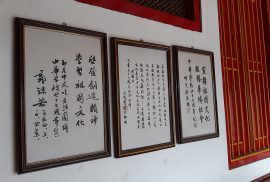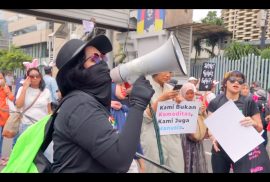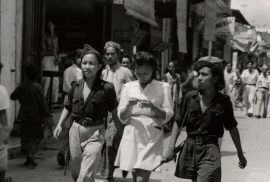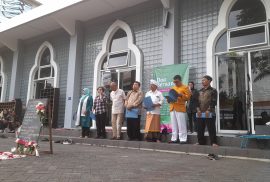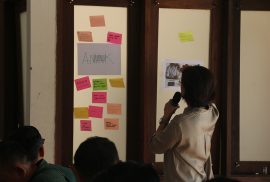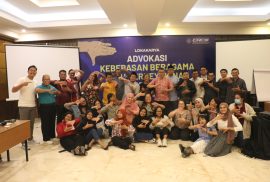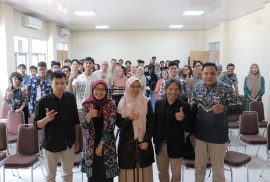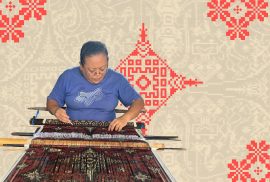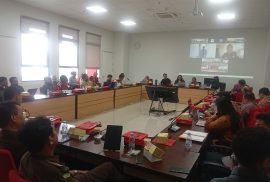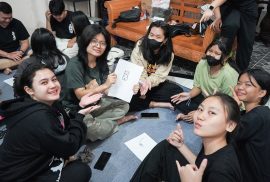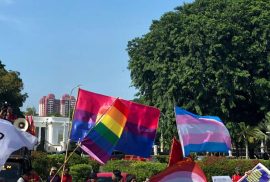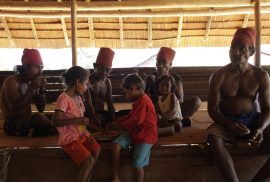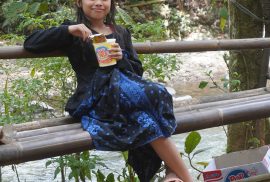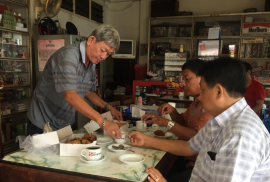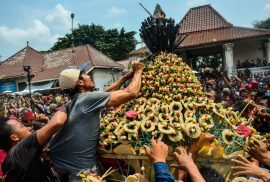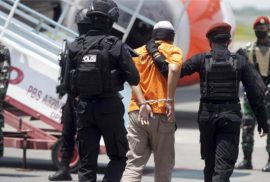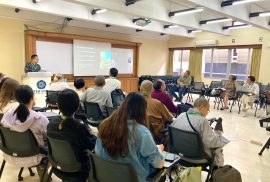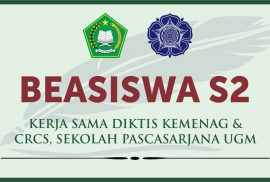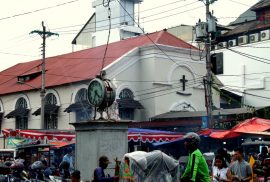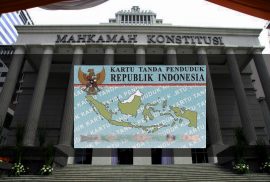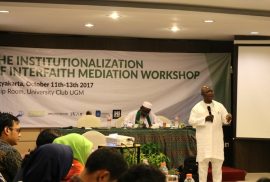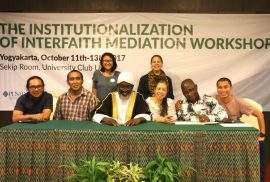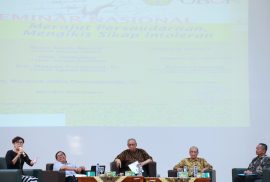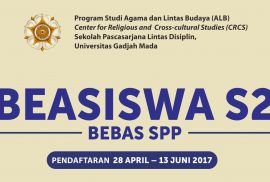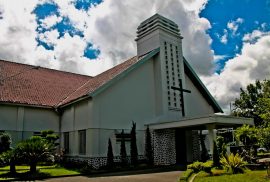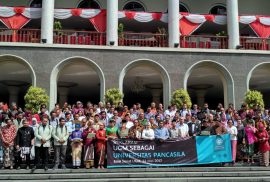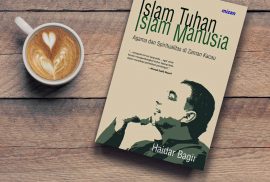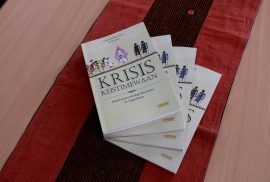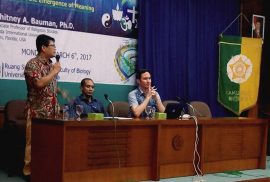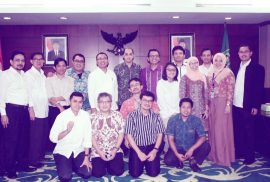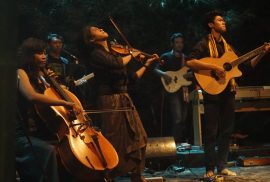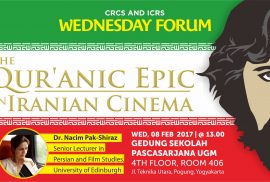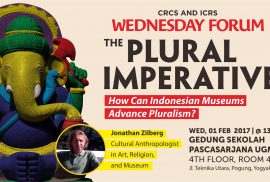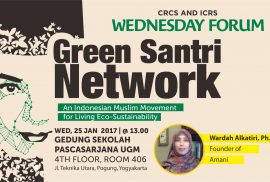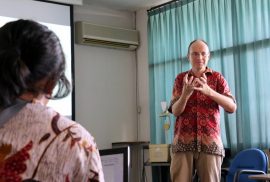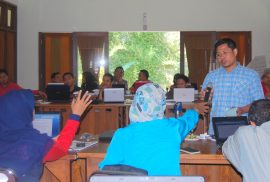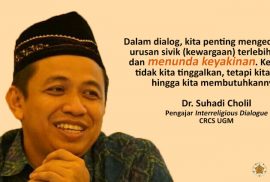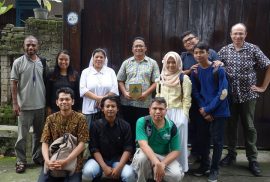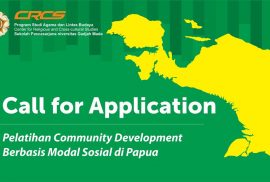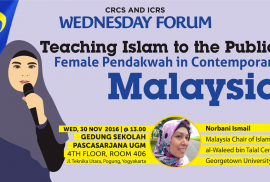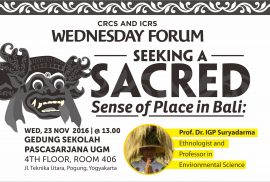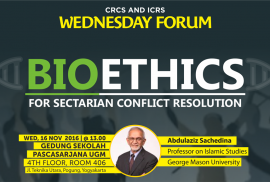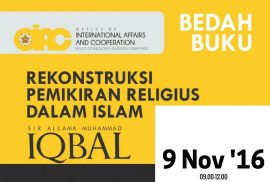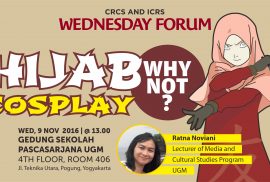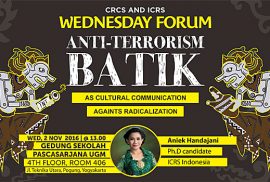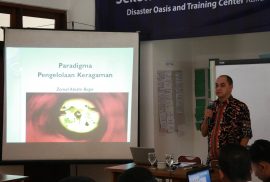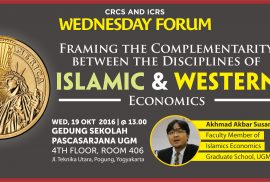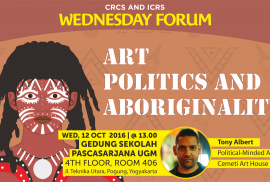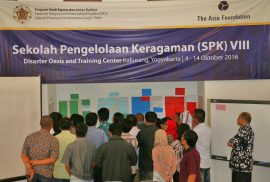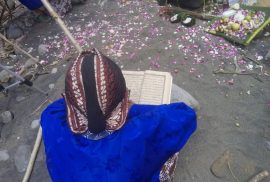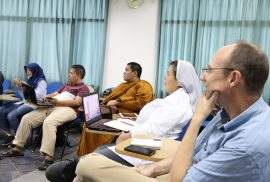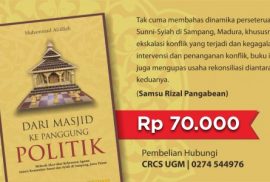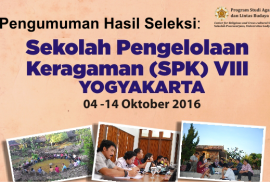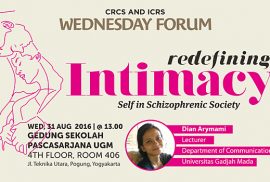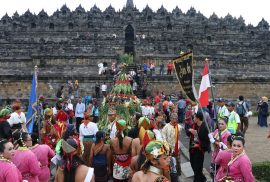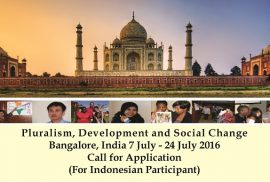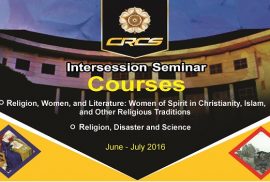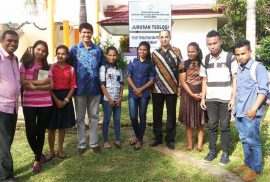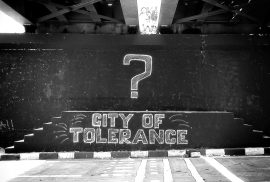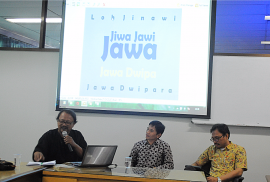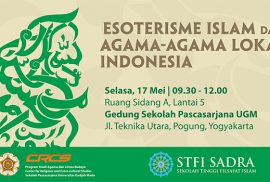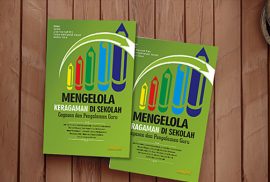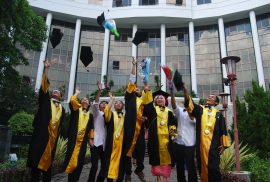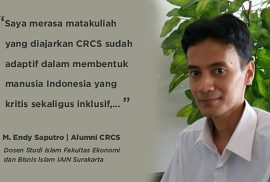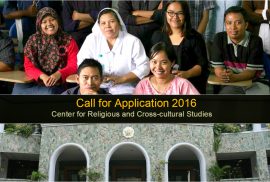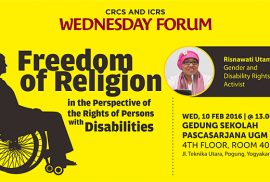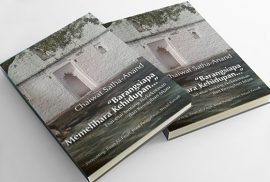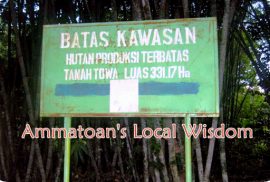Selama berabad-abad budaya dan masyarakat Tionghoa telah hadir, melebur, dan menjadi bagian tak terpisahkan dari sejarah peradaban Nusantara. Jejak-jejak dinamika tersebut tersimpan dalam berbagai arsip seperti koran, surat, dan buku. Upaya penyelamatan arsip berarti membuka kembali ruang bagi narasi kebangsaan yang lebih inklusif.
Berita
Perdebatan tentang sains, agama, dan tradisi merupakan pergulatan yang sangat panjang dalam sejarah peradaban manusia. Upaya merefleksikan dan memosisikan diri menjadi bagian penting dalam memahami makna dan hakikat pengetahuan bagi kehidupan manusia.
Kemunculan kredit pada film bukanlah sebuah akhir, melainkan sebuah ajakan bagi kita, yang ada di seberang layar, untuk menyambung apa yang film itu perjuangkan.
Narasi sejarah sering menghilangkan peran perempuan, kaum trans, dan masyarakat adat. Padahal, mereka berkontribusi besar dalam perjuangan sosial, budaya, dan kemanusiaan.
Industri, korporasi, bahkan lembaga negara berlomba-lomba membingkai diri sebagai bagian dari gerakan hijau. Seolah, dengan menyebut sesuatu yang hijau, seluruh proses di baliknya otomatis menjadi ekologis nan lestari.
Segregasi antara kerja akademik dan aktivisme seringkali digambarkan terpisah oleh garis batas yang saling mengelakkan. Kerja akademik dianggap harus objektif dan netral, sementara aktivisme bersifat subjektif dan politis. Karakteristik yang berlawanan itu membuat anggapan keduanya mesti dipisahkan dalam ruang lingkupnya masing-masing. Anggapan ini coba dikritisi oleh para alumni CRCS UGM berdasar kiprah mereka dalam dunia aktivisme dari berbagai latar belakang.
Kendati berbeda cara, tiap doa dari masing-masing pemuka agama bertujuan sama: pemulihan bangsa Indonesia dari konflik berkepanjangan serta harapan akan kondisi yang lebih baik lagi. Selama prosesi tersebut, massa aksi duduk tenang seraya mengindahkan tiap untaian doa. Agama dengan caranya sendiri tengah mengadvokasi berbagai isu yang terjadi di masyarakat.
Fellowship KBB 2025 kali ini menghadirkan kelas Klinik dan Advokasi KBB sebagai bagian dari luaran yang tidak hanya menghasilkan gagasan tertulis, tetapi juga aksi nyata.
Selama ini KUHP 2023 yang akan efektif berlaku tahun depan ini jarang dibicarakan di akar rumput. Padahal, masyarakat awamlah—terutama dari kelompok rentan keagamaan—yang akan terpengaruh secara signifikan.
Karakter dari KUHP itu adalah membatasi hak. Yang menjadi perhatian ialah bagaimana pembatasan itu tidak melanggar hak warganegara, terutama dalam hal beragama atau berkeyakinan.
Kain tenun bukan sekadar selembar sandangan. Setiap lembarnya mewakili relasi simbolik antara makna dan kesimbangan nilai kehidupan pembuatnya.
Dalam KUHP 2023, bab agama atau kepercayaan mendapat ruang tersendiri melalui pasal 300—305. Penafsiran yang tepat terhadap isi pasal-pasal tersebut menjadi langkah vital agar implementasinya relevan dengan realitas sosial masyarakat dan pemajuan hak asasi manusia.
Kendati bukan negara agama, Indonesia menempatkan agama sebagai salah satu pilar penting dalam kehidupan sosial dan bernegara. Dengan kata lain, keberadaan agama perlu dilindungi oleh negara. Namun, sebelum 2023, KUHP yang dipunyai Indonesia merupakan warisan negara sekuler Belanda sehingga agama tidak mendapatkan tempat dalam undang-undang tersebut. Karenanya, sejak Seminar Hukum Nasional I 1963 ada keinginan kuat untuk memiliki “delik agama” dalam suatu KUHP Nasional.
Betapa pun berbeda pengalaman dan pandangan religius dengan generasi pendahulunya, anak muda Khonghucu tak akan pernah tercerabut dari “tulang” leluhurnya.
Transpuan dan Hak Demokrasi yang Terabaikan
Nita Amriani – 11 November 2024
Apakah seorang transpuan lahir hanya untuk mengecap pedihnya bayang-bayang persekusi dan menjadi pelengkap suara pemilu?
Diskriminasi dan stigma berlapis menyingkirkan kelompok transpuan dari hak-hak dasar sebagai warga negara. Banyak transpuan sulit mengakses pekerjaan dan hidup dalam ancaman persekusi. Di sisi lain, mereka juga tak lagi punya ruang aman di rumah karena keluarga mereka tidak lagi mau menerimanya. Bagi kelompok transpuan, konsep keadilan dalam sila ke-5 Pancasila masih jauh api dari panggang.
Suara Masyarakat Adat di Tengah Bayang-Bayang Demokrasi
Vikry Reinaldo Paais – 06 November 2024
Pembangunan nasional yang diklaim oleh pejabat pemerintahan sebagai sarana untuk meningkatkan kesejahteraan sosial justru merampas, mengkriminalisasi, serta mengeksklusi hak-hak hidup masyarakat adat dan penganut agama leluhur. Hutan dan tanah mereka dirampas oleh negara untuk dijadikan kawasan produksi maupun konservasi. Ketika masyarakat adat berjuang mempertahankan hak atas tanahnya, mereka justru dikriminalisasi oleh aparat negara. Dalam konteks sosio-religius, sebagian besar masyarakat maupun pemimpin agama menstigma masyarakat adat sebagai belum beradab, masih primitif, serta belum beragama sehingga harus dimodernkan dan diagamakan. Problematika ini adalah tantangan serius dalam konteks Indonesia yang mengumandangkan demokrasi sebagai sistem pemerintahan dan prinsip hidup berbangsa dan bernegara. Isu-isu krusial ini menjadi bahasan utama dalam perhelatan International Conference and Consolidation on Indigenous Religion (ICIR) ke-6 pada 22-25 Oktober 2024 di Ambon.
Transformasi Modernitas yang Berlantas di Kanekes
Afkar Aristoteles Mukhaer – 15 Oktober 2024
Modernitas membawa tantangan bagi masyarakat Urang Kanekes. Namun, mereka punya cara tersendiri dalam menghadapinya.
Masyarakat adat Urang Kanekes—atau yang lebih populer dengan nama Baduy—di Banten selalu menarik perhatian para peneliti. Setidaknya ada 95 dokumen karya ilmiah yang memuat kata kunci “Baduy” dan 23 dokumen karya ilmiah dengan kata kunci “Kanekes” di situs Scopus. Ketertarikan ini muncul, di antaranya, karena masyarakat adat Kanekes sangat melestarikan ajaran tradisi leluhur sampai hari ini kendati wilayah adat mereka tidak jauh dari Jakarta, kota metropolitan serba modern.
Kedai kopi yang dianggap sekadar tempat transaksi ekonomi, ternyata menjadi ruang penting terciptanya sebuah dinamika relasi lintas etnis dan agama yang sarat akan luka masa lalu.
Ambiguitas dan Toleransi dalam Tradisi Masyarakat Muslim
Afkar Aristoteles Mukhaer – 25 September 2024
Sepanjang sejarah peradaban Islam, perdebatan tafsir selalu hadir dengan saling menghargai perbedaan pendapat.
Realitas pemahaman dan praktik ajaran Islam sebagai aturan universal masih ambigu. Meski tuntunannya termaktub dalam pegangan dasar—Al-Qur’an dan hadis—interpretasinya selalu terbuka untuk dibahas dari perspektif dan ideologi tertentu. Cendekiawan dan ulama kerap berbeda paham atas interpretasi ajaran Islam sehingga mendorong terbentuknya ragam tafsir dan tarekat dalam Islam.
Dari Nurani Jadi Aksi
Afkar Aristoteles Mukhaer – 15 September 2024
Sebagian umat beragama menyadari gejala alam yang tidak menentu sebagai fenomena perubahan iklim. Lantas, sejauh mana pengetahuan agama mendorong umatnya melakukan kegiatan yang mendukung lingkungan?
“Agama memiliki efek ganda dalam membentuk perilaku ramah lingkungan,” jelas Iin Halimatusa’diyah, Direktur Riset Pusat Pengkajian Islam dan Masyarakat (PPIM) UIN Jakarta, lewat presentasinya bertajuk “From Belief to Action: Religious Values and Pro-Environmental Behavior in Indonesia” dalam Wednesday Forum (4/9).
berdasarkan data dari Institute for Policy Analysis of Conflict (IPAC), Bima merupakan daerah dengan rekam jejak aktivitas terorisme yang tinggi. Lantas, karakteristik keagamaan seperti apa yang tengah berkembang di antara masyarakat Bima? Sejauh mana karakteristik keagamaan itu mempengaruhi perkembangan terorisme di Bima?
Meneroka Diplomasi Buddhis dalam Sejarah Asia Modern
Yulianti – 20 Agustus 2024
Dalam sejarah kolonialisme di Asia modern, jejaring dan aliansi tidak hanya terjadi melalui jaringan negara kolonial, tetapi juga aliansi kelompok masyarakat yang ada di dalamnya. Salah satu bentuk aliansi yang berperan penting dalam geopolitik tersebut ialah diplomasi buddhis.
Dinamika tersebut menjadi bahasan utama dalam panel “Friends in Dharma: Buddhist Diplomacy and Transregional Connection in Modern Asia”. Panel ini merupakan bagian dari kluster tema Inter Area/Border Crossing pada “AAS in ASIA Conference”di Universitas Gadjah Mada, Yogyakarta, Indonesia pada 9–11 Juli 2024. Mengambil latar belakang sejarah Asia modern, panel Buddhist Diplomacy ini memfokuskan kajian pada kiprah komunitas agama yang berasal dari kalangan yang berbeda-beda dalam membentuk jaringan, aliansi, dan kerja sama di Asia pada pertengahan abad ke-20 sampai ke-21. Jaringan dan hubungan-hubungan kelompok inilah yang kemudian dimaknai sebagai buddhist diplomacy (diplomasi buddhis) yang melibatkan individu, kelompok, dan negara-negara buddhis di Asia. Keberadaan diplomasi buddhis ini mempengaruhi hubungan transregional dan pertukaran budaya dari abad ke-20 hingga abad ke-21 di Asia.
Memulihkan Literasi Agama-Agama Tionghoa
Rezza Maulana – 12 Januari 2024
By breadth of reading and the ties of courtesy, a gentleman is kept, too, from false paths (Confucius)
Eksistensi dan kiprah masyarakat keturunan Tionghoa dalam derap sejarah Nusantara seakan tenggelam oleh stigma negatif yang menyelimutinya. Padahal, dinamika pemikiran dan pergulatan mereka ikut menyumbang batu bata dalam bangunan negeri yang bernama Indonesia ini. Salah satu penyebabnya ialah minimnya kajian yang bersumber dari sudut pandang masyarakat keturunan Tionghoa itu sendiri. Kebijakan asimilasi, represi, dan aksi amuk massa yang kerap menyasar komunitas keturunan Tionghoa ikut menyumbang hilangnya berbagai dokumen penting dan sumber sejarah. Untungnya, di samping koleksi pribadi atau perorangan, beberapa arsip sejarah yang tersimpan di klenteng atau rumah ibadah masih terselamatkan.
Beasiswa S2 Kerja Sama Diktis Kemenag dan CRCS UGM. Waktu pendaftaran: 3 Mei - 4 Juli 2019.
Esai foto dari ibadah dan perayaan Natal di GKJ, GPIB, GKI, dan HKBP Yogyakarta, 24 Desember 2018.
Mahkamah Konstitusi: Pengosongan Kolom Agama bagi Penghayat Kepercayaan Bertentangan dengan UUD 1945
MK mengabulkan permohonan uji materi terkait aturan pengosongan kolom agama bagi penghayat kepercayaan di KK dan KTP.
A report of the first day of the workshop on the institutionalization of interfaith mediation with Imam Ashafa and Pastor Wuye at UGM.
Liputan dari hari ketiga bersama Jacky Manuputty dalam rangkaian kuliah umum "Imam & Pastor" dan lokakarya Pelembagaan Mediasi Antariman.
A. S. Sudjatna | CRCS | Liputan

Hadirnya kelompok-kelompok radikal-intoleran yang kerap melakukan kekerasan atas nama agama adalah suatu tantangan iman. Dalam menghadapi kelompok ini, umat beriman semestinya tidak membalasnya dengan kekerasan yang serupa, tetapi harus dengan cara-cara yang selayaknya dilakukan orang beriman, yakni cara yang penuh kasih dan kelembutan.
Itulah di antara yang diungkapkan Kardinal Julius Darmaatmadja, SJ, dalam seminar nasional bertajuk Merajut Persaudaraan, Mengikis Sikap Intoleran yang dihelat di Fakultas Teologi Universitas Sanata Dharma pada 16 Mei 2017. “Yang paling membuat tantangan iman semakin besar di dalam diri kita adalah kalau yang menjadi marah besar itu kita sendiri. Itu tantangan iman untuk diri kita sendiri,” ungkapnya
Oleh sebab itu, menurut Romo Kardinal, gejala arus balik yang tengah terjadi di masyarakat akhir-akhir ini atas perilaku kelompok radikal itu hendaklah pula diwaspadai agar tidak melenceng dari batas-batas yang telah ditentukan negara dan diajarkan agama. Perlawanan atas perilaku intoleran dan kekerasan dari kelompok radikal mesti tetap mengedepankan Pancasila, keutuhan NKRI, dan menjunjung tinggi kebinekaan.
Dalam hal ini, Romo Kardinal menyatakan apresiasi terhadap Muhammadiyah dan Nahdlatul Ulama yang konsisten menjaga persaudaraan di antara umat beragama dan menegaskan bahwa Islam harus menjadi rahmat bagi semua, rahmat bagi seluruh ciptaan Tuhan. “Saya tersentuh saat pimpinan Muhammadiyah, Haidar Nashir, menyampaikan khotbah pada perayaan Idul Adha yang berjudul Menyembelih Egoisme, Merayakan Solidaritas,” ujar Romo Kardinal. Ia kemudian menyitir beberapa bagian dari khotbah Haidar Nashir tersebut yang dimuat Kompas, 11 September 2016. Menurut beliau, sikap altruis yang disebut-sebut oleh Haidar Nashir di dalam khotbahnya itu akan melahirkan sikap kasih kepada sesama tanpa sekat agama, suku, ras, dan golongan.
Terhadap umat Katolik dan Protestan, Kardinal Darmaatmadja menyerukan untuk tetap mengutamakan kasih atas sesama seperti mengasihi diri sendiri. Sebab, mengutip Yohanes, kasih kepada Tuhan harus dibuktikan lewat mengasihi sesama. “Karena barangsiapa yang tidak mengasihi saudaranya yang dilihatnya, maka tidak mungkin mengasihi Allah yang tak dilihatnya,” ujarnya menegaskan.
Menutup ceramahnya, Romo Kardinal menegaskan kembali pernyataanya. “Kita tegakkan negara kita berdasarkan Pancasila; kita perkokoh NKRI dan persaudaraan nasional. Namun, sikap kita yang inklusif tetap perlu dipertahankan selalu, terhadap kelompok yang radikal pun. Hukum balas-membalas tidak boleh dilakukan oleh orang beriman. Sebaliknya, kita tetap memegang teguh sikap mengasihi dan mengampuni. Kita ampuni orangnya meski kita menolak perbuatannya.”
Menanggapi Romo Kardinal, Buya Syafi’i Ma’arif sebagai pembicara selanjutnya mengatakan bahwa apa yang dikatakan oleh Romo Kardinal itu, terutama dalam soal kasih, persis seperti ajaran Islam di dalam mengasihi sesama. “Apa yang disampaikan Kardinal itu seperti suara seorang muslim yang belum terkontaminasi.”
Buya Syafi’i menegaskan bahwa Islam sebagai rahmatan lil alamin itu universal bagi seluruh umat manusia. Kemunculan kelompok Islam radikal yang kerap melakukan kekerasan seperti itu disebabkan mereka terjebak dalam lingkaran—yang disebut Buya Syafi’i sebagai—“misguided arabism” yang sudah berlangsung berabad-abad dan membuat peradaban umat Islam—khususnya di wilayah Timur Tengah saat ini—porak poranda.
“Yang berlaku di dunia Arab sekarang ini adalah peradaban Arab yang sudah bangkrut,” tegas Buya Syafi’i. Celakanya, peradaban yang bangkrut ini dicoba untuk dibawa ke Indonesia oleh kelompok-kelompok tertentu. Tak heran jika isu sektarian yang menjadi pemicu perpecahan umat Islam di dunia Arab sana juga mulai muncul dan berkembang di Indonesia saat ini.
Buya Syafi’i menyebutkan bahwa perilaku kekerasan kelompok radikal itu muncul dikarenakan mereka mengadopsi teologi maut. “Teologi maut ini keluar dari perasaan keputusasaan. Hopeless. Tidak berdaya. Kalah. Kalau sudah kalah, ujungnya kalap,” ucapnya. Akibatnya, tak sedikit umat Islam yang akhirnya lebih memilih pindah ke negara-negara mayoritas nonmuslim, sebab di sana dirasa lebih aman dan nyaman untuk mengekspresikan diri. Sedangkan di kampung halamannya, mereka diberangus.
Pembicara ketiga, Widiyono, tokoh dari umat Buddha dan juga alumnus CRCS, menegaskan bahwa agar tidak terjebak dalam radikalisme, setiap kita mesti menyadari akan niscayanya sebuah keragaman. Kesadaran akan saling keterikatan di dalam keragaman dan bukannya saling bermusuhan sangat dibutuhkan. Di dalam ajaran Buddha, menurutnya, kesadaran akan keragaman dan saling keterhubungan di antara segala hal disebut dengan paticcasamuppada. Hilangnya kesadaran akan hal ini akan melahirkan sikap permusuhan dan tindak kekerasan yang nyata, seperti yang dapat disaksikan pada perilaku sekelompok penganut agama Budha di Sri Lanka atau Myanmar. Menurutnya, tanpa keragaman tak akan ada kehidupan.
Pembicara keempat, Romo Mateus Purwatma dari Katolik, menegaskan bahwa agar tidak terjebak dalam radikalisme ini, seorang Katolik harus menjadi misioner, menjadi seorang saksi, yakni mengamalkan ajaran Yesus di tengah masyarakat beriman secara cerdas, mengerti apa yang diimani dan dapat membaca Alkitab secara benar. Menurutnya, kemampuan membaca Alkitab secara benar ini sangatlah penting, agar saat berjumpa dengan ayat-ayat yang mengekslusikan yang lain tidak terjebak dalam pembacaan yang kaku, sehingga tak salah mengerti. Selain itu, Romo Mateus melanjutkan, seorang Katolik juga mesti menyadari bahwa ia beriman dalam konteks masyarakat majemuk, sehingga saat ia berjumpa dengan orang dari agama lain, ia tahu bagaimana cara menempatkan keimanannya di sana.
*A. S. Sudjatna adalah mahasiswa CRCS angkatan 2015.
Beasiswa bebas SPP di CRCS untuk alumni perguruan tinggi non-Islam.
“Gereja-gereja memahami perdamaian secara sempit, sekadar sebagai negative peace. Perdamaian dianggap tercapai apabila tidak ada konflik.”
Pada hari Senin, 22 Mei 2017, Universitas Gadjah Mada (UGM) mengumandangkan deklarasi meneguhkan kembali Pancasila. Termasuk dalam rangkaian acara adalah sarasehan dan FGD bersama akademisi dan budayawan.
A.S. Sudjatna | CRCS | Liputan

“Tidak banyak orang yang berpikir bahwa ada ‘Islam Tuhan’ dan ada ‘Islam manusia’. Kebanyakan orang selama ini berpikir bahwa Islam itu, ya, hanya Islamnya Tuhan.” Demikian ungkap Dr. Haidar Bagir di awal peluncuran buku terbarunya yang berjudul Islam Tuhan Islam Manusia: Agama dan Spiritualitas di Zaman Kacau (Mizan, 2017) pada Jumat, 7 April 2017. Acara bedah buku ini diadakan oleh Laboratorium Studi al-Quran dan Hadis (LSQH) di Convention Hall UIN Sunan Kalijaga.
Membuka diskusi, Dr. Haidar Bagir menjelaskan dua dari sekian alasan yang membuatnya memilih judul bagi karya yang menjadi penanda ulang tahunnya yang keenampuluh itu. Pertama, menurutnya, Islam yang kini dipahami oleh seluruh muslim adalah “Islamnya manusia”, bukan Islamnya Tuhan. Artinya, apa yang dipahami oleh setiap muslim saat ini sebagai Islam atau ajaran Islam adalah keislaman yang sudah melalui proses tertentu, yakni melewati saringan otak dan hati masing-masing individu, yang tentu saja tidak kosong dari beragam faktor, termasuk nafsu di dalamnya. Karenanya, ia berbeda dengan Islam yang seutuhnya dikehendaki Tuhan. Dalam hal ini, manusia hanyalah berupaya untuk memahami Islam untuk sedapat mungkin mendekati yang dimaui Tuhan.
Dengan memahami hal ini, menurut Dr. Haidar, siapapun akan sadar bahwa setiap muslim, sepintar dan sealim apa pun, tetap memiliki peluang kesalahan sekecil apa pun di dalam pehamanan keislamannya. Tidak ada seorang pun—selain Rasulullah Saw.—dari barisan umat Islam yang pemahaman keislamannya itu mutlak betul. Dalam pandangan Dr. Haidar, jika ada orang yang menganggap bahwa hanya pemahaman keislamannyalah yang mutlak benar sedangkan yang lain mutlak salah, dia telah menempatkan dirinya sebagai Tuhan atau wakil Rasulullah.
Seharusnya, lanjut Dr. Haidar, kita belajar kepada para imam mazhab seperti Imam Syafi’i atau Imam Malik yang secara sadar mengatakan bahwa pendapatnya adalah pendapat yang benar namun tetap berpeluang salah; dan pendapat yang lain salah namun tetap berpeluang benar. Dengan begitu, siapapun tak akan berupaya memonopoli kebenaran. “Sekarang enggak; kalau melawan pendapat saya, berarti melawan Tuhan!” ujar Dr. Haidar mengungkapkan kesedihannya atas sekelompok umat Islam yang kerap menuduh sesat muslim lain dari luar golongannya.
Dr. Haidar juga menjelaskan bahwa ada kemungkinan untuk muncul lebih dari satu tafsir yang sama-sama benar dalam memahami kitab suci. Ini karena adanya sudut pandang atau pendekatan yang berbeda dalam membacanya. Menjelaskan ini, Dr. Haidar menggunakan analogi piramida: “Kalau kita lihat sejajar mata, maka tampak segitiga; kalau lihat dasarnya, maka segi empat; kalau dari atas lurus, maka jadilah seperti titik.” Perbedaan pandangan ini bukanlah sebentuk kekeliruan, namun parsialitas. Menguatkan pandangannya, Dr. Haidar menyitir ucapan Rumi bahwa kebenaran itu laiknya cermin yang jatuh ke bumi dan pecah berkeping-keping, lalu setiap orang mengambil satu kepingannya.
Alasan kedua memilih judul tersebut adalah bahwa Islam, menurut Dr. Haidar, diturunkan untuk manusia, bukan untuk Tuhan. Agama adalah seperangkat ajaran yang diturunkan demi kebaikan manusia. Di antara cara untuk itu, Dr. Haidar menekankan, adalah dengan menginternalisasi sifat Tuhan yang secara khusus tercantum dalam ucapan basmalah: ar-Rahman dan ar-Rahim. Orang Islam yang baik adalah orang yang menghabiskan hidupnya menebar kasih sayang ke semua manusia, menjadi agen rahman-rahim. Dan adalah keanehan, jika ada orang yang mendaku membela Tuhan namun begitu bernafsu membinasakan manusia, seolah-olah semakin banyak membunuh semakin ia mendapat rida Tuhan.
Di tengah-tengah diskusi, Dr. Haidar mengutarakan beberapa hal terkait isi buku setebal 288 halaman itu. Di antara yang sempat ditekankannya ialah tentang sejarah perang Nabi. Karena ada banyak narasi peperangan tertulis dalam literatur sirah Nabi, beberapa orang mengira bahwa perang adalah bagian esensial dari agama Islam. Padahal, jika dijumlah hari-hari yang digunakan Nabi untuk berperang, paling hanya dua tahun lebih sedikit saja dari total 23 tahun kerasulan beliau. “Bahkan,” lanjut Dr. Haidar, “ada penelitian yang minimalis, yang tidak memasukkan sariyyah, sehingga jika dijumlah perangnya Nabi hanya delapan puluh hari saja.” (Catatan redaksi: Dalam terminologi literatur sirah Nabi, sariyyah adalah ekspedisi pasukan tanpa dipimpin dan tak didampingi Nabi; ini yang membedakannya dari ghazwah yang dipimpin langsung oleh Nabi.)
Jika diajarkan dengan benar, Islam sebetulnya adalah agama yang menekankan perdamaian dan cinta kasih, bukan agama peperangan dan kebencian. Menegaskan hal ini, Dr. Haidar mengutip Imam Ja’far Shadiq yang secara retoris pernah berucap, “Hal al-din illa al-hubb?” (Apalagi agama itu kalau bukan cinta?) Sejalan dengan ini ialah sabda Nabi, “Cinta adalah asas(agama)ku” (al-hubb asasi). Kalau ada perintah mempersiapkan diri untuk berperang, seperti ditemukan dalam QS al-Anfal [8]:60, menurut Dr. Haidar, itu adalah tindakan preventif menghadapi serangan kelompok lain, dan bukan ditujukan untuk tindakan ofensif.
Hal lain yang juga sempat ditekankan Dr. Haidar dalam diskusi buku ini adalah tentang istilah yang populer dipakai untuk menyebut non-muslim, yaitu “kafir”. Dr. Haidar lugas menuturkan bahwa tidak seluruh non-muslim dapat dikategorikan kafir. Non-muslim yang dapat dikategorikan kafir hanyalah non-muslim yang telah menerima dakwah Islam dan telah sangat jelas memahaminya sebagai suatu kebenaran tetapi dengan sadar memilih untuk mengingkarinya karena vested interest atau alasan lain. Hal ini berdasar pada argumen-argumen dari nash al-Quran, hadis, dan pendapat para ulama lampau yang lebih detail dijelaskan di buku itu. “Untuk menyatakan non-muslim sebagai kafir itu harus ada qiyamul-hujjah,” ungkap Dr. Haidar, “Kalau Islam yang sampai kepada mereka tidak cukup meyakinkan mereka, itu berarti hujjah belum tegak, dan karena itu bukan kafir.” Dengan ini, ia mewanti-wanti agar kita tidak mudah mengobral tuduhan sesat dan kafir kepada orang yang berbeda mazhab atau beda keyakinan.
Menutup ceramahnya, Dr. Haidar menawarkan bahwa Islam paling baik diajarkan dengan memberikan penekanan pada aspek spiritualitas. Baginya, tasawuflah yang mewadahi aspek cinta dalam Islam. “Banyak umat Islam lupa kalau Islam bukan hanya terdiri dari rukun Islam dan rukun iman. Ada rukun yang merupakan puncak keimanan dan keislaman, yaitu rukun ihsan, yang ada dalam tasawuf. Ihsan inilah yang melahirkan cinta. Hilangnya ihsan membuat keislaman seseorang menjadi kering dan penuh kebencian,” pungkas Dr. Haidar.
Penulis, A.S. Sudjatna, adalah mahasiswa CRCS angkatan 2015.
A.S. Sudjatna | CRCS | Berita

“Terpujilah Engkau, Tuhanku, karena Saudari kami, Ibu Pertiwi, yang menyuapi dan mengasuh kami, dan menumbuhkan aneka ragam buah-buahan, beserta bunga warna-warni dan rumput-rumputan. Saudari ini sekarang menjerit karena kerusakan yang telah kita timpakan kepadanya, karena tanpa tanggung jawab kita menggunakan dan menyalahgunakan kekayaan yang telah diletakkan Allah di dalamnya.”
Begitulah Paus Fransiskus memulai bait-bait awal ensiklik keduanya. Didahului dengan ucapan “Laudato Si’, mi’ Signore,” “Terpujilah Engkau, Tuhanku,” yang ia kutip dari ucapan Santo Fransiskus dari Asisi, pendahulunya ratusan tahun lalu, Paus Fransiskus memulai penegasan sikapnya yang lahir dari refleksi keimanan atas realitas dunia yang hadir saat ini. Dua ratus empat puluh enam paragraf dari keseluruhan ensiklik ini berbicara soal bagaimana seharusnya manusia beragama dan beriman bersikap atas alam dan lingkungannya.
Ensiklik Laudato Si ini sejatinya adalah seruan profetik pemimpin tertinggi Gereja Katolik yang disandarkan pada ajaran keimanan Katolik. Sebuah ensiklik tak hanya merespons realitas sosial, namun juga mengungkapkan basis teologisnya, sehingga aksi-aksi implementatif terhadap ensiklik bukan hanya merupakan gerakan sosial melainkan juga gerakan keagamaan.
Membahas relevansi ensiklik ini dalam konteks Indonesia, Muda-Mudi Katolik (MUDIKA) Paroki Santo Antonius Kotabaru Yogyakarta mengadakan diskusi dengan judul Memandang Petani Kendeng dengan Ensiklik Laudato Si pada Selasa, 4 april 2017, di GKS Widyamandala. Diskusi ini dilatarbelakangi antara lain oleh keprihatinan akan kurangnya perhatian kawan-kawan muda Katolik atas perlawanan para petani terhadap pendirian pabrik semen di pegunungan Kendeng, padahal Gereja Katolik memiliki Ensiklik Laudato Si yang dapat menjadi basis gerakan untuk merespons persoalan semacam itu.
Dalam acara tersebut, pemantik diskusi Lilik Krismantoro memulai pembahasan dengan latar sejarah ensiklik. Ada banyak ensiklik yang sudah dikeluarkan gereja. Salah satu ensiklik yang cukup dikenal dan berpengaruh adalah Ensiklik Rerum Novarum yang dikeluarkan oleh Paus Leo XIII. Ensiklik ini merespons perkembangan komunisme di Eropa pada abad ke-18 dan memicu terbentuknya gerakan buruh Katolik. Ensiklik ini membahas dukungan gereja atas hak-hak buruh namun juga mengukuhkan hak milik pribadi dan menolak sosialisme.
Ensiklik Laudato Si merupakan salah satu dari dokumen-dokumen serupa yang lahir kemudian. Ensiklik ini dapat dibaca sebagai lanjutan dari ensiklik serupa sebelumnya, Populorum Progressio, yang dikeluarkan oleh Paus Paulus VI pada 26 Maret 1967 yang hadir sebagai refleksi iman Katolik tentang pembangunan yang berpusat pada manusia. Di luar ensiklik ini, ada praksis-praksis teologis lain yang lahir dari Gereja Katolik, seperti teoologi pembebasan yang menemukan pengejawantahannya dalam perjuangan Uskup Agung San Salvador Mgr Oscar Arnulfo Romero—yang mengalami assasinasi dan belakangan telah ditahbiskan sebagai martir oleh Paus Fransiskus pada 2015.
Terkait persoalan lingkungan, menurut Lilik, Gereja Katolik di Indonesia sebenarnya sudah mulai terlibat aktif sejak lama. Ini tampak misalnya dari keterlibatan Gereja Ganjuran di Yogyakarta sebagai tuan rumah seminar pertanian se-Asia pada tahun 1990 yang diadakan oleh Federasi Konferensi-Konferensi Waligereja Asia (FABC). Dengan bekal beragam gerakan gereja dan ensiklik sebagai pijakan teologisnya, menghubungkan persoalan Kendeng dengan Katolik bukan hal yang sulit. Gereja dan umat Katolik memiliki modal dan alasan yang cukup untuk terlibat aktif dalam persoalan Kendeng.
Menegaskan hal ini, salah seorang peserta diskusi yang juga aktivis pertanian organik, Beni Pudyastanto, mengatakan bahwa secara khusus Ensiklik Laudato Si membahas persoalan air di bab pertama bagian kedua. Dikatakan dalam ensiklik itu bahwa air dapat menjadi sumber konflik. Dalam kasus Kendeng, isu seputar Cekungan Air Tanah (CAT) Watuputih Kendeng adalah salah satu persoalan kunci yang mengemuka dalam polemik kehadiran pabrik semen di Kendeng. Air di CAT akan hilang atau menyusut sebab aktivitas penambangan, yang pada gilirannya merusak suplai air untuk wilayah Rembang, Kudus, Pati, Blora dan sekitarnya.
Beni juga mengingatkan peserta diskusi bahwa Laudato Si mengatakan bahwa keberlanjutan (sustainability) suplai dan ketersediaan air adalah anugerah bagi semua makhluk, dan di level ini manusia dengan makhluk lain berposisi sejarah di hadapan Tuhan. Akal budi yang dimiliki manusia tidak serta merta memberinya hak mutlak untuk mengeksploitasi alam.
Beni juga menegaskan bahwa membicarakan Kendeng dari kaca mata Laudato Si bukan semata-mata berbicara perihal lingkungan, namun juga soal adanya kelompok masyarakat yang butuh dibela di hadapan arogansi kekuasan. Dalam hal ini, ajaran Katolik tentang menolong sesama dan kaum tertindas seharusnya dapat menjadi landasan aksi. Maka, lanjut Beni, Ensiklik Laudato Si ini harus digaungkan sampai ke paroki-paroki hingga akar rumput. Untuk memulai semua itu, menurut Beni, hal pertama harus dilakukan adalah sebagaimana dibahas pada bab enam bagian tiga Ensiklik Laudato Si: pertaubatan ekologis. Setiap penganut Katolik harus bertaubat dari dosa-dosa ekologisnya.
Terkait kelompok miskin tertindas, Lilik menambahkan bahwa saat terjadi ketidakadilan ekonomi dan ekologi, korban terbanyak dan paling utama itu sama: masyarakat miskin. Merekalah kelompok yang paling rentan terdampak bencana akibat rusaknya lingkungan. Lilik mengingatkan peserta bahwa kini telah hadir jenis pengungsi baru, pengungsi lingkungan, yakni pengungsi yang lahir dari kerusakan lingkungan. Menyitir Laudato Si, Lilik mengingatkan bahwa konsep hutang semestinya tak hanya dipahami dalam kerangka finansial, tetapi juga ekologis, yakni hutang negara-negara maju karena mereka mengakses sumber daya alam dan mengorbankan masyarakat miskin dunia ketiga.
Menutup diskusi, Lilik mengajak peserta untuk merenungi iman masing-masing dengan pertanyaan retorisnya: “Harus disadari bahwa hati yang kaugunakan untuk mengasihi itu adalah hati yang sama dengan yang kaugunakan untuk merusak lingkungan. Itu bukan hati yang terpisah. Jadi, bagaimana kita bisa mengasihi jika pada saat yang sama kita merusak alam?!”
Penulis, A.S. Sudjatna, adalah mahasiswa CRCS angkatan 2015.

Yogyakarta telah lama menjadi rumah yang aman bagi berbagai tradisi, keyakinan, dan paham pemikiran yang beragam. Tetapi Daerah Istimewa ini belakangan disorot karena banyaknya aksi vigilantisme yang dilakukan sejumlah kelompok massa baik yang berlatar belakang agama atau politik. Aksi-aksi vigilantisme yang menyasar kelompok-kelompok sosial dan keagamaan minoritas menimbulkan pertanyaan apakah Yogyakarta, yang dikenal sebagai kota pendidikan dan pusat kebudayaan Jawa yang menekankan pada harmoni sosial, sudah berubah menjadi daerah yang intoleran? Laporan ini menunjukkan bahwa vigilantisme terhadap minoritas tidak cukup secara sederhana dipahami sebagai ekspresi konservatisme keagamaan dan intoleransi para pelaku terhadap minoritas, tetapi juga merupakan bagian dari proses perubahan sosial dan struktural yang diantaranya dipengaruhi oleh dinamika seputar status keistimewaan Yogyakarta. Tidak bisa dipungkiri, sektarianisme yang menguat belakangan ikut berpengaruh, tetapi seringkali kekerasan terhadap minoritas lebih tampak sebagai alat mobilisasi kelompok-kelompok kepentingan tertentu untuk mempertahankan basis sosial-politik yang menentukan kendali mereka atas ruang dan sumber daya.
_________________________
Judul: Krisis Keistimewaan: Kekerasan terhadap Minoritas di Yogyakarta
Penulis: Mohammad Iqbal Ahnaf & Hairus Salim
Penerbit: CRCS UGM
ISBN: 978-602-72686-7-8
Tebal: 134 halaman; 15×23 cm
Cetakan Pertama: April 2017
Harga: Rp60.000,00
__________________________
Narahubung untuk mendapatkan buku ini:
Divisi Marketing CRCS UGM
Gedung Lengkung Lantai 3
Sekolah Pascasarjana Lintas Disiplin Universitas Gadjah Mada
Jl. Teknika Utara, Pogung, Yogyakarta, Indonesia 55281
Telephone/Fax: 0274-544976
Atau melalui WA: 082141724150 (Bandri)
Lihat juga buku-buku publikasi CRCS yang lain di sini.
Anang G Alfian | CRCS | News

Universitas Gadjah Mada’s Faculty of Biology invited Whitney Bauman to present his on-going project at the Biology Hall on Monday, March 6th, 2017. Students and lecturers from various faculties came to hear his lecture. His specialization on the discourse of religion, science, and nature reflects his capacity as an associate professor at the Department of Religious Studies, Florida International University, as well as author of works including Theology, Creation, and Environmental Ethics (Routledge 2009) and Religion and Ecology: Developing a Planetary Ethics (2014). A longtime friend of CRCS who has taught intersession courses more than once, he is currently working to finish his third, single-authored book with a tentative title Truth, Beauty and Goodness: Ernst Haeckel and Religious Naturalism.
In his lecture, introduced by paleontology lecturer Donan Satria Yudha as the moderator, Bauman engaged religion and science in a contemporary discussion to look for a new way of understanding each through an evolutionary perspective. This perspective of religion-science relationship was inspired by the contemporary phenomenon in which religion has gained more spaces within science.
The emphasis Bauman made in the beginning of the lecture pointed out the direction of his topic of presentation. He started how historically the notion of religion has been discussed by different perspectives from dualism and reductionism to emergence theory. Along with the continuum of religion-science relationship, he challenged to look at the relation in a new way by focusing on the German scientist Ernst Haeckel (1834-1919) who formulated a new way of making sense out of the world through his studies of ecology and evolution. Bauman clearly stated his stance: “to place Haeckel’s Monism in continuity with this tradition of meaning-making.” He also emphasized that everything has undergone changes and the way we understand the relation between religion and science has always been a “relationship in constant flux.” He challenged the assumption of the previous models on religion-science relationship that views Religion and Science as two different traditions. “I argue that Religion and Science are always together, influencing one another,” Bauman continued, “there is no clear separation.”
As Bauman prefers to define “religion” through its meaning-making function, he observed that the way religion attains knowledge is also inseparable from the natural evolution perspective. Further, he explained that the relation involves not only human and nature as a traditional dichotomy but more as an interconnectedness of everything. This view triggered questions from the audience.
One member of the audience asked a question on a human special status over the rest of nature which challenged the way certain traditions or religions view the status of humans in their scriptures. “I am not sure if humans have a special status in nature,” Bauman answered, “In fact, not only humans have culture and language; many other creatures might have them too.” Because knowledge is always in process and moves together with history and experiences, he argued that it is normal for many traditions to have different understandings of nature and the Truth.
Another question posed was about whether the first human walking on earth was the one as narrated in the scripture. Baumann referred to “Adam” as mentioned in the Genesis as its literal meaning, i.e. a creature on the earth which did not refer to any specific gender. In addition, Donan Satria Yudha said that some Muslim scientists say that Homo sapiens may constitute the first human as mentioned in the scripture and it refers to the quality of being human in the evolution, and not to a specific figure.
The writer, Anang G Alfian, is CRCS student of the 2016 batch
Subandri Simbolon | CRCS | Berita

Agar tak salah arah, kebijakan seharusnya berdasar pada riset. Kesenjangan antara kebijakan dengan pengetahuan acapkali berujung pada kebijakan yang tak menyelesaikan masalah. Termasuk di sini kebijakan yang berkenaan dengan umat beragama.
Untuk menjembatani pemerintah dengan akademisi, pada 14 Februari 2017 Balitbang Kementerian Agama bekerja sama dengan Pusat Studi Agama dan Demokrasi (PUSAD) Paramadina mengadakan diskusi dengan topik mengenai definisi agama dan penodaan agama sebagai rangkaian dari serial diskusi “Analisis Kebijakan: Riset dan Kebijakan Terkait Kehidupan Beragama di Indonesia”. Serial diskusi ini direncanakan akan menghasilkan buku terkait tema-tema seperti intoleransi, konflik agama, kebebasan beragama dan berkeyakinan, dan kerukunan antarumat beragama. Forum diskusi itu dihadiri berbagai kalangan dari pihak Kemenag, termasuk Menteri Agama Lukman H. Saifuddin, para akademisi dan aktivis. Dua dosen Program Studi Agama dan Lintas Budaya (CRCS), Dr Samsul Maarif dan Dr Zainal Abidin Bagir, menjadi pembicara dalam forum itu.
Definisi Agama
Samsul Maarif memaparkan ulasannya dengan tajuk “Meninjau Ulang Definisi Agama, Agama Dunia, dan Agama Leluhur”. Ia menyampaikan bahwa definisi agama saat ini cenderung diskriminatif karena menggunakan paradigma “agama dunia” (world religion) untuk menilai agama lokal. Paradigma ini dalam diskursus klasik Barat prototipenya adalah Kristen sedangkan dalam konteks Indonesia adalah Islam. Agama-agama lokal, dalam paradigma ini, cenderung menempati posisi yang lebih rendah. Penggunaan paradigma agama dunia itu bukan saja menyusup ke dalam cara pengambilan kebijakan oleh pemerintah, melainkan juga telah menghantui dunia akademik di Indonesia.
Berdasar pada kritik itu, Samsul menyampaikan bahwa pemahaman mengenai agama yang cenderung esensialis harus dihindari, karena agama mesti dipahami secara diskursif berdasarkan konteks waktu, tempat, dan sejarahnya. Yang sebenarnya lebih diperlukan adalah mempertimbangkan definisi dari segi efektifitasnya dalam memecahkan masalah. Dalam hal ini, definisi yang dibuat seharusnya dapat membebaskan kelompok-kelompok tertentu, utamanya kalangan penganut agama leluhur, dari perlakukan diskriminatif.
Di samping itu, Samsul menegaskan bahwa kebijakan dan studi terhadap para penganut agama leluhur mesti dilakukan dalam konteks keragaman agama, yakni bahwa para penganut agama leluhur mendapat kebebasan untuk mendefenisikan agama mereka sendiri. Pemerintah diharapkan dapat memfasilitiasi self-determinism warganya dan melihat mereka sebagai warga negara yang setara. Definisi yang baik adalah definisi yang mampu memberikan hak-hak yang setara pada semua penganut agama, baik agama-agama dunia maupun agama-agama leluhur dan kepercayaan, di Indonesia.
Kebebasan Beragama dan Berkeyakinan
Dalam forum yang sama, Dr Zainal Abidin Bagir berbicara untuk tema “Kajian tentang Kebebasan Beragama dan Berkeyakinan di Indonesia dan Implikasinya untuk Kebijakan”.
Zainal memaparkan diskusi mutakhir tentang Kebebasan Beragama dan Berkeyakinan (KBB) baik di tingkat internasional maupun nasional serta tema-tema yang menonjol. Ia menegaskan bahwa dalam diskursus di tingkat internasional KBB bukanlah konsep yang sudah fixed dan statis, namun mengalami perkembangan hingga saat ini. Di antara masalah yang masih kerap muncul hingga kini dalam diskusi KBB adalah pertentangan antara mereka yang mengklaim universalitas KBB, sebagai bagian dari Deklarasi Universal Hak Asasi Manusia (DUHAM), dan negara-negara yang menggunakan sudut pandang partikularistik, yang merelatifkan KBB.
Terlepas dari itu, perkembangan yang menarik adalah regionalisasi HAM, yaitu diadopsinya HAM oleh beberapa regional, termasuk Uni Eropa, ASEAN, dan Organisasi Kerja Sama Islam (OKI). Lebih jauh, meskipun ada kecenderungan partikularistik itu, dalam perkembangannya HAM ASEAN dan OKI cenderung mengalami konvergensi ke HAM internasional.
Di Indonesia sendiri, Zainal melihat beberapa perkembangan penting HAM setelah 1998, termasuk ratifikasi beberapa kovenan, dan masuknya klausul khusus mengenai HAM dalam amandemen Undang-Undang Dasar. Selanjutnya, terjadi pengarusutamaan KBB dalam berbagai UU. Perkembangan ini menurut Zainal menjadi sebuah nilai plus bagi Indonesia jika dibandingkan dengan perkembangan regional, khususnya jika dibandingkan dengan banyak negara ASEAN dan OKI. Di Indonesia pun, partikularisasi KBB terjadi, yakni dalam menghadapkan HAM dengan apa yang dianggap sebagai kultur Indonesia dan aspirasi keagamaan sebagian kelompok beragama, khususnya muslim. Salah satu bentuk partikularitas itu diekspresikan dalam konsep “kerukunan”, yang hingga tingkat tertentu menjadi pembatas kebebasan.
Di bagian akhir paparannya, Zainal mengajukan beberapa rekomendasi untuk pengembangan kajian dan perumusan kebijakan terkait KBB. Pertama, “membumikan” KBB dalam tradisi kultural atau keagaman untuk memperluas tingkat penerimaan publik. Kedua, perlunya ada kajian komparatif dengan praktik-praktik kebijakan KBB di negara-negara lain untuk memperkaya perspektif dalam mengidentifikasi faktor-faktor yang menyumbang atau menghambat keberhasilan perumusan maupun implementasi kebijakan. Ketiga, perlunya ada perhatian pada best practices dari praktik-praktik yang sudah terjadi agar kajian kebijakan tak hanya melihat aspek legal secara abstrak namun juga situasi dan kondisi yang memungkinkan keberhasilan perumusan dan penerapan kebijakan.
Batas minimal? 
Dalam sesi tanya jawab, Menteri Agama Lukman Hakim Saifuddin mengajukan satu pertanyaan tentang batas minimal yang harus dilakukan negara dalam Perlindungan Umat Beragama (PUB). Andreas Harsono, dari Human Rights Watch, menjawab bahwa batas minimal adalah tidak terjadinya kekerasan kepada kelompok keagamaan manapun. Zainal melanjutkan dengan menyampaikan bahwa hak-hak administrasi kependudukan, kebebasan beribadah harus dipenuhi bagi semua pemeluk agama, terlepas dari bagaimana agama didefinisikan.
Kasus-kasus yang acapkali terjadi adalah sulitnya sebagian kalangan untuk mendapatkan hal-hak konstitusionalnya. Di beberapa daerah, hak-hak dasar pemeluk agama leluhur belum terlayani secara penuh. Misalnya, seorang anak tidak bisa dimasukkan dalam Kartu Keluarga orang tuanya hanya karena perkawinan mereka berdasarkan agama leluhur dan tak dapat dicatat dalam pencatatan sipil. Hal ini para gilirannya berakibat pada hilang atau berkurangnya akses-akses dalam bidang lain seperti pendidikan, kesehatan dan hak politik.
Di akhir diskusi, Menteri Agama menyampaikan bahwa Kementerian Agama terbuka untuk menerima masukan dari semua pihak, khususnya dalam upaya merumuskan RUU Perlindungan Umat Beragama yang sedang diproses.

Abstract:
Urban people are always exposed to soundscape, to sounds and noises in their everyday life. With the aid of technology, the soundscape of Yogyakarta has dramatically changed in the last 30-40 years. The sounds which once gave certain characteristics to the city have changed both quantitatively and qualitatively. For most people it does not bother them if they do not pay attention to them. However, people accept certain sounds as acceptable sounds while some other may reject them as disturbing noises. The result of such perceptions create spsychologically different responses, either positively or negatively. Therefore, exploring how people in the City of Tolerance responding to the religious soundscape of the place where they live is an effort to see an interfaith relationship from a different perspective, the auditory angle.
Speaker:
Jeanny Dhewayani, Ph.D. is the Associate Director of Indonesian Consortium for Religious Studies (ICRS) Yogyakarta.She got her Master degree from University of New Mexico and Ph.D. from Australian National University, both in Anthropology. Now, She is also a professor of anthropology at Duta Wacana Christian University.
Anang G Alfian | CRCS | Event

Issues of environmental damage are becoming more pervasive recently. It was just a few months ago we hear the voices of Samin community, indigenous people in the slopes of Mount Kendheng advocating environmental justice against industrialization attack surrounding the mountain, the issue of which inspired Dian Adi M.R., one of CRCS students, to compose instrumental music and conceptualize arts performance at the event called “Sounds of The Indigenous”.
Through his experience in music performance, Dian initiated the event and collaborated with various musicians, environmental activists, and academia of religious and cultural studies. This innovative way of giving collaborative performance is purposively to raise an awareness among various professions to work together on preserving nature.
Held at Taman Budaya Yogyakarta, many visitors crowded the event on the eve of January 25th 2017 to see the performance, which was started by a documentary film about the semen factory against Samin people and other environmental issues happening recently. Some commentaries from local peoples, scholars, and villagers were narrating a number of environmental problems especially in dealing with actors of interests and exploitation of nature. There is a need of consolidation and urgent answer to avoid further consequence of human misconducts toward nature.
As the introduction to the theme was read, a theatrical performance began to tell narratives and stories, and the instrumental music slowly echoed and filled the air of the room. Visitors seemed to enjoy the mystical yet artistic nuances coming out of the cello playing. Throughout the performance, music and theatrical arts were integrated and made a harmonious blend.
Some instruments were used to represent different and rich sounds from different cultures and origins. Besides guitar, violin, and other common instruments, there were also Gambus, a Middle Eastern music instrument played in the end of the session with Arabic vocal. A Dayak instrument called Sape was also used to sing with a children song. It produced a nostalgic scene of happy life when children can play with nature before industrialization has polluted environment and water.
A theatrical narrative called “Hunger” was also enacted to convey indigenous voices demanding justice and prosperity. The story was meant to see how the man’s greed is always the cause of destruction. “Those local cultures are indeed real guardians of the nature, while ironically many intellectuals go with the interests of those people to build their projects ignoring the locals and the environment,” said Dian commenting on the theme of the performance.
 Music can be a means to harmonize the relation between human and nature and awaken the awareness of the shared duty to preserve nature. Justitias Jellita, the Cello player, reflected on music as being in a harmony as she said, “The harmony is not only for musical tunes, but also for the self and the universe. Without harmony, journey of life will lose its meaning, and those who can return to his home is the ones that know where they come from. This Sounds of the Indigenous event is a valuable message and important warning that human will return to his home “Earth” anyway. Therefore, while alive, we’re responsible for our home.”
Music can be a means to harmonize the relation between human and nature and awaken the awareness of the shared duty to preserve nature. Justitias Jellita, the Cello player, reflected on music as being in a harmony as she said, “The harmony is not only for musical tunes, but also for the self and the universe. Without harmony, journey of life will lose its meaning, and those who can return to his home is the ones that know where they come from. This Sounds of the Indigenous event is a valuable message and important warning that human will return to his home “Earth” anyway. Therefore, while alive, we’re responsible for our home.”
Indigenous people of Dayak tribe have their own cosmology on their music as what Anang, the Sape player, said, “For Dayak people, they believe an old saying, ‘Sapeh Benutah tulaang to’awah,’ meaning Sape can crush the bones of evil ghosts.”
This event has given us a lesson on how to maintain the relation between man and nature as important elements in the harmony of life. And music is one of the languages the indigenous speak with. Now it is our turn whoever we might be; artists, scholars, or environmental practitioners; to know where we stand on and where we are going to return.
*Anang G Alfian is CRCS student of the 2016 batch

Abstract
Iranian cinema is one of the very few in the Muslim world to have employed this new medium in imagining and narrating stories of religious figures. The representation of religious figures in Islam has become particularly controversial in recent years. Therefore, it turned into a highly sensitive undertaking. In this talk I examine the complex socio-political context of Iran to study late emergence of the epic genre in Iranian cinema. In doing so I study the recent creation and development of ‘Qur’anic Films’ within Iranian cinema with specific reference to Kingdom of Solomon (Mulk-i Sulayman-i Nabi, Shahriar Bahrani, 2010), which I argue is the first Qur’anic epic in Iranian cinema if not in the Muslim world.
Speaker
Dr Nacim Pak-Shiraz is the Head of Persian Studies and Senior Lecturer in Persian and Film Studies at the University of Edinburgh. She is the author of Shi’i Islam in Iranian Cinema: Religion and Spirituality in Film (London, 2011) and a number of articles and chapters in the field of Iranian Film Studies. Dr. Pak-Shiraz also regularly collaborates with a number of film festivals, including the Edinburgh International Film Festival and The Edinburgh Iranian Festival.

Abstract:
In this discussion, Jonathan Zilberg will discuss problems fracing Indonesian museum in terms of performance, accountability and transparency. He will discuss the Goverment of Indonesia’s 2010-2014 museum revitalization program, the transformations that have been taking place in Indonesia museum over the last decade and the challenges posed for the future. He will look at museums as democracy machines and as postcolonial centers for advacing the ideology of pluralism in civil society. In particular he will address the integrated importance of museums, adchives and libraris for advacing the state of education at all levels including for countinuing adult education.
Speaker:
Jonathan Zilberg is a cultural anthropologist specializing in art and religion and in museum ethnography. He has been studying Indonesian museums for a decade and is particularly interested in museums as democracy machines and as post-colonial centers for advancing the ideology of pluralism in civil society. His immediate interests focus on Hindu-Buddhist heritage including the function of archaeological sites as open air museums as well as of museum collections and government depositories in terms of being under-utilized academic resources. For comparative purposes, he has studied museums in Aceh, Jambi, Jakarta and to a lesser extent observed select museums elsewhere in Indonesia. Currently he is CRCS UGM Visiting Scholar.

Abstract:
The Green Santri Network aims to be a socio-ecological movement by Indonesian Muslim groups, using Muslims’ own sensibility and ‘thought language’ to effectively disseminate messages about Islamic ecological values for survival and sustainability and to advance the idea of relocalization, or returning to a smaller scale, as self-reliant communities with simpler ways of living and with self-local governance. It comes out of my research into how Indonesian Muslim groups, including both the large-scale Muhammadiyah and Nahdlatul Ulama and two examples of green intentional communities, Hidayatullah and An-Nadzir, can contribute toliving knowledge transmission or murabbias a way to make sustainability education relevant in the Islamic symbolic universe in the Indonesian context,based on the understanding that more than intellectual ability is needed to comprehend this knowledge; it must be made personal by living it.
Speaker:
Wardah Alkitiri earned her Ph.D. in Sociology at the University of Canterbury, New Zealand, in 2016. Her dissertation was entitled “Muhammad’s Nation is called “The Potential for Endogenous Relocalisation in Muslim Communities in Indonesia”. She is founder of AMANI, a not-for-profit organization that aims to promote ecological sustainability through entrepreneurial creativity in Jabodetabek and Central Java.
Meta Ose Ginting | CRCS | Wednesday Forum Report

Al Makin, a lecturer from ICRS and Ushuluddin Faculty in UIN Sunan Kalijaga, gave a fascinating presentation about his newest book Challenging Islamic Orthodoxy (Springer, 2016). He began his presentation by commenting that his research on prophethood in Indonesia may not be very new to the ICRS and CRCS community, but discussion of the polemics of prophethood is interesting as Indonesia is home for both the largest Muslim population of any country in the world and to many movements led by self-proclaimed prophets after the Prophet Muhammad. In Al Makin’s perspective, we should see this phenomenon from a different perspective, as part of the creativity of Indonesian Muslim society.
In 1993, the Ministry of Religious Affairs issued a selection of characters of what constitutes religion, include the definition of the prophet, a requirement of recognized religions. According to the Ministry of Religious Affair, prophets are those who receive revelation from God and are acknowledged by the scripture. However, following Islamic teaching, Muhamad is the seal. God no longer directly communicates with humankind. In Al Makin’s definition, prophets are those who, first, have received God’s voice and, second, establish a community and attract followers. He also reported that the Indonesian government has listed 600 banned prophets that fit these criteria. Interestingly, Indonesian prophets tend to come from “modernist” backgrounds connected to Muhammadiyah, which rejects other kinds of traditional and prophetic religious leadership, like wali and kyai.

After two years of trying, Al Makin gained complete trust from one well-known prophet in Jakarta, Lia Eden, and her community of followers. The wife of a university professor, Lia Eden was famous as a flower arranger and close to members of President Suharto’s circle. She quit her career when she was visited by bright light she later identified as Habibul Huda, the archangel Gibril. After that, she became prolific in her prophecies. She found many skills that she had not had before, like healing therapy. Her circle become a movement called Salamullah, meaning “peace from God” but also referring to salam or bay leaves, used in her healing treatment.
In orthodox Islam, there are no women prophets and no prophets after the Prophet himself. The ulama declared her and her followers heretics. Lia Eden returned the criticism, accusing the ulama of being conservative and criticizing Islam as an institution, especially how the ulama council uses its political power and authority.
Al Makin closed his presentation by showing the way public has responded to Lia Eden. This movement can be considered a New Religious Movement sparks controversy because of how they attract followers. In Indonesia it is more about theology than political or economic interest like it is elsewhere. Ultimately, Al Makin argues that Indonesia’s prophets should be recognized as unstoppable—they usually become more active when in prison—but should be seen as part of the wealth of Indonesia pluralism.
Al Makin responded to a question from Mark Woodward about why Lia Eden’s community with only 30 members would become such a big problem for the government by citing Arjun Appadurai, who has argued that a small number becomes a threat to the majority in terms of its purity. It is true that she has a very small number of followers but she is also very bold and outspoken in deliver her messages constantly sending letters to many political leaders, including the ambassadors from other countries and issuing very public condemnations. Greg, another lecturer from CRCS, also asked why she is called bunda and whether she is making a gender-based critique. Al Makin answered that there have been a few other women prophets besides Lia Eden in Indonesia and that Lia Eden’s closest associates are women.
Anang G. Alfian | CRCS | Class Journal
 One of the exciting courses at CRCS is “Religion and Globalization”. Dr. Gregory Vanderbilt, the lecturer, has approached the study in an active and critical manner involving all the students in class activities. According to him, throughout the class students are expected to increase their capability to raise questions concerning the relation between religion and globalization as he himself prefer framing the class in series of discussions with world-wide ranges of topic.
One of the exciting courses at CRCS is “Religion and Globalization”. Dr. Gregory Vanderbilt, the lecturer, has approached the study in an active and critical manner involving all the students in class activities. According to him, throughout the class students are expected to increase their capability to raise questions concerning the relation between religion and globalization as he himself prefer framing the class in series of discussions with world-wide ranges of topic.
As an American lecturer who has been working with CRCS since 2014 through Eastern Mennonite University, Virginia, he is a very well-experienced educator as he previously spent some years teaching in Japan. Moreover, his interest in following up the up-dated global issues including religious nuances, made him familiar with framing the methods of studying religion and globalization.
Global ethics is one of the topics we discussed in the class, the last material before the end of the class. Previously, we talked a lot about globalization as a phenomenon affecting religions as well as several religious responses toward globalization. Despite the supporters of globalization, many religions seem to fearfully reject it, some even proclaiming their resistance and becoming more radical.
 Given the case of the famous forgery the Protocols of the Elders of Zion, an issue which is widely spread even in Japan (as well as Indonesia) is that Jews are the scary ghost behind a world conspiracy that can eventually make Japan as its next target. At least, this is what had affected Aum Shinrikyo, a radical religious sect, to declare war on Jews conspiracy and blaming them for brain-washing Japanese people. In 1995, this sect even became more radical and went wild killing tens of people in the Tokyo subway by poisoning them with deadly gas and injuring thousands of victims. Their resistance is, in fact, affected by global issues brought by high velocity of information through media and technology which successfully landed in the minds of traditional society. In this case, Aum Shinrikyo shows the same fundamentality as that of the terrible bombing of 9/11 in New York City by international terrorist network, Osama Bin Laden. In Rethinking Fundamentalism, a book we discussed in the class, we could see the influences of globalization toward religious community attitudes caused apparently by their fear, and their will for religious purification from distortion they see as brought by globalization.
Given the case of the famous forgery the Protocols of the Elders of Zion, an issue which is widely spread even in Japan (as well as Indonesia) is that Jews are the scary ghost behind a world conspiracy that can eventually make Japan as its next target. At least, this is what had affected Aum Shinrikyo, a radical religious sect, to declare war on Jews conspiracy and blaming them for brain-washing Japanese people. In 1995, this sect even became more radical and went wild killing tens of people in the Tokyo subway by poisoning them with deadly gas and injuring thousands of victims. Their resistance is, in fact, affected by global issues brought by high velocity of information through media and technology which successfully landed in the minds of traditional society. In this case, Aum Shinrikyo shows the same fundamentality as that of the terrible bombing of 9/11 in New York City by international terrorist network, Osama Bin Laden. In Rethinking Fundamentalism, a book we discussed in the class, we could see the influences of globalization toward religious community attitudes caused apparently by their fear, and their will for religious purification from distortion they see as brought by globalization.
Therefore, to foster the stabilization of the world order from war and disputes, it is necessary to rethink globalization in ways that are more ethical and friendly to the world. On the topic discussion of global ethics, we learned about attempts by world organizations like the United Nations in generating international agreements including the UN Declaration on Human Rights. Besides, other agreements such as the Cairo and Bangkok Declarations represent local voices which to some points define human rights differently.
The difference in worldviews among international actors is interesting because each organization tries to define a global value within their own relativities. Moreover, some theories think that UN Declaration on Human Right is a Western domination over other cultures without considering cultural relativities, including religions, each of which inherits different theological and structures while at the same time sharing common values like peace, humanity, equality, and justice.
World issues indeed became valuable perspective in this class. Students are meant to not only understand theories but also keep updating their knowledge on what is happening in the recent international world. While negative influences of globalization such as war, religious radicalization, and other world disputes were discussed in the class, there is also a hope for a global agreement and bright future by sharing noble values like cooperation, justice, human dignity, and peace on global scale. The existence of world organizations and religious representatives in fostering global ethics proves the progress made towards creating world peace. The duty of students, in this case, is to contribute academically to spreading such values without neglecting the variety of cultural and religious perspectives.
*The writer is CRCS’s student of the 2016 batch.
Anang G. Alfian* | CRCS | Class Journal

Salah satu mata kuliah yang diajarkan di CRCS adalah Religion, Violence, and Peace Building (Agama, Kekerasan, dan Perdamaian). Tiga kata kunci ini menjadi variabel dan titik tolak diskusi tentang hubungan agama dan konflik sosial dan bagaimana upaya untuk membangun perdamaian.
Diampu oleh Dr. Iqbal Ahnaf, mata kuliah ini membahas, antara lain, persoalan relasi antara agama dan konflik. Ini dibahas di pertemuan pertama untuk membuka wawasan tentang perdebatan yang terjadi mengenai hubungan kausalitas antara agama dan kekerasan.
Pada pertemuan ini, satu dari dua bacaan yang dipakai sebagai bahan readings adalah artikel dari Andreas Hasenclever dan Volker Rittberger, Does Religion Make a Difference?: Theoretical Approaches to the Impact of Faith on Political Conflict (Journal of International Studies, 2000).
Dalam artikel itu, Hasenclever dan Rittberger memaparkan tiga mazhab dalam dunia akademik dalam membaca hubungan agama dan konflik, yaitu (1) primordialis, (2) instrumentalis, dan (3) konstruktivis.
Kaum primordialis berpandangan bahwa agama dalam dirinya sendiri memiliki unsur inheren yang dapat menyebabkan konflik. Ketika terjadi “konflik agama”, agama dibaca oleh kaum primordialis sebagai variabel yang independen, unsur yang tidak bergantung pada aspek-aspek lain, dan perbedaan identitas keagamaan itu sendiri bisa cukup sebagai penyebab konflik.

Kaum instrumentalis melihat peran agama dalam “konflik agama” sebagai instrumen saja, dan tidak memiliki peran objektif dalam dirinya sendiri. Menurut kaum instrumentalis, penyebab utama konflik adalah kepentingan politik dan ekonomi. Bagi kaum instrumentalis, agama hanya berperan dalam retorika saja, dan relasinya dengan konflik bersifat semu belaka.
Kaum konstruktivis tampak berada di tengah-tengah antara kedua kelompok di atas. Konstruktivis bersetuju dengan instrumentalis dalam hal bahwa penyebab fundamental konflik bukanlah agama, melainkan kepentingan politik dan ekonomi. Namun konstruktivis juga bersepakat dengan primordialis dalam hal bahwa agama memiliki peran nyata objektif, namun bukan sebagai penyebab utama, melainkan eskalator konflik. Agama, ketika terlibat dalam konflik, dapat membuat konflik semakin mematikan, deadly. Juga, berbeda dari primordialis yang berpandangan bahwa agama menjadi variabel independen dalam konflik, bagi kaum konstruktivis agama berperan secara dependen, tergantung pada faktor-faktor ekonomi dan politik lain yang melingkupi konflik tersebut; seberapa besar peran agama mengeskalasi konflik tergantung pada seberapa akut benturan antar kepentingan politik dan ekonomi dalam konflik itu.
Ketiga cara pandang di atas tidak bisa diperlakukan secara universal. Tapi ketiganya bisa dijadikan lensa analitis dan ditempatkan dalam suatu spektrum. Bagaimana menentukan peran agama dalam suatu konflik mestilah dimulai dari detil kasus konfliknya, lalu naik melihat lensa-lensa analitis yang ada, kemudian menentukan di antara yang tersedia manakah penjelasan yang lebih tepat.
Dalam “kasus Sunni-Syiah” Sampang, misalnya, dimensi konflik yang terjadi bukan hanya karena faktor perbedaan ideologis semata, namun juga karena adanya instrumentalisasi agama oleh elite politik, karena konflik ternyata bereskalasi pada masa perebutan kekuasaan menjelang pemilu daerah, sehingga narasi-narasi agama di legitimasi sedemikian rupa untuk suatu tujuan politik. Dalam melihat hal ini, kita tak bisa berhenti pada pandangan kaum primordialis—inilah pandangan yang diadopsi oleh mereka yang memercayai bahwa konflik Sampang itu adalah konflik Sunni-Syiah. Dimensi sosial politik dalam konflik itu wajib dihitung, mulai dari yang kecil seperti persengkataan internal keluarga, perebutan umat, hingga yang lebih makro seperti instrumentalisasi konflik untuk mendulang dukungan dalam pemilu.
Dalam perspektif konstruktivis, intervensi terhadap konflik dengan menyuarakan nilai-nilai kebajikan agama, kearifan lokal, dan slogan-slogan orang Madura Sampang sangat membantu upaya rekonsiliasi konflik, yakni untuk melakukan deskalasi terhadap konflik itu dengan mengajukan narasi tandingan primordialis. Penelitian Dr. Iqbal Ahnaf beserta peneliti yang lain dalam serial laporan CRCS tentang kehidupan beragama di Indonesia yang bertajuk Politik Lokal dan Konflik Keagamaan menunjukkan instrumentalisasi agama oleh elit politik di Sampang menjelang pilkada. Tesis S2 terkait kasus Sampang ini juga ditulis oleh mahasiswa CRCS angkatan 2010 Muhammad Afdillah yang kini telah dijadikan buku dengan judul Dari Masjid ke Panggung Politik.
Kasus Sampang merupakan contoh yang bagus untuk membaca seberapa besar peran agama dalam konflik, dan ini membutuhkan data dan analisis yang cermat. Contoh-contoh lain dari yang terjadi di Indonesia yang bisa diambil ialah kasus Ambon dan Poso, atau yang belum lama ini terjadi seperti di Tolikara, Tanjungbalai, atau bahkan kasus dugaan “penodaan agama” dalam pilkada Jakarta.
*Penulis adalah mahasiswa CRCS angkatan 2016
Ilham Almujaddidy & A.S. Sudjatna | CRCS | Event Report

Dialog antaragama sebagai upaya penyelesaian konflik bukan hal yang mudah dilakukan. Tidak jarang terjadi, dialog yang dimaksudkan untuk menjembatani perbedaan dan meminimalisasi konflik tidak berjalan sesuai tujuan awal, atau bahkan kontraproduktif dan menimbulkan masalah baru.
Dalam diskusi Forum Umar Kayam, Pusat Kebudayaan Koesnadi Hardjosoemantri (PKKH) UGM, pada Senin 25 Juli 2016, dosen CRCS Dr. Suhadi Cholil membahas persoalan ini. Dalam diskusi bertajuk “Menunda Keyakinan: Refleksi Membangun Pluralisme dari Bawah” itu, pengajar matakuliah Interreligious Dialogue di CRCS ini memberikan identifikasi-identifikasi penyebab dialog gagal mencapai tujuannya.
Pertama, kurangnya pemahaman substantif tentang fungsi dan metode dialog antaragama yang menyaratkan, antara lain, adanya saling percaya. Adanya praduga-praduga negatif terhadap mitra dialog dapat menimbulkan tiadanya saling percaya itu, dan pada gilirannya menjadi hambatan utama bagi efektivitas proses dialog.
Kedua, dialog antaragama yang semestinya menjadi interaksi untuk saling mengakomodasi masing-masing pihak yang terlibat, dalam prosesnya, malah terjebak dalam upaya untuk mendominasi.
Ketiga, dialog antaragama diandaikan sebagai penuntas konflik. Yang jarang dipahami, dialog dalam praksisnya tidak serta merta bisa menyelesaikan konflik. Beberapa konflik, apalagi konflik agama yang melibatkan klaim-klaim teologis yang sulit untuk dijembatani, tidak mudah dimediasi dengan dialog semata, dan karena itu memerlukan alternatif resolusi konflik yang lain.
Dengan menyadari hal-hal yang menghambat dialog antaragama itu, pemahaman yang tepat mengenai fungsi dan metode dialog antaragama bagi para pihak yang terlibat di dalamnya mutlak diperlukan, termasuk mensinergikan pengetahuan teoretis dan praksis.
Yang kerap menjadi problem di lapangan ialah banyak akademisi yang hanya fokus pada persoalan-persoalan teoretis atau teologis semata, namun abai pada ranah praktis. Sementara di sisi lain, ada banyak aktivis yang kurang reflektif secara teoretis maupun teologis, namun begitu aktif di pelbagai aktivitas dan advokasi perdamaian. Ketika kedua belah pihak ini terlibat dalam sebuah dialog, kerap kali muncul kesalahpahaman yang dapat memicu timbulnya permasalahan baru, dan karena itu kontraproduktif.
Hal lain untuk meminimalisasi hambatan dalam dialog antaragama ialah dengan mendudukkan isu teologis secara tepat. Tidak dapat dimungkiri, isu teologis merupakan isu sensitif, dan karena itu, jika tak hati-hati, justru dapat merusak proses dialog itu sendiri. Dalam proses dialog antaragama, isu teologis berada dalam ketegangan antara klaim eksklusifitas dan kehendak untuk menerima adanya keyakinan yang berbeda.
Dalam persoalan yang terakhir ini, Dr. Suhadi tidak mengusulkan untuk membuang eksklusivitas itu. Baginya, eksklusivitas itu sendiri tidak salah dalam dirinya sendiri. Ia akan menjadi masalah ketika tidak diterjemahkan dengan proporsi yang tepat di ruang publik. Banyak dari yang terlibat dalam proses dialog tidak membedakan antara ruang privat untuk ranah teologis dan ruang publik untuk pencarian titik temu guna menyelesaikan konflik. Karena kurangnya pemahaman untuk melokalisir klaim-klaim teologis pada ranah pikiran dan hati, dialog antaragama, alih-alih menjembatani perbedaan, justru rawan menjadi adu klaim teologis.
Merespons isu eksklusivitas teologis dalam dialog antaragama ini, Dr. Suhadi menawarkan gagasan bahwa untuk mengembangkan dialog antaragama yang lebih produktif, perspektif yang terbaik adalah dengan mendahulukan urusan sivik (kewargaan) dan menunda keyakinan. Hal ini tentu tidak berarti keyakinan ditinggalkan. Keyakinan ditunda, tidak dikedepankan, dan baru ditengok kembali ketika dibutuhkan dalam proses dialog.
*Laporan ini ditulis oleh mahasiswa CRCS, dan disunting oleh pengelola website.
Anang G. Alfian | CRCS | Article

“Jesus as an infant fled with his family into exile. During his public life, he went about doing good and healing the sick, with nowhere to lay his head”.
We were finally in the next to last meeting of Religion and Globalization class. Having studied religion and globalization through the whole sessions, we have come to understand a lot about what role of religions play in accord to globalization and how globalization affects the way religions are concerned with humanitarian issues.
On Monday, November 21, 2016, we had a field trip to one faith-based-NGO to understand how such religious organization works for humanity. Jesuit Refugee Service (JRS) is one of the well-known international organizations and it was a good place to learn the working field of faith-based organizations. Together with Gregory Vanderbilt as the lecturer of the class, we visited the national office of JRS in Yogyakarta and had a great time meeting Fr. Maswan, S.J., and learning directly from a member of the community
 Our visit began with Fr. Maswan’s presentation about the organization. Firstly established in Indonesia in 1999, Jesuit Refugees Services has been accompanying, advocating, and giving services to forcibly displaced people. Therefore, this organization has actually been well experienced in dealing with the issues. As we listen to his presentation, we come to realize that this problem of refugees and asylum seekers cannot be ignored for it belongs to international concern. The perpetuation of war, disasters, racial conflict, and many other causes make refugees seek for their safety life by migrating to other national boundaries.
Our visit began with Fr. Maswan’s presentation about the organization. Firstly established in Indonesia in 1999, Jesuit Refugees Services has been accompanying, advocating, and giving services to forcibly displaced people. Therefore, this organization has actually been well experienced in dealing with the issues. As we listen to his presentation, we come to realize that this problem of refugees and asylum seekers cannot be ignored for it belongs to international concern. The perpetuation of war, disasters, racial conflict, and many other causes make refugees seek for their safety life by migrating to other national boundaries.
However, it has never been easy for refugees because they have to face the legal and often difficult administrative regulations of the government where they are staying. This is exactly what happens to refugees in Indonesia. Because Indonesia has not ratified the 1951 Convention Relating to the Status of Refugees, refugees in Indonesia are not recognized as such by the Indonesian government—instead they are considered undocumented aliens—while they wait for recognition from the UNHCR which will allow them to resettle in another country. In some districts, refugees have to stay in detention center while waiting for their legal refugee status to be acknowledged by the law.
As recorded in JRS monitoring, refugees in Indonesia have reached a number of 4.344 people of whom 540 are female and 905 are children with 96 being unaccompanied minors and seperated children. So far, JRS has been accompanying two detention centers in Surabaya and Manado and being involved in other areas as well. In Aceh, JRS has advocated for protection over 625 people and has given psychosocial accompaniement to over 1558 refugees. In Yogyakarta, they are serving the refugees, mostly from Afghanistan, housed in the Ashrama Haji. They listen, accompany, and make activities to give hope for those people who had been separated from their family and their mother land.
So, where is exactly the religion to deal with this? This question come out of students trying to figure out the role of religion in this humanity organization. Then, the community member continued the presentation stating that the mission of JRS is intimately connected with the mission of Society of Jesus to serve faith and promote the justice of God’s kingdom in dialogues with cultures and religions. Yet, another student comes up with another concern, “Does it mean that JSR proselytize Christianity?” Well. This is very important because in the previous meeting, we read through Philip Fountain’s “Proselytizing Development” and he himself attended our class for discussing this topic. In sort, the religion has been inspired by the development organization as precedent in history while, vice versa, religion brings universal ethics to be put in dialogue with cultures and religion.
 In the last session of our discussion in JRS offices, Fr. Maswan emphasized some points such as it is the problem of humanity that we have to be concerned about and not at all concerned in religious kind of missionary work altough it might inspired the organization in its underlying ethics, building cooperation with other cultural, faith-based, and other types of organization. We also read the paper Fredy Torang (2013 batch) presented in Singapore about how JRS acts as an agent of “humanitarian diplomacy” between the refugees and the local communities and government. In 2017, JRS will continue lobbying local government to allow refugees to live in a community and not in detention and also monitoring the migration all over the world to help assisting the displaced people and consistently gives concern to human right and dignity.
In the last session of our discussion in JRS offices, Fr. Maswan emphasized some points such as it is the problem of humanity that we have to be concerned about and not at all concerned in religious kind of missionary work altough it might inspired the organization in its underlying ethics, building cooperation with other cultural, faith-based, and other types of organization. We also read the paper Fredy Torang (2013 batch) presented in Singapore about how JRS acts as an agent of “humanitarian diplomacy” between the refugees and the local communities and government. In 2017, JRS will continue lobbying local government to allow refugees to live in a community and not in detention and also monitoring the migration all over the world to help assisting the displaced people and consistently gives concern to human right and dignity.

Komunitas tangguh adalah prasyarat utama bagi pembangunan sosial ekonomi yang berkeadilan. Bangunan komunitas tangguh selalu dilandasi dengan pondasi modal sosial yang kuat. Indonesia, termasuk Papua diketahui memiliki ragam modal sosial atau sering disebut dengan kearifan lokal yang diwariskan leluhur. Modal sosial/kearifan tersebut tidak hanya menguatkan ikatan komunitas, tetapi juga antar komunitas. Hanya saja, modal sosial warisan leluhur sering dianggap sudah kurang efektif karena kuatnya tantangan globalisasi. Di tengah kompleksitas fenomena globalisasi, modal sosial/kearifan lokal kembali dilirik dan dipercayai memiliki potensi dan efektivitas untuk kembali membangun komunitas yang tangguh. Ia bahkan dipercayai sebagai cara utama untuk menjamin pembangunan sosial, budaya, ekonomi yang berkeadilan: pembangunan berbasis komunitas.
Pelatihan ini bertujuan untuk memperkuat jejaring kader/fasilitator dalam membangun komunitas tangguh dengan merevitalisasi atau mereproduksi modal-modal sosial/kearifan lokal “hidup bersama” melalui program-program pengembangan komunitas di Papua, khususnya Jayapura dan Merauke.
Pelatihan ini diselenggarakan oleh Program Studi Agama dan Lintas Budaya (CRCS) UGM, Yogyakarta bekerjasama dengan Ilalang Institut, Jayapura. Pelatihan akan berlangsung selama 5 hari, pada:
Tanggal : 20 – 24 Februari 2017
Tempat : Kota Jayapura
Persyaratan:
Meta Ose Ginting | CRCS | Wednesday Forum Report
 “Like the study of feminism, masculinity can be an important approach in religious studies. The study of masculinity emphasizes how man superiority has been graded or perceived from time to time that in turn it becomes a norm for society.”
“Like the study of feminism, masculinity can be an important approach in religious studies. The study of masculinity emphasizes how man superiority has been graded or perceived from time to time that in turn it becomes a norm for society.”
Rachmat Hidayat, a Project Director in Kalijaga Institute for Justice, State Islamic University Sunan Kalijaga, who shared his research in the weekly CRCS-ICRS Wednesday Forum, September 14, 2016, is and experiences about Muslim men from three Southeast Asia countries—Indonesia, Singapore, and Malaysia—living for years in Australia. His research questions are grounded in the problem of masculinity in Islamic studies.
In Muslim majority society, the figure of man is portrayed as the “imam” or, in a very general sense, the leader of the family. In the Muslim based society, the doctrine that male is the leader is embodied in the daily practices. The role as man in Muslim families anchors their responsibility in leading the household but, in contrast to the men living the non-Muslim society, the meanings and understandings change.
Building a framework that can help masculinity to be accepted in Islamic studies, Hidayat argued that just like the study of feminism, masculinity can be an important approach in religious studies. In general, the study of masculinity emphasizes how man superiority has been graded or perceived from time to time that in turn it becomes a norm for society.
The problem of masculinity in Muslim men living in Australia is in the sense of manhood within the family structure. In such context, the challenges are coming from the liberal and secular societies. Before explaining more about that problem, Hidayat described masculinity and how it works in the society. Masculinity is taking man as a gendered subject and perceiving men’s identity as related to but different to women. Men’s identity was constructed within certain historical, cultural, and social process. But this construction and the identity itself changes from time to time.
Furthermore, Hidayat asserted that gender construction and the meaning of the self is something that people define and negotiate every day because the discourse of the self is related to other. There are valves imply in Men’s identity. The gender construction adding the values such as bravery, toughness, rationality, to men’s identity and make people unconsciously define men in those values. In doing so, in Muslim community, being a man means being religious and strong at the same time. The practices of being a man in Muslim based society are included the practice of competition, dominance, and fathering. It shows that performance as a man cannot be separated to the relation with woman and kids.
Masculinity only can be defined and identified in the relationship therefore to study about masculinity in Islamic Studies, the approach must be done by examining men also as religious gender actors. In the context of secular of Australian society, the Muslim men identify challenges by some unfamiliar condition. Muslim men need to negotiate their position under the relation that lies between the Muslim women-Muslim brotherhood-the divine and the society itself.
With their various background, the 25 Muslim men in Australia whom he interviewed compromise and negotiate their position as Imam in their daily basis which relates to the men’s role as bread-winner in family. Facing the adversity and limitation, the Muslim men build their survival mechanism. In that survival mechanism, men need to share the authority, responsibility, and power to their partner who have more opportunity to get the money. Hence, some Muslim women replace the role of Men as bread-winner.
Responding to those facts, Samsul Maarif from CRCS asked whether women might also have masculinity and thus the term masculinity is not exclusive for men. “Masculinity, like feminine, is construction and it shows particular quality rather than embedded on sex,” said Hidayat. Within this framework, Muslim Southeast Asian women in Australia who perform their role as bread-winner also have masculine quality. However, as Hidayat underlined, men’s role as Imam is a non-negotiable status for men. Thus, responding to the challenges in every day live in Australia, Muslim men adopt some norm and apply it to the family as an act of negotiation. For example, the practice of partnership and individual freedom equality. Even when the wife becomes the bread-winner, the husband still has authority to manage the family. Furthermore, by giving permission to the wife for working, a husband serves their role as humble and just Imam because he aware of its limitation and humbly accept it. Hence, now Muslim men understand the role of Imam differently: as an act to love, to sacrifice, to share, and not being selfish with their family member.

Abstract:
During the past two decades, Malaysian Muslim female preachers have gained access to opportunities and spaces to preach Islam to the public. Their preaching activism, both through the mass media and from public pulpits, is seemingly an indication of a shift in religious authority in contemporary Islamic discourse in Malaysia. They have gained trust from the public and become authoritative voices of Islam through acquiring knowledge of the fundamental texts of Islam as well as required skills such as Arabic language, memorization of religious texts and public speaking. Just like the male preachers, they have dedicated themselves to creating a sound moral and ethical society based on Islamic framework. They preach to the public on various issues, including moral-spiritual endeavors, socio-religious advice and practices, and marital and family relations. One vents based on the Islamic calendar. Nevertheless, the female preachers have to navigate their activism within the confines of social norms and of the highly-bureaucratized religious authority and administration. By adhering to social expectations and religious orthodoxy, the female preachers are able to continue preaching to the public, as well as to build trust with both the established religious authorities and the public.
Speaker:
Norbani Ismail is the Malaysia Chair of Islam in Southeast Asia at Georgetown University’s Prince al-Waleed bin Talal Center for Muslim-Christian Understanding, School of Foreign Service. She has a PhD in Islamic Studies from the International Islamic University Malaysia and is currently working on a book monograph that explores twentieth-century interpretations of the Qur’an in Indonesia and Egypt. Her research interests include Muslim women’s religious activism in Malaysia and trends in Islamic reform in contemporary Malaysia.

Abstract:
Every tradition in the world employs symbolism, but symbolism reaches acme in Hinduism. However, modern communities seem to be missing the meaning of symbolism. Most of Indonesian ethnicities, especially the Balinese, hold certain views about reality of the world, including the interconnection between the reality of the world and metaphysical world, setting aside days and ceremonies to honor plants, animals, and even inanimate objects have extrinsic and intrinsic value of sacredness. Balinese Hindus are very practical in their religion, striving for the realization of God in daily life, creating oneness and unity with all life on our physical plane and seeking to become sources of light and ambasador of peace.
Speaker:
Prof. Dr. I Gusti Putu Suryadarma is an ethnologist and professor in environmental sciences. He earned his PhD at Bogor Agricultural University on Natural Resources Management. Currently he teaches at Faculty of Mathematics and Natural Science, Yogyakarta State University.
Meta Ose Ginting | CRCS | Wednesday Forum Report

In a world so full of complexity, how does intimacy work? To Dian Arymami, it is very significant and important to revisit the understanding of intimacy because she observes the transformation of intimacy is connected to the transformation of society. The practice, the understanding of intimacy have been reconstructed from time to time. Usually people would think about intimacy as an act of loving, but up to now there are many cases show that intimacy could be something out of love, outside of committed relationship and, to be more precise, outside of marriage. Moreover personal needs and desires are also part of our religiosity. Religiosity and intimacy are not totally opposed to each other.
Dian Arymami’s ongoing research on new kinds of intimacy in the phenomenon of extradyadic or non-monogamous relationships that have quickly become widespread in urban areas of Indonesia is not advocacy on behalf of a group of people but she insists that she is studying the voices of the voiceless. Their emergence can be seen on a practical level as a rebellion against the structure and social fabric of Indonesian society but at the same time as part of an ongoing shift of ideological values and norms. Those who practice extradyadic relationships are a voice that could not be heard by the society because people would always claim that the problem is in person not society. We must think about this kind of intimacy as a social phenomenon and not a personal disease or failing.
Therefore, Dian came up with the signs of embodied practice of intimacy in the schizophrenic society. It related to something that material not representation. It is social not familial and she continue by saying that it multiplicity not personal. Many things transform relationships. According to the cases that Dian come up with, the social media is one of the biggest influence in transforming relationship in society. The discourse about intimacy embodied in the way people perceive things like divorce, sexuality, dating style, poly-amor trend and many others to follow. To define schizophrenic society, she refers to the theory of Gilles Delueze and Felix Guattari about the process of schizophrenia. Unlike Freud’s understanding about paranoia, the schizophrenic term in Delueze shows a condition of an experienced of being isolated, disconnected which fail to link up with a coherent sequence. She than continues that no one is born schizophrenic. Instead, schizophrenia is a process of being. In the schizophrenic society, everyone experiences diverse meanings in relation to other objects, and, in the other times or places, no meaning at all. In other words, meanings are based on the schizophrenic’s object experiences, but it is society itself that must be understood as schizophrenic.
By highlighting her respondents’ experiences, Dian shows that there are many consequences of the practice of intimacy or intimate relationships in (as) the schizophrenic society including “value crash,” double life, “time and place crash” and many others. In extradyadic relationship people become a substitution for something that they cannot fill.
In the question and answer session, there were many fascinating questions about this topic. Zoyer, a researcher concerned with on-line dating in Yogyakarta, offered the idea that the complexity of intimate relationships in urban areas in Indonesia is affected by the cultural expectation that young people marry by certain ages. That is why people are trying to free themselves by “jumping into the extraordinary.” The other question brings us to a reflection about what are the practitioners of these extradyadic relationships are becoming in society. Dian answered by changing the question: instead of questioning a person’s behavior, we must question society. Dian closed her remarkable presentation by stating that the idea of love is not exclusive and absolute.

Abstract
Although secular bioethics avoids any entanglement with religious issues, bioethics has the goal of advancing the relationship between the physician, the patient and the patient’s family in medical practice and research, even in tense moments of disagreements in the clinical situation. My involvement in Islamic bioethics, which asserts principles like asserting that bio-ethical principles like “No harm, no harassment” and maslaha or public interest, makes me confident in asserting that two universal principles, which are already operative in the healthcare institutions around the world, can establish peaceful coexistence between members of various communities. These are the value that demands acknowledgment of human equality based in inherent human dignity and the value that teaches humans to relate to one another in sincerity, sensitivity, and a deep sense of sacrifice. I argue they must be applied across all levels of interpersonal relations and interactions.
Speaker
Abdulaziz Sachedina, Ph.D., is Professor and IIIT Chair in Islamic Studies at George Mason University in Fairfax, Virginia. Dr. Sachedina, who has studied in India, Iraq, Iran, and Canada, obtained his Ph.D. from the University of Toronto. He has been conducting research and writing in the field of Islamic Law, Ethics, and Theology (Sunni and Shiite) for more than two decades. In the last ten years he has concentrated on social and political ethics, including Interfaith and Intra-faith Relations, Islamic Biomedical Ethics and Islam and Human Rights.
Meta Ose Ginting | CRCS | Wednesday Forum Report
 Elizabeth Inandiak began her presentation in Wednesday Forum with the familiar fairy tale opening “once upon a time.” A distinguished French writer who has lived in Yogyakarta since 1989, she herself is a story teller. In her newest book Babad Ngalor Ngidul (Gramedia, 2016), she tells how she came to write her children’s book The White Banyan published in 1998, just at the end of the New Order. She explained that the book grew out of the tale of the “elephant tree” tale that she created herself after she “bumped” into a banyan tree while she was wandering in her afternoon walk back in 1991. Her story became reality when shemet Mbah Maridjan, the Guardian of Mt. Merapi, and was shown a sacred site at Kaliadem on the slopes of Mt. Merapi, a white banyan tree. Her new book about the conversation between the North and South areas of Yogyakarta takes its name from Babad (usually a royal chronicle, but here of two villages) and the phrase Ngalor-Ngidul, which in common Javanese means to speak nonsense but for her is about the lost primal conversation between Mount Merapi as the North and the sea as the South.
Elizabeth Inandiak began her presentation in Wednesday Forum with the familiar fairy tale opening “once upon a time.” A distinguished French writer who has lived in Yogyakarta since 1989, she herself is a story teller. In her newest book Babad Ngalor Ngidul (Gramedia, 2016), she tells how she came to write her children’s book The White Banyan published in 1998, just at the end of the New Order. She explained that the book grew out of the tale of the “elephant tree” tale that she created herself after she “bumped” into a banyan tree while she was wandering in her afternoon walk back in 1991. Her story became reality when shemet Mbah Maridjan, the Guardian of Mt. Merapi, and was shown a sacred site at Kaliadem on the slopes of Mt. Merapi, a white banyan tree. Her new book about the conversation between the North and South areas of Yogyakarta takes its name from Babad (usually a royal chronicle, but here of two villages) and the phrase Ngalor-Ngidul, which in common Javanese means to speak nonsense but for her is about the lost primal conversation between Mount Merapi as the North and the sea as the South.
Quoting the great French novelist Victor Hugo’s remark that “Life is a compilation of stories written by God” Inandiak highlighted how meaning is found in stories which come before larger systems like religion. In her book and her talk, she told stories from her experiences with the victims of natural disasters in two communities, one, Kinahrejo, in the North and one, Bebekan,in the South. Inandiak explained that the process of recovery after a natural disaster is a process with and within the nature. It is about the reconciliation between human communities and nature. In natural disasters people mostly lose their belongings such houses, money, clothes and domesticated animals, but, she said, the most important thing is not to lose their identity. Houses can be rebuilt, but once people lose identity they don’t know how to rebuild anything else. Inandiak spoke about the disaster as a conversation between the North and the South. This is also a kind of stories that helps people deal with their situation, by accepting that disaster are part of natural cycles.
Inandiak also spoke about rituals. First there were the rituals enacted by Mbah Maridjan and Ibu Pojo, the shamaness who was his unacknowledged partner, to connect human communities and nature. The offering ritual they made to Merapi included three important layers that describes their own identities: ancestors, Hinduism and Buddhism, and Islam especially Sufism. Despite all the issues that Mbah Marijan and Ibu Pojo faced before they died in the 2010 eruption, they insisted what they were doing is an act of communicating with the nature that was their home. Second, in order to overcome the difficulties after a disaster, stories and ritual mean a lot for reestablishing the victims’ identity. By doing rituals like dancing or singing, they connect to the wishes that become true. The wishes that they made bring such a different in their perspectives in continuing life. Through ritual people want to get connected with nature and Inandiak told how she helped these villages rebuild their identities.
In the question and answer session, we were moved by many fascinating question about the relation of nature and person. One of them is how the three layers in Javanese ritual—reverence for ancestors, Hinduism and Buddhism, and Islam, particularly Sufism—deal with the interference of world religion. Inandiak responded that there must be many changes brings by the world religion, especially in Kinahrejo, where Mbah Maridjan faced pressure from fundamentalists. The way villagers perceive myth changes from time to time. Their Muslim-Javanese identity is something they need to maintain in negotiation. In answering the issues about participants in the rituals wearing hijab, Inandiak argued that these layers should be clearer. They are not rooted in one story. But to maintain the customs is also important.
Inandiak closed her presentation with a remarkable message that disasters come from the interaction of people and nature but no one should feel guilty or think that any disaster is the result of sin or human mistakes. The most important things are not to give up and to work to rebuild identity.
Dinamisme Pemikiran Sir Allama Muhammad Iqbal
Sir Allama Muhammad Iqbal adalah salah satu pemikir Islam papan atas abad 20. Rekontruksi adalah buku filsafat Iqbal yang paling penting. Dia memaparkan serangkaian refleksi mendalam tentang persinggungan antara sains, agama dan filsafat. Iqbal menjadi jembatan timur dan barat, antara Islam dan agama-agama lain. Antara tradisi dan modernitas, wahyu dan akal, spiritualitas dan intelektualitas. Antar seni, ilmu pengetahuan, dan agama.
Penerbit : Mizan 2016
Tempat : Auditorium Fakultas Filsafat UGM, Gedung C lantai 3
Waktu : Rabu, 9 November 2016, Jam 09.00-12.00 wib,
Pembicara : Dr Haidar Bagir, Dr. Mukhtasar Syamsudin, Ammar Fauzi Ph.D
Panitia : Riset STFI Sadra dan Fakultas Filsafat UGM

Abstract
The Islamic Otaku Community (IOC) is an Islamic fan-based community, which encourages young Muslims—male and female—who are actively engaged in otaku fandom to stay committed to Islamic norms and values. Hijab Cosplay can be perceived as a unique site which brings together two worlds, the sacred/ascetic activities of being a Muslimah and the secular/hedonistic activities of the otaku, in which young Muslimah not only choose, appropriate and reproduce characters from Japanese anime, manga and games, but also (re)claim their femininity as Muslimah in relation to it. In this talk, I aim to discuss how Muslim femininity is remediated through the practice of hijab cosplay, which is posted and circulated on the IOC fansite, and how the female dressed body as a mediation of femininity is actively mediated in another medium. Since the goal of remediation is to refashion or reform the earlier version of the medium, I consider the ways in which young Muslimah attempt to refashion and reclaim Muslim femininity through fandom practices. Since cosplay is not confined to the act of costuming, but is also immersed in wider fan practices, I also look at the remediation of Muslim femininity in Islamic Mangaka (fan arts and fans writing produced and posted by IOC members).

Abstract
Acknowledged by UNESCO in 2009 as a Masterpiece of Oral and Intangible Cultural Heritage of Humanity, batik is produced through an introspective creative process in which the artist uncovers a truth and presents local wisdom and beauty. In this way, it can be an effective means to communicate symbols, ideas and messages about peace, respect and interreligious tolerance in order to counter the growing radicalism in Indonesian society. Aniek Handajani will present her new book Batik Antiterorisme Sebagai Media Komunikasi Upaya Kontra – Radikalisasi Melalui Pendidikan dan Budaya (co-written with Eri Ratmanto and published by UGM Press, 2016) as well as several works of batik she has commissioned in order to encourage public discussion about terrorism and peace.
Speaker
Aniek Handajani is a staff at the East Java provincial office of the Ministry of Education and an English lecturer at the Faculty of Education, Islamic University, Lamongan. She earned her Masters in Education at Flinders University in Australia and is an educator and activist for inter-religious peace. Currently, she is a Ph.D. candidate at Inter-Religious Studies (ICRS), UGM, researching terrorism and deradicalization.
Anang Alfian | CRCS UGM | SPK News
 “Kita tidak akan mencoba mengurangi keragaman karena itu sia-sia, dalam konteks negara demokratis, semua punya hak dan kewajiban yang sama”.
“Kita tidak akan mencoba mengurangi keragaman karena itu sia-sia, dalam konteks negara demokratis, semua punya hak dan kewajiban yang sama”.
Uraian Zainal Abidin Bagir, fasilitator SPK dari CRCS UGM, itu menjadi titik tolak diskusi para pertemuan SPK hari ketiga pada Kamis 6 agustus 2016. Bertempat di Disaster Oasis Kaliurang Yogyakarta, Bagir mengawali diskusi dengan memperkenalkan beberapa pendekatan terkini dari berbagai mahzab pengelolaan keragaman seperti seperti John Rawls (nalar publik), Abdullahi An-Naim (nalar kewargaan), Bikhu Parekh, Tariq Modood (kewarganegaraan multikultural), maupun Chantal Mouffe (“pluralisme agonistik”). Berbagai pendekatan ini memberikan gambaran bahwa metode pengelolaan keragaman pun tidak tunggal. Ide pluralisme kewarganegaraan ditawarkan sebagai pisau analisis dan perumusan model pengelolaan keragaman yang mampu menjawab tantangan Indonesia saat ini. Lantas fasilitator yang akrab dipangggil Pak Zain ini mengajak semua peserta memikirkan kembali paradigma pengelolaan keragaman yang tidak hanya mewadahi kerukunan tetapi juga mendorong ke arah keadilan sosial. “Isu pluralisme tidak semata-mata sebagai isu koeksistensi, yaitu kerukunan dan perdamaian tapi juga keadilan sosial” ujar Pak Zain.
Pada sesi berikutnya, Trisno Susanto memfokuskan bahasan pada politik keragaman di Indonesia dengan mendalami masalah-masalah hukum terkait dengan RUU Kerukunan Umat Beragama (KUB) dan RUU Perlindungan Umat Beragama (PUB) . Menurutnya, Indonesia menganut prinsip governed religion yaitu agama sebagai sesuatu yang dikendalikan oleh pemerintah. Namun, pada pelaksanaanya hal ini menjadi sangat problematis. Posisi penghayat, misalnya, tidak mendapat jaminan hukum di hadapan RUU PUB. Ini berbeda dengan pemeluk enam agama yang diakui di Indonesia. Padahal pengakuan terhadap legalitas identitas ini menjadi penting ketika berhadapan dengan kebijakan publik.
Yang unikmenarik, pada sesi diskusi bertema“ Konseptualisasi Pengelolaan Keragaman” ini para peserta tak hanya mendengarkan suara sumbang terhadap kebijakan pemerintah, tetapi juga upaya- upaya pemerintah yang sebenarnya sudah sejalan dengan kepentingan keragaman, “Pemerintah sebenarnya sudah mengutamakan pranata adat untuk penyelesaian masalah di wilayahnya sendiri,” cetus Fahdli, salah satu peserta SPK. Menurutnya, masalah yang kerap terjadi adalah tidak tersampaikannya aspirasi karena distorsi berbagai kepentingan. Untuk itu, advokasi harus dikawal dari bawah hingga ke atas, bahkan sampai pada implementasinya.
Antusiasme peserta semakin terlihat ketika mereka menjabarkan berbagai perspektif mulai dari peran pemerintah, diskriminasi yang terjadi, hingga berbagai pengalaman mereka di daerah. “Penghayat di Brebes itu gak bisa dimakamkan di pemakaman Muslim,” sebut Wijanarto, peserta dari Dinas Pariwisata, Pemuda dan Olahraga, Kabupaten Brebes. Tak dapat dipungkiri memang, diskriminasi terhadap identitas minoritas masih menjadi pertanyaan yang terus mencari jawaban penyelesaian. Materi pengelolaan keragaman ini tak hanya berusaha membantu khazanah teoritis para peserta sebagai aktivis dan pegiat kemanusiaan dalam advokasi mereka tetapi juga menjadi langkah awal dalam memahami tantangan pengelolaan keragaman yang makin kompleks di Indonesia.

Abstract
The establishment of Islamic economics as an academic discipline has been motivated by a belief that the Islamic worldview differs from the worldview of Western capitalism. This premise seems to put Islamic economics in total opposition to conventional, or Western, economics. In the coming presentation, the speaker will argue that such an impression is wrong: although the Islamic worldview does differ from the worldview of Western capitalism, Islamic economics as an academic discipline was established to realize the Islamic worldview and can stand together with conventional economics established in the West Arguing that each can benefit from the other. The speaker will introduce a new framework for Islamic economic analysis that lays a foundation for the complementarity between Islamic and conventional or Western economics. This new framework can resolve the dilemma faced by Muslim economists and help to establish Islamic academic disciplines alongside their Western peers.
Speaker
Akhmad Akbar Susamto is a lecturer at the Departemen of Economics and a faculty member at the master program specialize in Islamic Economics, Graduate School, UGM. In additional to conventional [Western] Economics education background, he has a strong interest in Islamic Political Economy, Islamic Economics and Islamic Finance. He earns his bachelor, master’s and PhD degrees in Economics from UGM, Monash University and Australia Nasional University respectively.

Abstract
Tony Albert is a politically-minded artist provoked by stereotypical representations of Aboriginal people and the colonial history that attempts to define him, and what Aboriginality is, in the present. Interrogating contemporary legacies of colonialism that have impacted the lives of Aboriginal peoples in his homeland of Australia, he mines popular culture imagery and art historical source material while drawing upon personal and collective histories. His talk will explore Australian politics in relation to his own art practice. Examining the legacy of racial and cultural misrepresentation, particularly of Australia’s Aboriginal people, Albert has developed a universal language that seeks to rewrite historical mistruths and injustice.
Speaker
Tony Albert has spent the majority of his life in Brisbane, but has strong family connections further north to the Girramay and Kuku Yalanji people of the rainforest region of Australia. In 2004 he completed a degree in Visual Arts, majoring in Contemporary Australian Indigenous Art, at Griffith University. His work has been exhibited and collected by major institutions throughout Australia and he is currently artist-in- residence at Cemeti Art House, Yogyakarta.
Asep S. Sudjatna | CRCS UGM | SPK NEWS
 “Sebenarnya di kalangan aktivis, penelitian itu juga tidak absen, pun sebaliknya,” cetusan Dr. Mohammad Iqbal Ahnaf , Ketua program Sekolah Pengelolaan Keragaman (SPK) VIII itu memantik perhatian para peserta yang hadir pada pembukaan SPK VIII di Disaster Oasis Kaliurang, Yogyakarta. Selama ini, aktivis dan akademisi seolah diposisikan sebagai bagian terpisah yang bekerja di ranah masing-masing. Dikotomi inilah yang sedang dikritisi oleh CRCS UGM melalui program SPK VIII. “Di kalangan akademisi, banyak sekali akademisi yang aktivis, pun banyak pula aktivis yang peneliti. Sebenarnya irisan-irisan itu sudah ada” tukas Iqbal. Pengategorian ini tidak hanya menciptakan kesenjangan semu tetapi seringkali malah menimbulkan persoalan baru. Para aktivis yang getol terjun ke lapangan dalam penyelesaian berbagai konflik keragaman kerap terbentur masalah data riset dan basis pengetahuan sebagai landasan advokasi. Di sisi lain, para akademisi yang mencoba melibatkan diri dalam proses advokasi cenderung terpaku pada teori dan kurang menguasai medan. Dalam konteks inilah SPK VIII berusaha menjembatani kesenjangan antara dunia akademis dan aktivis. Kolaborasi kreatif antara aktivis-akademisi ini akan mampu memberi terobosan dalam penyelesaian masalah-masalah keragaman tersebut.
“Sebenarnya di kalangan aktivis, penelitian itu juga tidak absen, pun sebaliknya,” cetusan Dr. Mohammad Iqbal Ahnaf , Ketua program Sekolah Pengelolaan Keragaman (SPK) VIII itu memantik perhatian para peserta yang hadir pada pembukaan SPK VIII di Disaster Oasis Kaliurang, Yogyakarta. Selama ini, aktivis dan akademisi seolah diposisikan sebagai bagian terpisah yang bekerja di ranah masing-masing. Dikotomi inilah yang sedang dikritisi oleh CRCS UGM melalui program SPK VIII. “Di kalangan akademisi, banyak sekali akademisi yang aktivis, pun banyak pula aktivis yang peneliti. Sebenarnya irisan-irisan itu sudah ada” tukas Iqbal. Pengategorian ini tidak hanya menciptakan kesenjangan semu tetapi seringkali malah menimbulkan persoalan baru. Para aktivis yang getol terjun ke lapangan dalam penyelesaian berbagai konflik keragaman kerap terbentur masalah data riset dan basis pengetahuan sebagai landasan advokasi. Di sisi lain, para akademisi yang mencoba melibatkan diri dalam proses advokasi cenderung terpaku pada teori dan kurang menguasai medan. Dalam konteks inilah SPK VIII berusaha menjembatani kesenjangan antara dunia akademis dan aktivis. Kolaborasi kreatif antara aktivis-akademisi ini akan mampu memberi terobosan dalam penyelesaian masalah-masalah keragaman tersebut.
Sementara itu, dalam kesempatan yang sama, Prof. Ir. Suryo Purwono, MA.Sc., Ph.D, Direktur Sekolah Pascasarjana UGM, menggarisbawahi tentang kekayaan keragaman Indonesia sebagai sebuah kekuatan yang tidak dapat ditandingi negara mana pun. “Sayangnya,” ujar profesor yang menamatkan studi doktoralnya di University of Waterloo, Kanada, ini, “Pengelolaan keragaman ini belum dapat ditangani dengan baik” Lebih lanjut, Prof. Suryo berharap agar setelah selesai mengikuti kegiatan ini, para peserta SPK tak hanya dapat menjadi pemantik dan pelopor bagi komunitasnya tetapi juga membangun jejaring yang solid dalam pengelolaan keragaman di Indonesia.
Untuk mewujudkan hal itu, konsep pembelajaran SPK memadukan antara kuliah dan pelatihan. Secara garis besar, ada tiga tahapan penting dalam proses pembelajaran di SPK yang akan dilalui oleh para peserta. Ketiga tahapan tersebut yaitu pemetaan masalah, pengayaan teoretis, serta advokasi berbasis riset. Selain membekali dengan materi yang bersifat teoretis, program SPK juga mengasah dimensi praktis para peserta melalui studi kasus secara nyata. “Jadi, kita tidak mengajari peserta bagaimana cara melakukan advokasi, yang kita lakukan adalah memperkaya alat analisa peserta dalam merefleksikan pengalaman advokasi mereka,” ujar Iqbal.
Perlu diketahui, 25 peserta SPK VIII tak cuma berasal dari beragam latar belakang—seperti profesi, jenis kelamin serta agama dan suku—tetapi juga orang-orang yang aktif dalam mengadvokasi situasi keragaman di komunitasnya. Seluruh peserta ini merupakan hasil seleksi ketat terhadap ratusan calon peserta dari seluruh wilayah di Indonesia yang mengirimkan aplikasi lamaran peserta beberapa bulan sebelumnya. Selain itu, keterwakilan wilayah juga menjadi salah satu pertimbangan dalam pemilihan peserta.
 Pada hari pertama SPK ini, para peserta melakukan kontrak belajar yang akan menjadi tata tertib selama proses pembelajaran di SPK ini berlangsung. Nia Sjarifudin, fasilitator SPK VIII yang berasal dari Aliansi Nasional Bhinneka Tunggal Ika (ANBTI) memandu sesi kontrak belajar ini. Selanjutnya, Dr. Zainal Abidin Bagir, fasilitator dari CRCS UGM, mengajak peserta SPK untuk bersama memetakan berbagai persoalan keberagaman. Dari diskusi yang gayeng tapi serius, dirumuskanlah lima pokok persoalan yang kerap hadir dalam persoalan keberagaman, yakni interfaith atau hubungan antar agama, perempuan, masyarakat adat, pendidikan, dan media. Kelima tema inilah—dengan segenap polemik dan persoalan turunannya—yang akan menjadi bahasan sepanjang SPK berlangsung. Malam semakin larut, namun para peserta masih bersemangat untuk berbagi pengalaman soal pengelolaan keragaman. Semangat ini pula yang menjadi titik pijak pertama kebersamaan dari serangkaian acara SPK yang masih akan berlangsung hingga sepuluh hari ke depan.
Pada hari pertama SPK ini, para peserta melakukan kontrak belajar yang akan menjadi tata tertib selama proses pembelajaran di SPK ini berlangsung. Nia Sjarifudin, fasilitator SPK VIII yang berasal dari Aliansi Nasional Bhinneka Tunggal Ika (ANBTI) memandu sesi kontrak belajar ini. Selanjutnya, Dr. Zainal Abidin Bagir, fasilitator dari CRCS UGM, mengajak peserta SPK untuk bersama memetakan berbagai persoalan keberagaman. Dari diskusi yang gayeng tapi serius, dirumuskanlah lima pokok persoalan yang kerap hadir dalam persoalan keberagaman, yakni interfaith atau hubungan antar agama, perempuan, masyarakat adat, pendidikan, dan media. Kelima tema inilah—dengan segenap polemik dan persoalan turunannya—yang akan menjadi bahasan sepanjang SPK berlangsung. Malam semakin larut, namun para peserta masih bersemangat untuk berbagi pengalaman soal pengelolaan keragaman. Semangat ini pula yang menjadi titik pijak pertama kebersamaan dari serangkaian acara SPK yang masih akan berlangsung hingga sepuluh hari ke depan.
Nidaul Hasanah M | CRCS | Artikel
 Sedekah Kedung Winong merupakan salah satu dari serangkaian kegiatan Ruwat Rawat Candi Borobudur yang dilakukan selama bertahun-tahun di Dusun Gleyoran, sekitar 3 kilometer dari Candi Borobudur. Ruwat Rawat Borobudur sendiri merupakan kegiatan kesenian rakyat yang bertujuan untuk menjaga tradisi, budaya masyarakat yang tinggal di sekitar Candi Borobudur yang multi etnis dan multi agama. Kegiatan ini merupakan upaya untuk menjaga dan merawat Candi Borobudur beserta masyarakatnya dan ekologinya agar tetap harmoni dan tidak terdapat relasi yang eksploitatif.
Sedekah Kedung Winong merupakan salah satu dari serangkaian kegiatan Ruwat Rawat Candi Borobudur yang dilakukan selama bertahun-tahun di Dusun Gleyoran, sekitar 3 kilometer dari Candi Borobudur. Ruwat Rawat Borobudur sendiri merupakan kegiatan kesenian rakyat yang bertujuan untuk menjaga tradisi, budaya masyarakat yang tinggal di sekitar Candi Borobudur yang multi etnis dan multi agama. Kegiatan ini merupakan upaya untuk menjaga dan merawat Candi Borobudur beserta masyarakatnya dan ekologinya agar tetap harmoni dan tidak terdapat relasi yang eksploitatif.
Pada 3 Mei 2016 lalu, mahasiswa CRCS angkatan 2015 yang mengambil mata kuliah Advanced Study of Buddhism mengadakan kuliah lapangan (fieldtrip) dengan menghadiri acara Ruwat Rawat Borobudur selain kunjungan ke Vihara Mendut yang berada dekat Borobudur.
Bagi masyarakat dusun Gleyoran, Sungai Progo beserta ekosistemnya selama ini telah menjadi bagian yang menyatu dan penting bagi kehidupan mereka. Kedung Winong merupakan tempat bagi banyak penduduk dusun Gleyoran untuk menambatkan kehidupan disana dengan mencari bebatuan, pasir serta menjaring ikan. Karena itulah penduduk dusun Gleyoran memiliki relasi yang kuat dengan Kedung Winong yang terletak di daerah aliran Sungai Progo. Bagi mereka Sungai Progo telah memberikan kehidupan sehingga menjaga kelestariannya merupakan hal yang wajib dilakukan oleh penduduk dusun Gleyoran.
Ritual Sedekah Kedung Winong merupakan salah satu bentuk konservasi ekologi Sungai Progo. Ritual yang dilakukan dengan serangkaian doa, tarian dan persembahan hasil bumi masyarakat dusun Gleyoran secara simbolis merupakan bentuk relasi resiprokal menyatunya manusia dengan Sungai Progo. Kelestarian ekologi Sungai Progo bagi penduduk dusun Gleyoran adalah berkah kehidupan. Sungai Progo juga merupakan sungai yang memiliki relasi dengan Candi Borobudur sehingga menjaga ekologi sungai juga menjaga Borobudur dari keserakahan manusia agar harmoni tetap terjadi dan terjaga.
Tujuan lain dari Sedhekah Kedung Winong adalah memecah konsentrasi wisata sekitar Borobudur. Wisatawan biasanya terpusat pada Borobudur dan beberapa dari mereka melakukan hal yang tidak pantas pada tempat suci. Hal yang tak pantas tersebut dianggap mengotori keagungan Borobudur, dengan ritual Sedhekah Kedung Winong diharapkan dapat meminimalisir polusi yang ada di Borobudur.
 Saat ini Borobudur memang menjadi magnet wisata bagi seluruh penjuru dunia. Ratusan ribu wisatawan datang demi menyaksikan peninggalan dari Wangsa Syailendra yang dibangun sekitar abad ke 7 Masehi. Pak Coro tak menampik fenomena tersebut, namun dia juga turut mengingatkan bahwa Borobudur juga tempat suci. Bertahun-tahun dia dianggap sebagai benda mati sementara kita lupa bahwa ada kesenangan yang diberikan Borobudur ketika kita menatapnya. Sedhekah Kedung Winong memang hanya dilakukan satu hari, namun Pak Coro beserta pemerhati budaya lain tetap memaksimalkan satu hari tersebut. Mereka ingin membuat Borobudur “beristirahat” sejenak dari hiruk pikuk wisatawan yang datang. Tak lupa, sedhekah ini juga merupakan ungkapan rasa terima kasih kepada Borobudur atas apa yang telah diberikan. Berkat Borobudur-lah, masyarakat mampu mengambil manfaat baik segi material maupun moral.
Saat ini Borobudur memang menjadi magnet wisata bagi seluruh penjuru dunia. Ratusan ribu wisatawan datang demi menyaksikan peninggalan dari Wangsa Syailendra yang dibangun sekitar abad ke 7 Masehi. Pak Coro tak menampik fenomena tersebut, namun dia juga turut mengingatkan bahwa Borobudur juga tempat suci. Bertahun-tahun dia dianggap sebagai benda mati sementara kita lupa bahwa ada kesenangan yang diberikan Borobudur ketika kita menatapnya. Sedhekah Kedung Winong memang hanya dilakukan satu hari, namun Pak Coro beserta pemerhati budaya lain tetap memaksimalkan satu hari tersebut. Mereka ingin membuat Borobudur “beristirahat” sejenak dari hiruk pikuk wisatawan yang datang. Tak lupa, sedhekah ini juga merupakan ungkapan rasa terima kasih kepada Borobudur atas apa yang telah diberikan. Berkat Borobudur-lah, masyarakat mampu mengambil manfaat baik segi material maupun moral.
Sekali lagi, Pak Coro mengingatkan, Sedhekah Kedung Winong mungkin hanya dilakukan sekali dalam setahun, namun itu tetap bisa kita jadikan pengingat bahwa keharmonisan tidak akan terjadi jika salah satu pihak dirugikan. Seluruh aspek dalam kehidupan bersatu padu menghormati satu sama lain demi terciptanya keserasian alam.
Anang Alfian | CRCS | Class Journal
 For new CRCS students, learning different things every day, getting involved in the academic activities, as well as completing weekly assignments are truly challenging. Take, for example, the third meeting of the Academic Study of Religion taught by Dr. Samsul Maarif, aka Mas Anchu. That afternoon, we had a nice discussion about two classical theories of religion, from E.B. Tylor and James A. Frazer, both of whom perceived religion as a failed epistemology and constructed by society. This course introduces students to the classical theories of religion and their significances for explaining today’s religious phenomena from a number of disciplines including anthropology, sociology, psychology, history, philosophy, theology, and others. As interdisciplinary study, the Academic Study of Religion examines the complexity of religious phenomena and academic discourse around it.
For new CRCS students, learning different things every day, getting involved in the academic activities, as well as completing weekly assignments are truly challenging. Take, for example, the third meeting of the Academic Study of Religion taught by Dr. Samsul Maarif, aka Mas Anchu. That afternoon, we had a nice discussion about two classical theories of religion, from E.B. Tylor and James A. Frazer, both of whom perceived religion as a failed epistemology and constructed by society. This course introduces students to the classical theories of religion and their significances for explaining today’s religious phenomena from a number of disciplines including anthropology, sociology, psychology, history, philosophy, theology, and others. As interdisciplinary study, the Academic Study of Religion examines the complexity of religious phenomena and academic discourse around it.
Before the meeting, we had to submit a response paper of the given material as warming up before we dive into the subject. The response paper also quite useful to make students more engage with the class discussion. At the first, it might not be easy for us to read around sixty pages and make response papers as well as put our reflection to the issue. Yet, we felt like getting used to it after three other assignments from other subjects. During the class, Dr. Samsul Maarif, our lecturer, divided us into four groups. We were being trained to argue and debate about how Tylor and Frazer differed in conceptualizing the origins of religion. Tylor claimed that animism is the origin of religion, while Frazer argued that the magic is. Moreover, students also stated their opinions and critics to the theories based on their response papers. During this session, the students and the lecturer also shared their views. It doesn’t take a long time for the class to turn into a fun place for exchanging and elaborating the ideas.
During the discussion, sometimes Mas Anchu, Dr.Samsul Maarif’s nick name, triggered our critical analysis by asking us to contextualize the classical theories in Indonesian circumstances. He questioned what might be the effect of Tylor’s and Frazer’s way of thinking on animism in shaping the image of religion in Indonesia, for example, to the indigenous religion of the Javanese. Some students argued that what Tylor and Frazer did as generalizing the idea of religion without acknowledging that each religion might have its own unique structures and traditions. Some others reckoned that the notions created negative stereotypes for the Javanese religion adherents as backward people who worship the trees, stones, sea, and so forth. We could see the impact of the Tylor’s and Frazer’s legacy until nowadays. People who still practice their indigenous traditions are perceived as performing black magic or syncretism that in turn discriminated them from society.
Meanwhile, the class atmosphere is one of the crucial determinants for new students in learning religion and culture in CRCS. The discussion method really helps us to get critical thinking as well to be more engaged with the issue in our daily life. In the following meeting, we will present the topic to refine our skills in leading the discussion. Starting from seventh meeting, one or two students will lead the class discussion of particular issues related to the studies. All this academic activity is quite helpful to get better understanding and critical thinking. Honestly, it was hard at first. Yet, we have started to like the atmosphere of study in CRCS because we know that it is all great for us to develop ourselves academically and intellectually. Anyway, we really enjoy the classes.
Meta Ose Ginting | CRCS | Wednesday Forum Report
 Corruption is one of many problems that Indonesia as a nation faces. It is not only a law-related problem but also a cultural problem. As such, culture and the values it promotes could also in one way or another be a powerful weapon to fight corruption. These are the points that Subandri Simbolon emphasized in his presentation about a ritual of sharing meat as a value to prevent corruption in Toba Batak society.
Corruption is one of many problems that Indonesia as a nation faces. It is not only a law-related problem but also a cultural problem. As such, culture and the values it promotes could also in one way or another be a powerful weapon to fight corruption. These are the points that Subandri Simbolon emphasized in his presentation about a ritual of sharing meat as a value to prevent corruption in Toba Batak society.
To begin his presentation, Subandri showed a video about the process of sharing meat (membagi jambar) ritual at a wedding in Batak land. The video tells about how the meat is shared to certain groups of families as a symbol of acknowledgment and appreciation of their existence. In the video, family members circle around the meat as it is being cut into specific portions and one person lifts up a portion of the meat and calls out family names and gives the meat to them as other people can watch them clearly. The portion of the meat is given out based on the Batak system of family kinship called Dalinan No Tolu..
The process of sharing jambar is arranged in some parts. First, mengalap ari. Mengalap ari is the process of choosing a good day to begin the ritual. Secondly, the ritual begins by cutting the meat into certain portions while the audience can see it clearly. The leader will then share the meat to the people by calling their names. Here is the strong educational point by the sharing meat ritual happened. By sharing the meat and let everyone watch it, it teaches people about honesty, appreciation and acknowledgment of the relationships among families. The meat being shared in jambar juhut is a representative of “source of life”. By receiving the source of life, people are receiving blessings. Other than being a symbol of blessing, meat also a symbol of people’s rights. When they receive their portion, it means their existence and their rights to be involved and participate are being acknowledged.. Therefore, discussing blessing and rights in the Toba Batak context invites people to not be greedy and to say enough when it is enough.
Subandri highlighted the point that in the process of sharing meat there are strong and meaningful interpretations where the generations can learn about anti-corruption attitudes. Moreover he added, in the ritual of jambar juhut there is a strong relational concept shows that humans are connected to each other. Because this cultural conception is to some extent closer to Batak Toba people’s daily lives than the abstract legal definitions of fairness and government laws, Subandri argued that it can be more effective and powerful to turn people from corruption. In a relational framework, corruption is an activity that is detrimental because it violates and even negatesrelationshipsReflecting on this relational framework, Subandri revisited the meaning of sharing meat in Toba Batak tradition, arguing that it can be interpreted as an effort to strengthen relationships and promote honesty.
During the discussion session there were many fascinating questions that led people to deeper reflection on how humans sometimes are separated from their tradition to such an extent that they no longer think of it as a part of their existence or as a medium to learn from but merely as ceremony. One challenging question was about how, in many other traditions, instead of fulfilling the intention of renewing people’s understanding about relationships, this kind of ritual fails because it becomes a problem because of economic reasons. In order to answer that, Subandri encouraged the audience to think about the meat as a symbol of source of life: if it feels burdensome, people can replace the meat with something else like vegetables so that no one will be excluded. Subandri was also asked about the role of Christianity as the major religion in Toba land in this kind of ritual. He answered that while sometimes a priest or pastor is invited to begin the ceremony with prayer, there is not really any significant influence.
The discussion came to an end with a challenging invitation for all of us to find in our own culture the values that we can use to develop a cultural defense against corruption. Even though there is always to the possibility we might misinterpret the meaning of rituals such as this one, in the end, it is worth trying.
 Judul
Judul
Dari Masjid ke Panggung Politik, Melacak Akar-akar Kekerasan Agama Antara Komunitas Sunni dan Syiah di Sampang, Jawa Timur
Penulis
Muhammad Afdillah
Penerbit
CRCS 2016
ISBN
978-602-72686-6-1
Harga
Rp 70.000,-
Beberapa aspek politik dan kekerasan Sunni-Syiah di Sampang dibahas di dalam buku ini. Salah satu di antaranya penyebab konflik antara komunitas Sunni dan Syiah di Sampang. Selain itu, buku ini membahas dinamika konflik Sunni-Syiah, khususnya eskalasi konflik yang terjadi seiring dengan berjalannya waktu dan kegagalan intervensi dan penanganan terhadap konflik tersebut. Buku ini juga membahas usaha – usaha rekonsiliasi kedua komunitas, khususnya setelah kekerasan terbuka yang terjadi di Bulan Desember 2011 dan Agustus 2012.
(Samsu Rizal Panggabean, Pengajar di Magister Perdamaian dan Resolusi Konflik di Fakultas Ilmu Sosial dan Ilmu Politik, Universitas Gadjah Mada).
__________________________
Bagi yang tertarik, bisa menghubungi:
Divisi Marketing CRCS UGM
Gedung Lengkung Lantai 3
Sekolah Pascasarjana Universitas Gadjah Mada
Jl. Teknika Utara, Pogung, Yogyakarta, Indonesia 55281
Telephone/Fax : + 62-274-544976
CRCS | News
Apakah Seni? Apakah ia selalu berhubungan dengan estetika atau keindahan, atau sesuatu yang melahirkan kesadaran dan perubahan? Dan apakah agama? Apakah ia adalah sesuatu yang ada begitu saja dari langit atau ada melalui proses sejarah yang kemudian mendapatkan pengesahan dari negara?
Sebuah pameran seni bertema agama tengah berlangsung di sebuah rumah seni Lir Space, Yogyakarta dari 3 sampai 17 September 2016. Namun jangan berharap melihat keindahan didalam pameran ini karena yang dipamerkan bukan benda-benda estetis relijius, semisal kaligrafi atau lukisan-lukisan spiritual, tetapi sesuatu yang lain yang menggugah kesadaran.

Kegiatan seni bertajuk Exhibition Laboratory ini memilih beberapa seniman muda untuk menjalani proses selama tiga bulan agar dapat mempersiapkan pameran tunggal masing-masing. Kali ini dua seniman muda dengan latar belakang yang berbeda diundang untuk berproses mempersiapkan karyanya masing-masing. Salah satunya adalah Daud Sihombing, salah satu fresh graduate Program Studi Agama dan Lintas Budaya (CRCS), UGM.
Dalam pamerannya ini Daud Sihombing memilih tema REIFIKASI, yang secara sederhana bisa diartikan sebagai proses pembentukan agama dari yang mula-mula abstrak menjadi sebuah wujud yang sistematis. Ia memilih untuk menciptakan pamerannya berdasarkan esai singkat yang diterbitkannya pada tahun 2015: “Agama di Indonesia: Awal Mula dan Problematikanya”. Tulisan tersebut berangkat dari konsep reifikasi dalam buku “The Meaning and End of Religion” karya Wilfred C.Smith yang kemudian dikaitkan dengan praktek standardisasi agama di Indonesia. Praktik standardisasi atau penyesuaian untuk kemudian dapat diakui sebagai agama ini tercantum pada Peraturan Menteri Agama No. 9 Tahun 1952, yang menyebutkan beberapa persyaratan seperti; percaya akan satu Tuhan (monotheis), memiliki kitab satu kitab suci, memiliki nabi sebagai pembawa risalah, dan memiliki tata agama dan ibadah bagi para pemeluknya.

Dalam pameran ini, Daud membuat visualisasi bagi esai tersebut sekaligus menciptakan sebuah peristiwa seni dan menjadikan ruang galeri sebagai sebuah kantor badan sertifikasi. Melalui keberadaan kantor lembaga ini, Daud mencoba melihat bagaimana sebuah kepercayaan dapat perlahan masuk ke dalam kategori agama yang diakui oleh negara melalui simulasi kerja sebuah lembaga pemerintah dalam melakukan sertifikasi. Pengunjung pameran ini dapat menjalankan sebuah simulasi untuk mendaftarkan agama atau kepercayaan mereka dari tahap pendaftaran hingga lolos dengan pengakuan yang sah. Kehadiran badan sertifikasi fiktif (yang saat ini belum dimiliki oleh negara) ini tidak saja akan menunjukkan bagaimana praktik standardisasi di Indonesia, yang konon kerap mempersulit posisi kepercayaan lokal untuk dapat diakui oleh negara namun juga menjadi celah untuk membicarakan sikap negara saat ini terhadap kekayaan budaya.
Pameran bisa dikunjungi di:
Lir Space, 3 – 17 September 2016, Jam 12.00 – 20.00 WIB
Jl. Anggrek I/33, Baciro, Yogyakarta.
Kami sangat berterima kasih atas partisipasi para aplikan untuk mengikuti seleksi peserta Sekolah Pengelolaan Keragaman (SPK) angkatan ke-VIII yang diselenggarakan oleh Program Studi Agama dan Lintas Budaya (Center for Religious and Cross-cultural Studies/CRCS, Universitas Gadjah Mada, Yogyakarta. Kami menerima banyak sekali aplikasi dari berbagai daerah di Indonesia dengan kualitas yang sangat kompetitif, dari beragam latar belakang profesi dan beragam isu yang diusung. Namun kami hanya memilih 25 orang peserta dengan mempertimbangkan berbagai aspek seperti: keragaman isu, gender, kemampuan melakukan riset, keterwakilan daerah, potensi membentuk jaringan advokasi, dan akses terhadap pengetahuan.
Daud Sihombing | CRCS | Article
 Wilfred C. Smith in his book “The Meaning and the End of Religion,” defines reification as mentally making religion into a thing, gradually coming to conceive of religion as an objective systematic entity. In this process, religions are standardized and institutionalized. For instance, there were no “Hindus” who defined their practice as Hinduism until the term Hindu was established by Muslims and later British colonizers who invaded and sought to know and rule India. It was Muslims and Westerners with their concepts of religion who constructed or reified Hinduism.
Wilfred C. Smith in his book “The Meaning and the End of Religion,” defines reification as mentally making religion into a thing, gradually coming to conceive of religion as an objective systematic entity. In this process, religions are standardized and institutionalized. For instance, there were no “Hindus” who defined their practice as Hinduism until the term Hindu was established by Muslims and later British colonizers who invaded and sought to know and rule India. It was Muslims and Westerners with their concepts of religion who constructed or reified Hinduism.
Based on Smith’s insight, I am going to conduct an art exhibition which I call REIFICATION. In this exhibition I create an imaginary government institution named the Department of Certification. In my exhibition, this fictional governmental institution issues certificates for beliefs that fulfill the requirements to be recognized as a religion. My goals by conducting this exhibition are framing the religious discourse I learned in the Center for Religious and Cross-cultural Studies (CRCS), Universitas Gadjah Mada, in a different medium and offering new perspectives for seeing religious life in Indonesia.
This project can be considered a reflection of the past or the prediction for the future. What I mean by the reflection of the past is that I am going to visualize the unseen practice of standardizing the concept of religion and recognizing particular religions that happen in the past, especially in Indonesia. In predicting the future, I argue that this governmental institution can exist in Indonesia when the Bill of Rights protecting all religious people has been finalized.
This method of manipulating, imitating, pretending, or camouflaging in order to document an alternate reality has been used effectively by both Indonesian and foreign artists. An Indonesian artist, Agan Harahap created a photo series entitled The Reminiscence Wall, a compilation of “fictional novels” based on history that combines various realities of what happened in the past. Another example is Robert Zhao Renhui, a Singaporean multi-disciplinary artist. He constructs and layers each of his subjects with narratives, interweaving the real and the fictional. He focuses on the relation between humans and the natural world. Both Agan and Robert Zhao creates new “facts”based on their own fictional narratives.
This exhibition will be held in:
LIR Space, Yogyakarta, from September 3rd to 17th, 2016.
Open 12 pm – 20 pm, Closed on Monday.
It will be curated by Mira Asriningtyas as part of the ongoing Exhibition Laboratory project organized by Lir Space.

Abstract
Love and intimacy are complex parts of our lives which bring together the realms of emotion, personal needs and desires, and religious and social expectations, but the practice of intimacy is socially constructed and has changed over time, particularly now as divorce rates are rising and definitions of marriage are in flux. This talk examines the phenomenon of extradyadic or non-monogamous relationships which are increasingly widespread in urban areas of Indonesia. Their emergence can be seen on a practical level as a rebellion against the structure and social fabric of Indonesian society but at the same time as part of an ongoing shift of ideological values and norms. Very little is understood about these extradyadic relationships, especially due to stereotypes and moral judgments on such practices in relation to heterosexual and monogamous norms in society. This talk is based on research which seeks to understand the practice and the concept of love in extradyadic relationships as an on-going phenomena in Indonesia through the eyes of extradyadic individuals. Using the concept originated by Deleuze and Guattari of the schizophrenic society, it explores how such intimacies intertwine in creating a revolutionary change of social life through what they called schizo subjects.
Nidaul Hasanah | CRCS | Artikel
 “Borobudur penuh ‘polusi’, demikian menurut Pak Sucoro Sejak diresmikan sebagai Warisan Budaya Dunia oleh UNESCO pada 1991, terjadi peningkatan kunjungan turis yang luar biasa ke Borobudur. Sehingga kini Borobudur tak lagi hanya milik Indonesia atau umat Buddha, tetapi milik dunia. Namun menurut Pak Sucoro, justru inilah yang menjadi akar “polusi” terhadap Borobudur, sehingga ia berinisiatif mendirikan Warung Info Jagad Cleguk dan menginisiasi festival tahunan Ruwat Rawat Borobudur.
“Borobudur penuh ‘polusi’, demikian menurut Pak Sucoro Sejak diresmikan sebagai Warisan Budaya Dunia oleh UNESCO pada 1991, terjadi peningkatan kunjungan turis yang luar biasa ke Borobudur. Sehingga kini Borobudur tak lagi hanya milik Indonesia atau umat Buddha, tetapi milik dunia. Namun menurut Pak Sucoro, justru inilah yang menjadi akar “polusi” terhadap Borobudur, sehingga ia berinisiatif mendirikan Warung Info Jagad Cleguk dan menginisiasi festival tahunan Ruwat Rawat Borobudur.
Anggapan bahwa Borobudur adalah objek wisata, membuat turis yang berkunjung bebas memperlakukan Borobudur semaunya. Inilah yang memicu kesedihan dan keprihatinan Pak Sucoro, warga asli Borobudur yang menjadi saksi berbagai perubahan pengelolaan Candi Buddha terbesar di dunia itu. ”Dulu rumah saya dekat sekali dengan Borobudur,” cerita Pak Sucoro. “Waktu itu Borobudur tidak seluas sekarang. Tapi pada tahun 80-an terjadi penggusuran untuk memperluas area wisata Borobudur. Rumah saya termasuk yang digusur,” kenangnya.
Pada satu sisi ia bangga karena Borobudur kini dikenal luas oleh masyarakat dunia. Namun sayangnya, selain turis mulai lupa bahwa Borobudur juga tempat suci, tidak semua orang bisa menikmati akses wisata ke Borobudur. Masyarakat sekitar Borobudur juga harus membayar Rp 35.000 untuk bisa masuk pada area wisata. Sehingga Borobudur yang dikelola oleh PT Taman Wisata Borobudur, kini hanya bisa dinikmati oleh turis yang memiliki uang saja. Kondisi inilah yang menguatkan tekad Pak Sucoro atau yang akrab disapa Pak Coro untuk mengembalikan keharmonisan Borobudur dengan lingkungan sekitarnya. Pada tahun 2003 ia pun mendirikan Warung Info Jagad Cleguk (WIJC) sebagai tempat berkumpul orang-orang yang memiliki ide dan keprihatinan yang sama terhadap Borobudur. Dari warung kecil depan rumah yang berada tepat didepan halaman parkir Borobudur inilah ia bersama rekan-rekannya menggagas perhelatan tahunan Ruwat Rawat Borobudur yang berlangsung sejak 2003 hingga saat ini.
Mahasiswa CRCS angkatan 2015 yang mengambil mata kuliah advanced study of Buddhism diundang untuk menghadiri puncak acara Ruwat Rawat Borobudur 2016, pada 1 Juni lalu. Festival yang dimulai dari 18 April hingga 1 Juni ini menurut Pak Coro, bertujuan selain untuk membersihkan “polusi” yang terjadi pada Borobudur juga memaksimalkan potensi budaya lokal yang berada di sekitarnya.
 Wilis Rengganiasih, praktisi budaya dan salah satu kolaborator acara Ruwat Rawat Borobudur, yang juga menulis tentang Pak Coro dan komunitasnya menjelaskan, “Pak Coro meyakini bahwa keberadaan Candi Borobudur mengintegrasikan dan merefleksikan gagasan filosofis, ajaran agama, motif-motif artistik, arkeologi, dan elemen-elemen kultural serta teknologi yang berguna dan masih relevan bagi masyarakat hingga saat ini. Sehingga Borobudur tidak dipandang sebagai benda mati yang tak mampu berbuat apa-apa. Sebaliknya dia adalah magnet yang mampu menggerakkan setiap sendi kehidupan masyarakat. Sehingga pada Ruwatan Borobudur dipilihlah tari-tarian yang notabene salah satu tradisi masyarakat sekitar dijadikan sebagai penarik massa. Inilah cara yang dianggap Pak Coro paling sesuai untuk merespon ketidakpedulian terhadap kebudayaan lokal disekitar Borobudur”.
Wilis Rengganiasih, praktisi budaya dan salah satu kolaborator acara Ruwat Rawat Borobudur, yang juga menulis tentang Pak Coro dan komunitasnya menjelaskan, “Pak Coro meyakini bahwa keberadaan Candi Borobudur mengintegrasikan dan merefleksikan gagasan filosofis, ajaran agama, motif-motif artistik, arkeologi, dan elemen-elemen kultural serta teknologi yang berguna dan masih relevan bagi masyarakat hingga saat ini. Sehingga Borobudur tidak dipandang sebagai benda mati yang tak mampu berbuat apa-apa. Sebaliknya dia adalah magnet yang mampu menggerakkan setiap sendi kehidupan masyarakat. Sehingga pada Ruwatan Borobudur dipilihlah tari-tarian yang notabene salah satu tradisi masyarakat sekitar dijadikan sebagai penarik massa. Inilah cara yang dianggap Pak Coro paling sesuai untuk merespon ketidakpedulian terhadap kebudayaan lokal disekitar Borobudur”.
Selanjutnya Pak Coro sendiri menjelaskan bahwa pada puncak acara Ruwat Rawat Borobudur kali ini semua kelompok kesenian dari Jawa Tengah dan Yogyakarta berlomba menunjukkan tariannya. Kelompok-kelompok kesenian tersebut datang dengan mengendarai mobil pick up, bus hingga truk demi memeriahkan acara. Tak lupa Kidung Karmawibangga sebagai atraksi utama dipertunjukkan.
Hanya pada hari itu, seluruh masyarakat bisa masuk ke dalam area wisata Borobudur tanpa membayar sepersen pun. Pengunjung dan penjual tumpah ruah meramaikan puncak acara Ruwat Rawat Borobudur. Selesai tari-tarian seluruh masyarakat diajak berkeliling Borobudur. Pak Coro ditemani beberapa orang tua membawa sapu lidi sebagai lambang “pembersihan” Borobudur. Sesampainya di depan Borobudur, mereka berhenti sejenak. Pak Coro sebagai inisiator acara menyampaikan sambutannya. Ia berterima kasih kepada semua pihak yang telah mendukung dan melancarkan Ruwat Rawat Borobudur. Ia juga mengingatkan bahwa tidak hanya turis dari luar Borobudur dan PT Taman Wisata yang wajib merawat Borobudur melainkan penduduk lokal dan seluruh lapisan masyarakat yang hadir dalam Ruwat Rawat Borobudur juga turut menjaga warisan budaya ini. Menurutnya keikutsertaan masyarakat lokal mampu memaksimalkan potensi positif dan meminimalisir hal negatif yang terjadi pada Borobodur.
A.S. Sudjatna | CRCS | Interview
Sejak tahun 2015, Dr. Kimura Toshiaki, associate professor Program Studi Agama, Universitas Tohoku, Sendai, Jepang menjadi salah satu pengajar mata kuliah ‘Sains, Agama dan Bencana’ di Program Studi Agama dan Lintas Budaya (CRCS), UGM. Membincang bencana di Jepang sangat menarik karena Jepang adalah negara dengan kesiapan bencana yang sangat tinggi. Menjadi lebih menarik ketika memasukkan agama dalam perbincangan bencana di negeri Sakura itu. Bencana adalah sesuatu yang sangat akrab bagi masyarakat Jepang, tapi agama? Sesuatu yang dihindari pada awalnya tapi perlahan diterima karena bencana. Berikut wawancara tim CRCS dengan dosen yang akrab dipanggil Kimura Sensei ini mengenai bencana, agama, dan studi agama di Jepang.

Kimura Sensei, bagaimana masyarakat Jepang memahami relasi antara agama, bencana, dan sains?
Mayoritas orang Jepang menganggap persoalan bencana ini hanya seputar sains, material, medis atau teknologi belaka. Namun menurut saya, bencana juga memiliki nilai-nilai agama, dan agama dapat membantu orang-orang yang menjadi korban bencana. Para korban bencana itu tidak hanya memiliki masalah-masalah pada wilayah material ataupun psikologis, tetapi juga masalah pada wilayah spiritual. Dan, persoalan spiritual inilah yang seolah dilupakan di Jepang. Faktanya, di Jepang walaupun bantuan material sangat banyak diberikan oleh pemerintah, misalnya bantuan tempat tinggal dan biaya hidup yang cepat dan mudah dari pemerintah setelah bencana terjadi, namun tetap saja banyak korban bencana yang hidupnya merasa susah, apalagi pasca gempa dan tsunami lima tahun lalu (gempa dan tsunami tahun 2011). Hampir delapan ribu orang yang bunuh diri di wilayah-wilayah terdampak bencana tersebut. Artinya, menangani persoalan yang bersifat material dan medis saja tidaklah cukup. Saya berpikir ini mesti ada persoalan spiritual yang juga harus dibantu penyelesaiannya, dan ini pasti membutuhkan peranan agama. Nah, di dalam konteks inilah kelas religion, science and disaster diadakan. Mengenai persoalan hubungan bencana, sains dan agama, saya sedang melakukan penelitian untuk membandingkan persoalan ini di Jepang dengan wilayah lain, yakni di Indonesia, Turki dan Cina. Sehingga nanti dapat ditemukan formula yang tepat dalam menggunakan agama sebagai mitigasi bencana.
Apakah ada perbedaan antara respon Bencana di Jepang dan Indonesia?
Menurut saya sangat berbeda. Karena di Jepang, pemisahan antara agama dan pemerintahan sangat kuat. Sehingga kadang-kadang bantuan yang bersifat sekular lebih gampang sedangkan yang bersifat agama sangat sulit. Sedangkan di Indonesia peranan agama lebih kuat dalam membantu korban-korban bencana. Di Jepang kesan-kesan terhadap agama sangat negatif sedangkan di sini sangat positif.
Sebenarnya, kondisi agama di Jepang itu sendiri seperti apa, Kimura Sensei?
Kondisi agama di Jepang sangat berbeda dengan di Indonesia. Bisa juga disebut terbalik kondisinya. Di Jepang, kata-kata agama seperti sesuatu yang tabu. Masyarakat Jepang sangat takut dengan kata-kata agama. Saat saya mengatakan kepada orang tua saya bahwa saya akan belajar di religious studies (Studi Agama), mereka melarang. Mungkin mereka takut jika anaknya punya hubungan dengan agama. Bahkan kalau melihat hasil survei, lebih dari tujuh puluh persen masyarakat Jepang mengatakan bahwa dirinya tidak memiliki agama. Hanya dua puluh persen yang mengatakan bahwa dirinya beragama. Namun uniknya, jika melihat hasil survei lainnya, bisa dilihat bahwa kira-kira delapan puluh persen masyarakat Jepang pergi ke kuburan untuk bersembahyang. Kuburan-kuburan tersebut biasanya berada di kuil-kuil Budha dan orang-orang biasanya meminta para biksu untuk mendoakan orang-orang yang telah meninggal. Dan di dalam rumah mereka, hampir lima puluh persen masyarakat Jepang bersembahyang kepada dewa-dewa agama Sinto atau agama Budha. Delapan puluh persen dari mereka pergi berdoa ke kuburan dan lima puluh persen dari mereka setiap hari bersembahyang di rumah namun mereka tidak pernah menganggap hal itu sebagai agama. Orang Jepang berbeda dengan orang atheis. Orang Jepang melakukan beragam praktik keagamaan namun tidak mau mengakui hal itu sebagai praktik agama, alasannya macam-macam, salah satunya yaitu orang Jepang menganggap bahwa kata-kata agama itu adalah impor dari Eropa, dan mereka menganggap bahwa agama itu seperti agama Kristen, ada gereja dan ada organisasi yang kuat dan harus memilih satu agama saja. Hal itu tidak sesuai dengan praktek dan kepercayaan orang Jepang. Sehingga, walaupun mereka pergi ke kuburan dan melakukan sembahyang di rumah namun mereka berpikir hal itu bukanlah agama seperti agama Kristen. Konsep agama dalam pandangan orang Jepang sangatlah sempit.
Lantas, bagaimana respons generasi muda Jepang saat ini terhadap perkembangan agama?
Soal agama-agama baru sebenarnya pasca Perang Dunia Kedua sudah mulai ada, saat masyarakat Jepang berada dalam kondisi yang susah. Waktu itu agama-agama baru mulai tumbuh, dan sekitar tahun 80-an agama-agama baru ini tumbuh di dalam kampus dan menjaring banyak pengikut. Namun sejak tahun 1995, saat terjadi aksi terorisme oleh anggota agama Aum Sinrykyo yang menyebarkan gas sarin di subway, masyarakat Jepang menjadi takut dengan agama baru. Menurut survey, pengikut agama-agama baru itu kini tinggallah orang yang sudah tua-tua dan jumlahnya sudah menurun. Namun, jika melihat hasil survei terbaru, kita bisa lihat bahwa sejak tahun 70-an, jumlah anak-anak muda yang percaya agama terus menurun, namun pasca gempa 2011 agak berubah, mulai agak sedikit naik. Mungkin di generasi muda saat ini sudah mulai tumbuh pandangan positif terhadap agama dibandingkan dengan generasi terdahulu.
Apakah ada perbedaan pandangan orang Jepang terhadap agama sebelum dan setelah tsunami, terutama tsunami besar yang terjadi belakangan ini?
Pasca bencana gempa dan tsunami pada tahun 2011 silam memang ada perubahan cukup berarti dalam cara pandang masyarakat Jepang terhadap agama. Bencana tersebut menelan korban lebih dari lima belas ribu orang meninggal dunia. Di dalam sejarah Jepang, bencana dengan korban sebesar itu sepertinya tidak pernah terjadi sebelumnya. Nah, ini rupanya mengguncang sisi spiritual masyarakat Jepang. Saya mendengar langsung sebuah cerita dari kawan yang seorang dokter dan bertugas mengurus para korban tsunami besar tersebut. Ia ditanya oleh korban selamat dari tsunami tersebut, “Suami saya telah meninggal oleh tsunami, sekarang suami saya kira-kira berada di mana?” Sebagai petugas medis, teman saya waktu itu tidak mampu menjawab. Ia bercerita pada saya dan merasa bahwa untuk menjawab pertanyaan itu bukanlah peranan seorang di bidang medis melainkan agama. Dan selama ini di Jepang, wilayah itu kosong. Nah, saking banyaknya persoalan semacam itu, kini masyarakat Jepang sudah mulai berpikir untuk mencari solusi, salah satunya lewat agama.
Selain itu, media juga sudah mulai berubah. Jika dulu media tidak mau memberitakan perihal agama karena tidak mau campur tangan di dalam persoalan agama, kini setelah gempa dan tsunami besar tersebut, media Jepang mulai banyak memberitakan perihal agama, misalnya memberitakan LSM-LSM agama yang membantu para korban bencana. Mungkin sekarang pikiran masyarakat Jepang sudah mulai berubah. Dahulu masyarakat Jepang berpikir, jika ada bantuan datang dari lembaga-lembaga keagamaan maka itu adalah usaha untuk menyebarkan agama baru pada korban bencana. Namun sekarang mereka mulai memahami bahwa hal itu adalah memang murni untuk bantuan kemanusiaan.
Apakah perubahan pandangan terhadap agama pasca bencana ini juga berpengaruh terhadap minat mahasiswa Jepang terhadap studi agama?
Jika di masa saya, studi agama menargetkan menerima sepuluh orang mahasiswa pada setiap tahun ajaran, tapi paling hanya dua atau tiga orang yang mendaftar. Namun, kini hampir setiap tahun ajaran ada sekitar dua puluh orang yang mendaftar dan sepuluh orang saja yang diterima. Jadi sejak tahun 2000, sudah mulai banyak calon mahasiswa yang mau belajar di jurusan studi agama. Ini tidak hanya terjadi di Universitas Tohoku tetapi juga di universitas-universitas lainnya di Jepang. Jadi, mungkin generasi muda saat ini sudah mulai tertarik mempelajari masalah-masalah agama.
Apa yang diajarkan di jurusan religious studies di Jepang?
Religious studies di Jepang juga mengajarkan hal yang sama seperti di Indonesia, seperti di CRCS. Religious studies mengajarkan teori-teori dari Eropa, semisal sosiologi dan antropologi. Namun memang sejak sebelum terjadi bencana gempa dan tsunami besar pada tahun 2011, studi agama ini lebih banyak berkutat di wilayah teoritis, hanya berputar pada sisi teori-teori saja. Namun pasca 2011, kajian ini mulai menemukan wilayah praktisnya. Sekarang jurusan studi agama mulai banyak menjalin kerja sama dengan LSM-LSM agama atau lembaga agama, tidak seperti dulu yang terkesan menjauhkan diri dari agama. Sekarang studi agama mulai berpikir ke arah kerjasama dengan lembaga agama di dalam menangani persoalan korban bencana.
Apakah kerjasama antara program studi agama di Jepang dengan program studi agama di universitas lain juga termasuk bagian dari itu? Seperti kerja sama antara Tohoku University dan CRCS UGM?
Iya, MoU kerjasama antara Tohoku dan CRCS UGM ini berfungsi seperti payung hukum saja, sedangkan jenis dan bentuk program-program penelitian ataupun pertukaran mahasiswa bisa didesain sedemikian rupa nanti. Pertukaran mahasiswa bisa dilakukan antara mahasiswa CRCS UGM dan Tohoku dan bisa transfer mata kuliah, sedangkan biaya kuliah cukup dengan membayar di home university saja. Secara umum, kerjasama antara Tohoku University dan CRCS UGM ada dua macam, yaitu tentang kerja sama penelitian dan pertukaran mahasiswa. Di bidang penelitian nanti bisa ada kerja sama dalam proyek penelitian, penelitian tentang agama dan bencana salah satunya, dan jika ada penelitian di Jepang nanti ada bantuan fasilitas dari Tohoku University.

Sebagai penutup, bisa sedikit bercerita mengenai pengalaman mengajar di CRCS?
Ini adalah tahun kedua saya mengajar di CRCS. Saya sangat senang mengajar di sini karena setiap tahun mahasiswanya terlihat selalu semangat. Responsnya banyak. Tidak seperti di Jepang. Kalau di Jepang, selesai kelas saya harus menunjuk satu-satu mahasiswa agar mau bertanya. Kalau di sini mahasiswanya aktif bertanya. Jadi diskusinya bisa lebih dalam. Awalnya, sebelum saya mulai mengajar kuliah disaster ini, saya sempat khawatir apakah materi yang akan disampaikan cocok atau tidak, namun ternyata banyak mahasiswa yang tertarik dengan materi yang disampaikan dan kelasnya menjadi hidup. Saya jadi senang sekali.
Arigato Gozaimasu, Kimura Sensei!
Daud Sihombing | CRCS | Article

On June 18 2015, the Constitutional Court rejected the judicial review on Article 2 (1) of the Government Regulation No. 1/1974 about Marriage that was proposed by three graduates and one student of University of Indonesia from Law Department. The judicial review was proposed in order to guarantee the legal law for interreligious marriage. The common interpretation of the ambiguous Article 2 (1) of the Regulation is that interreligious marriage is impossible in Indonesia. The previous article that is published by Magdalene generally tells about the same understanding.
As it so happened, I recently conducted my class assignment about interreligious marriage in Indonesia or to be specific in Yogyakarta. I would like to introduce to you, the two people who informed me on this matter, and who is also an interfaith couple, Sak Liung (a Buddhist) and Friska Widhiyati (a Catholic). They got married in 2013 in St. Antonius Church, Yogyakarta. They wedded in a Catholic ceremony, but it did not involve converting Sak Liung into Catholicism. He also did not need to change his religion on his identity card. They told me that the church gave a dispensation for Catholics who want to marry non-Catholics.
In order to get a legal recognition from the state, the church testified to give evidence that the marriage was already officiated in a Catholic ceremony to the Population and Civil Registration Agency in Yogyakarta, so the state can issue the marriage certificate.
Read more http://www.magdalene.co/
________________________________
Daud Sihombing is a 25 years old photographer who is continuing his studies at the Center for Religious and Cross-cultural Studies at Universitas Gadjah Mada, Yogyakarta.
Farihatul Qamariyah | CRCS | News
 Over the last several years, students from the Center for Religious and Cross-cultural Studies (CRCS) Gadjah Mada University, Yogyakarta, have been participating in the annual Graduate Student Fellowship Program hosted by Asia Research Institute, National University of Singapore. Started in 2005, this program offers graduate students working in the Asian topics related to the Humanities and Social Sciences from different universities and countries around Southeast Asia to spend two months based at the Asia Research Institute where they are mentored by ARI researchers and collaborate with other fellows from around the region as well as utilizing the wide range of resources in the libraries of NUS and the Institute of Southeast Asian Studies (ISEAS – Yusof Ishak Institute). This fellowship culminates with a conference for the fellows as well as other students from the region to present their research at the end of the program. During the program, the fellow students are able to participate in any seminars held in ARI and other institutions based in NUS. ARI also arranges a professional mentor, either an NUS lecturer or ARI scholar, for each of the students to offer personal consultation and advise according to each student’s research interest and topic. Since the primary goal of this program is to produce an academic paper that will be presented in the Graduate Forum, ARI organizes a course in Academic English Writing and Communication. These kind of activities effectively support the fellow students to improve their academic expertise as well as enrich the international experiences through the daily interaction and discussion. This year, ARI invited fellows from more diverse backgrounds compared with the previous year. There are fellows from the following countries: Indonesia, Malaysia, Thailand, Cambodia, Myanmar, Vietnam, Philippines, Japan, Taiwan, Korea, China, India and USA.
Over the last several years, students from the Center for Religious and Cross-cultural Studies (CRCS) Gadjah Mada University, Yogyakarta, have been participating in the annual Graduate Student Fellowship Program hosted by Asia Research Institute, National University of Singapore. Started in 2005, this program offers graduate students working in the Asian topics related to the Humanities and Social Sciences from different universities and countries around Southeast Asia to spend two months based at the Asia Research Institute where they are mentored by ARI researchers and collaborate with other fellows from around the region as well as utilizing the wide range of resources in the libraries of NUS and the Institute of Southeast Asian Studies (ISEAS – Yusof Ishak Institute). This fellowship culminates with a conference for the fellows as well as other students from the region to present their research at the end of the program. During the program, the fellow students are able to participate in any seminars held in ARI and other institutions based in NUS. ARI also arranges a professional mentor, either an NUS lecturer or ARI scholar, for each of the students to offer personal consultation and advise according to each student’s research interest and topic. Since the primary goal of this program is to produce an academic paper that will be presented in the Graduate Forum, ARI organizes a course in Academic English Writing and Communication. These kind of activities effectively support the fellow students to improve their academic expertise as well as enrich the international experiences through the daily interaction and discussion. This year, ARI invited fellows from more diverse backgrounds compared with the previous year. There are fellows from the following countries: Indonesia, Malaysia, Thailand, Cambodia, Myanmar, Vietnam, Philippines, Japan, Taiwan, Korea, China, India and USA.
This year, five students of CRCS are invited to join the Asian Graduate Student Fellowship from May 22nd – July 15th 2016, two from the 2013 batch (Fredy Torang and Yoga Khoiri Ali) and three from the 2014 batch (Abdul Mujib, Aziz Anwar Fachrudin, and Farihatul Qamariyah). Two more (Partigor Daud Sihombing and Subandri Simbolon) have been selected as presenters at the Graduate Forum that will be held in July 2016. The fellows from CRCS bring research projects connected to their thesis projects that are especially related to ARI’s topic clusters including Cultural Studies in Asia and Religion and Globalization. Mujib’s project is entitled “The Relevant of Interreligious Relations in Shaping of Experience in Diversity and Pluralist Attitude” and examines the case of one multi – religious village located in Yogyakarta. Aziz’s research on ISIS discourse is titled “Indonesian Islamist Ideological Responses to the Islamic State”. Qamariyah’s research focuses on the issues of gender, religion and business and is entitled “Women, Islam, and Economic Activity by Examining the Religious Ethics of Muslim Business Women in Indonesia”. Fredy’s topic of research is “Faith Based Organization in Humanitarian Diplomacy: A Case Study of the Jesuit Refugee in Yogyakarta” and Yoga’s research examines “The Spirituality of Rain Water from the South East Slope of Mountain Merapi”. These various topics are expected to contribute significantly to the Asia Research Institute’s interests.
The participation of CRCS’ students in this fellowship for over ten years is a demonstration of the center’s academic track record on the international academic stage. “It is almost a tradition that CRCS UGM students have almost always been in the list of Asian Graduate Student Fellowships ARI – NUS recipient since the first batch”, said Ida Fitri Astuti (Batch 2013) who participated in this program last year. She also testified to the great benefit of this graduate fellowship program for her academic improvement and international network based on her own experiences. “This program is a kind of salad bowl which gathers Asian students to meet up each other, learn and bound together by “academic dressing” produced by the excellent staff and scholars of ARI – NUS.” This testimony was also confirmed by another CRCS’ student who is now experiencing the turn. “This place is like an academic heaven, a lot of literatures and academic sources are available here. ARI NUS provides us a great facility and possibility to explore and utilize the academic prosperity by the services. It is an extremely exciting!” said Fredi Torang through his first excitement living in the new environment.
Based on the documentation, about twenty seven students of CRCS have been Asian Graduate Student Fellows, starting with Ali Burhan in 2006, the program’s second year. Since then,CRCS participants have been Chandra Utama and Maufur in 2007; Akhmad Siddiq, Muhammad Endy Saputro and Ferry Muhammadsyah Siregar in 2008; Amanah Nurish and Saipul Hamdi in 2009; and Ruby Emy Astuti and Jimmy Immanuel Marcos in 2010. 2011 was the previous record year with four students: Mega Hidayati, Yudith Listiandri, Muhammad Rokib and Dian Maya Safitri. Only one student, Darwin Darmawan, was chosen in 2012. Anwar Masduki and I Made Arsana Dwiputra participated in 2013. Two students, Ida Fitri Astuti and Sulfia Lilin Nurindah Sari, were able to attend in 2015, with another, Hary Widyantoro, joining as a presenter in the Graduate Forum. Thus, when the five fellows are joined by the two presenters, this year of 2016 has the highest number of CRCS students selected as Asian Graduate Student Fellows and Graduate Forum presenters: seven. This is our challenge to the batches that follow us.
The Kosmopolis Platform/Dept. of Globalization and Dialogue Studies of the University of Humanistic Studies (the Netherlands), in cooperation with HIVOS (Humanist Institute for Cooperation with Developing Countries), The Asia Foundation, Azim Premji University, (India), PUSAD-Paramadina and The Centre for Religious and Cross-Cultural Studies of Gadjah Mada University (Indonesia) and the Institute for Reconciliation and Social Justice of the University of the Free State (South Africa) welcomes applicants for the 2016 International Summer School on Pluralism, Development and Social Change.

Religion, Women, and Literature: Women of Spirit in Christianity, Islam, and Other Religious Traditions
| Lecturer | : | Maria Lichtman (Appalachian State University, USA) |
| Guest Speaker | : | Dewi Chandraningrum (Jurnal Perempuan) |
| Schedule | : | Monday and Wednesday, June 1 – July 30, 2016 |
| Time | : | 09.00 – 12.00 |
This course lifts up from a neglected history those women mystics and visionaries within the Christian and Islamics as well as other world religious traditions whose lives raise questions of what it meant to be a woman of spirit in a thoroughly patriarchal system. It examines briefly the patriarchal context that failed to suppress these women’s spirit and dynamism. The course will look at issues of gender consciousness, dualism vs. integration of soul and body, self-denigration vs. self-affirmation. To what extent do these women transcend their socially constructed identities in reclaiming repressed and persecuted elements of female religious power to become models of spiritual empowerment? To what extent is this possible for women of spirit today? The course will employ as much as possible methods of connected knowing, connecting course readings and discussion to our own experiences and stories. It will seek connections to women within our own religious traditions who embody new possibilities for the place and power of women within religious communities.
Konflik kekerasan bernuansa agama (Islam – Kristen) yang melanda Kota Ambon dan Maluku pada tahun 1999-2004 dan menghilangkan ribuan nyawa telah lama usai. Namun luka yang ditinggalkannya belum sepenuhnya sembuh. Generasi baru anak-anak muda Ambon adalah mereka yang di masa konflik masih kanak-kanak dan kini mewarisi ingatan tentang konflik berdarah itu. Namun Ambon adalah juga contoh terpenting keberhasilan masyarakatnya membangun perdamaian. Konflik dan perdamaian di wilayah ini adalah sumber pengetahuan penting tentang bagaimana keragaman identitas dikelola dan hidup bersama dibangun.
 Dalam kunjungannya ke Ambon, Zainal Abidin Bagir, dosen Program Studi Agama dan Lintas Budaya (CRCS), Sekolah Pascasarjana, Universitas Gadjah Mada, menjadi pembicara dalam diskusi publik tentang “Teori dan Praktik Pluralisme dan Multikulturalisme” di Jurusan Teologia, Sekolah Tinggi Agama Kristen Protestan Negeri Ambon. Diskusi terbuka (18/5/2016) yang dihadiri sekitar 50 mahasiswa dan dosen tersebut berlangsung cukup dinamis dalam sesi tanya jawab.
Dalam kunjungannya ke Ambon, Zainal Abidin Bagir, dosen Program Studi Agama dan Lintas Budaya (CRCS), Sekolah Pascasarjana, Universitas Gadjah Mada, menjadi pembicara dalam diskusi publik tentang “Teori dan Praktik Pluralisme dan Multikulturalisme” di Jurusan Teologia, Sekolah Tinggi Agama Kristen Protestan Negeri Ambon. Diskusi terbuka (18/5/2016) yang dihadiri sekitar 50 mahasiswa dan dosen tersebut berlangsung cukup dinamis dalam sesi tanya jawab.
Presentasi Zainal tentang pengelolaan keragaman menjelaskan teori-teori mengenai pluralisme, multikulturalisme, resolusi konflik dan bina damai. Di akhir diskusi, seorang mahasiswa STAKPN mengajukan pertanyaan bagaimana Ambon bisa belajar dari teori-teori itu. Zainal menjawab, “…kita memang perlu belajar teori-teori. Tetapi kita juga perlu belajar dari pengalaman sendiri yang amat kaya. Teori-teori itu dibangun berdasarkan pengalaman di banyak tempat. Untuk konteks Ambon, ada banyak hal dan pengalaman yang bisa dipelajari. Yang tidak kalah penting,” sambung Zainal, “kita perlu terus belajar mengenal sejarah sendiri untuk mengerti latar belakang situasi hari ini. Dengan pengetahuan itu kita dapat mengambil langkah-langkah yang tepat dalam memahami dan mengelola realitas keragaman hari ini maupun di masa depan.”
Diskusi ini adalah bagian dari kerjasama Prodi Agama dan Lintas Budaya UGM dan STAKPN Ambon sejak tahun lalu. Jurusan Teologia STAKPN pada tahun 2015 membuka Program Studi Agama dan Budaya pada tingkat S-1, dan kini diketuai alumnus CRCS, Dr. Yance Rumahuru. Kerjasama CRCS dengan STAKPN Ambon sudah menghadirkan beberapa pembicara lain sejak akhir tahun 2015.
Pada akhir 2015 ada dua pembicara dari CRCS yang menyampaikan materi di STAKPN. Di bulan November 2015 Marthen Tahun, peneliti CRCS memberikan kuliah umum tentang Relasi intra-Kristen antara gereja-gereja Pantekosta dan non-Pantekosta di Indonesia. Kemudian pada awal Desember Greg Vanderbilt, dosen tamu di CRCS, berbicara tentang Pendidikan Agama Kristen dan spiritualitas dari perspektif Mennonite. Pada awal Januari 2016, Robert Hefner berbicara tentang Demokrasi dalam masyarakat multikultur. Pada bulan berikutnya, Kelli Swazey, pengajar di CRCS, memaparkan hasil risetnya mengenai Pengelolaan Pariwisata dalam konteks relasi Muslim-Kristen pasca konflik di Banda. STAKPN sendiri selama 7 bulan terakhir (November 2015 – Mei 2016) telah menjadi tuan rumah bagi Marthen Tahun, peneliti CRCS, yang sedang melakukan penelitian lapangan di kota Ambon.
Di antara kerjasama lain yang telah direncanakan adalah membuat short course mengenai pengelolaan keragaman di STAKPN untuk publik Ambon. Yance berharap Prodi Agama dan Budaya di STAKPN dapat berkontribusi dalam membangun Maluku yang multikultural. Merefleksikan pengalamannya ketika menjadi mahasiswa di CRCS, ia bahkan berupaya agar ada mahasiswa-mahasiswa non-Kristen yang menjadi mahasiswa di STAKPN Ambon.
Ketua STAKPN Ambon, Dr. Agusthin Kakiay berharap kerjasama ini akan terus berjalan dengan produktif. Saat ini sekolah tinggi ini sedang berkembang dan mempersiapkan diri untuk menjadi Institut Agama Kristen Protestan.
(Tim web CRCS)
Konflik kekerasan bernuansa agama (Islam – Kristen) yang melanda Kota Ambon dan Maluku pada tahun 1999-2004 dan menghilangkan ribuan nyawa telah lama usai. Namun luka yang ditinggalkannya belum sepenuhnya sembuh. Generasi baru anak-anak muda Ambon adalah mereka yang di masa konflik masih kanak-kanak dan kini mewarisi ingatan tentang konflik berdarah itu. Namun Ambon adalah juga contoh terpenting keberhasilan masyarakatnya membangun perdamaian. Konflik dan perdamaian di wilayah ini adalah sumber pengetahuan penting tentang bagaimana keragaman identitas dikelola dan hidup bersama dibangun.
 Dalam kunjungannya ke Ambon, Zainal Abidin Bagir, dosen Program Studi Agama dan Lintas Budaya (CRCS), Sekolah Pascasarjana, Universitas Gadjah Mada, menjadi pembicara dalam diskusi publik tentang “Teori dan Praktik Pluralisme dan Multikulturalisme” di Jurusan Teologia, Sekolah Tinggi Agama Kristen Protestan Negeri Ambon. Diskusi terbuka (18/5/2016) yang dihadiri sekitar 50 mahasiswa dan dosen tersebut berlangsung cukup dinamis dalam sesi tanya jawab.
Dalam kunjungannya ke Ambon, Zainal Abidin Bagir, dosen Program Studi Agama dan Lintas Budaya (CRCS), Sekolah Pascasarjana, Universitas Gadjah Mada, menjadi pembicara dalam diskusi publik tentang “Teori dan Praktik Pluralisme dan Multikulturalisme” di Jurusan Teologia, Sekolah Tinggi Agama Kristen Protestan Negeri Ambon. Diskusi terbuka (18/5/2016) yang dihadiri sekitar 50 mahasiswa dan dosen tersebut berlangsung cukup dinamis dalam sesi tanya jawab.
Presentasi Zainal tentang pengelolaan keragaman menjelaskan teori-teori mengenai pluralisme, multikulturalisme, resolusi konflik dan bina damai. Di akhir diskusi, seorang mahasiswa STAKPN mengajukan pertanyaan bagaimana Ambon bisa belajar dari teori-teori itu. Zainal menjawab, “…kita memang perlu belajar teori-teori. Tetapi kita juga perlu belajar dari pengalaman sendiri yang amat kaya. Teori-teori itu dibangun berdasarkan pengalaman di banyak tempat. Untuk konteks Ambon, ada banyak hal dan pengalaman yang bisa dipelajari. Yang tidak kalah penting,” sambung Zainal, “kita perlu terus belajar mengenal sejarah sendiri untuk mengerti latar belakang situasi hari ini. Dengan pengetahuan itu kita dapat mengambil langkah-langkah yang tepat dalam memahami dan mengelola realitas keragaman hari ini maupun di masa depan.”
Diskusi ini adalah bagian dari kerjasama Prodi Agama dan Lintas Budaya UGM dan STAKPN Ambon sejak tahun lalu. Jurusan Teologia STAKPN pada tahun 2015 membuka Program Studi Agama dan Budaya pada tingkat S-1, dan kini diketuai alumnus CRCS, Dr. Yance Rumahuru. Kerjasama CRCS dengan STAKPN Ambon sudah menghadirkan beberapa pembicara lain sejak akhir tahun 2015.
Pada akhir 2015 ada dua pembicara dari CRCS yang menyampaikan materi di STAKPN. Di bulan November 2015 Marthen Tahun, peneliti CRCS memberikan kuliah umum tentang Relasi intra-Kristen antara gereja-gereja Pantekosta dan non-Pantekosta di Indonesia. Kemudian pada awal Desember Greg Vanderbilt, dosen tamu di CRCS, berbicara tentang Pendidikan Agama Kristen dan spiritualitas dari perspektif Mennonite. Pada awal Januari 2016, Robert Hefner berbicara tentang Demokrasi dalam masyarakat multikultur. Pada bulan berikutnya, Kelli Swazey, pengajar di CRCS, memaparkan hasil risetnya mengenai Pengelolaan Pariwisata dalam konteks relasi Muslim-Kristen pasca konflik di Banda. STAKPN sendiri selama 7 bulan terakhir (November 2015 – Mei 2016) telah menjadi tuan rumah bagi Marthen Tahun, peneliti CRCS, yang sedang melakukan penelitian lapangan di kota Ambon.
Di antara kerjasama lain yang telah direncanakan adalah membuat short course mengenai pengelolaan keragaman di STAKPN untuk publik Ambon. Yance berharap Prodi Agama dan Budaya di STAKPN dapat berkontribusi dalam membangun Maluku yang multikultural. Merefleksikan pengalamannya ketika menjadi mahasiswa di CRCS, ia bahkan berupaya agar ada mahasiswa-mahasiswa non-Kristen yang menjadi mahasiswa di STAKPN Ambon.
Ketua STAKPN Ambon, Dr. Agusthin Kakiay berharap kerjasama ini akan terus berjalan dengan produktif. Saat ini sekolah tinggi ini sedang berkembang dan mempersiapkan diri untuk menjadi Institut Agama Kristen Protestan.
(Tim web CRCS)
Asep A.S | CRCS | News
 Gunungkidul ditengarai sebagai kabupaten dengan tingkat intoleransi paling tinggi di Yogyakarta. Setidaknya, itulah salah satu hal yang terungkap dalam acara launching buku sekaligus diskusi mengenai laporan advokasi kebebasan beragama bertajuk “Yogyakarta City of (In)tolerance?,” Senin, 2 Mei 2016, di Sekolah Pascasarjana UGM. Informasi mengenai masih tingginya angka kasus intoleransi di Kabupaten ini diketahui setelah Aliansi Nasional Bhinneka Tunggal Ika (ANBTI) melakukan pendokumentasian atas kasus-kasus pelanggaran kebebasan beragama dan berkepercayaan di kabupaten tersebut yang terjadi selama kurun waktu 2011 hingga 2015. Di dalam laporannya, ANBTI mengkategorikan beragam kasus pelanggaran tersebut ke dalam empat kategori, yakni (1) pelanggaran oleh negara atas keinginan mengontrol ekspresi keagamaan; (2) pelanggaran yang terjadi akibat perilaku intoleran yang dilakukan oleh negara dan non-negara; (3) pelanggaran yang terjadi akibat kegagalan negara di dalam mengatasi baik diskriminasi ataupun pelanggaran sosial atas kelompok-kelompok agama tertentu; serta (4) pelanggaran yang terjadi karena menerapkan kebijakan tertentu yang merugikan agama-agama minoritas.
Gunungkidul ditengarai sebagai kabupaten dengan tingkat intoleransi paling tinggi di Yogyakarta. Setidaknya, itulah salah satu hal yang terungkap dalam acara launching buku sekaligus diskusi mengenai laporan advokasi kebebasan beragama bertajuk “Yogyakarta City of (In)tolerance?,” Senin, 2 Mei 2016, di Sekolah Pascasarjana UGM. Informasi mengenai masih tingginya angka kasus intoleransi di Kabupaten ini diketahui setelah Aliansi Nasional Bhinneka Tunggal Ika (ANBTI) melakukan pendokumentasian atas kasus-kasus pelanggaran kebebasan beragama dan berkepercayaan di kabupaten tersebut yang terjadi selama kurun waktu 2011 hingga 2015. Di dalam laporannya, ANBTI mengkategorikan beragam kasus pelanggaran tersebut ke dalam empat kategori, yakni (1) pelanggaran oleh negara atas keinginan mengontrol ekspresi keagamaan; (2) pelanggaran yang terjadi akibat perilaku intoleran yang dilakukan oleh negara dan non-negara; (3) pelanggaran yang terjadi akibat kegagalan negara di dalam mengatasi baik diskriminasi ataupun pelanggaran sosial atas kelompok-kelompok agama tertentu; serta (4) pelanggaran yang terjadi karena menerapkan kebijakan tertentu yang merugikan agama-agama minoritas.
Pada diskusi yang dihelat oleh Program Studi Agama dan Lintas Budaya atau CRCS melaui program Sekolah Pengelolaan Keragaman (SPK) dan ANBTI ini pembicara dari ANBTI, Agnes Dwi Rusjiati, menyebutkan beberapa contoh peristiwa pelanggaran yang terjadi di Gunungkidul, seperti pengusiran Pendeta Agustinus, penutupan Gereja Pantekosta di Indonesia (GpdI) Semanu dan Gereja Pantekosta di Indonesia (GpdI) Playen yang telah memiliki IMB, penyerangan dan penutupan atas Gereja Kemah Injili Indonesia (GKII) Widoro, penolakan acara perayaan Paskah Adiyuswo Gereja Kristen Jawa (GKJ) Gunugkidul yang disertai penganiayaan terhadap aktivis lintas iman, serta penolakan pendirian Gua Maria Wahyu Ibuku di wilayah Giriwening. Memang, belakangan ini Yogyakarta yang kerap disebut-sebut sebagai City of Tolerance sedang dirundung banyak problema dalam hal toleransi, baik antar maupun antara umat beragama maupun antar kelompok ormas. Terbukti, sebagaimana disebutkan oleh Agnes, kasus-kasus intoleransi seperti penyerangan dan pembubaran diskusi, perusakan situs makam, penyerangan terhadap doa rosario, intimidasi terhadap kelompok tertentu seperti Syiah dan LGBT, penghentian ibadah di gereja, serta usaha penutupan rumah ibadah kerap terjadi di provinsi yang berjuluk kota budaya ini.
Di dalam kesempatan tersebut, Agnes juga memaparkan bahwa peristiwa pelanggaran kebebasan beragama yang terjadi di kerap kali seputar persoalan penolakan pelaksanaan ibadah maupun keberadaan rumah ibadah umat Kristen, baik yang telah dibangun maupun masih dalam proses pembangunan. Selain itu, ia juga mengeluhkan bahwa setiap pertemuan yang difasilitasi oleh Pemda mengenai persoalan rumah ibadah ini akan berujung pada penghentian rumah ibadah, selain juga proses yang berlarut-larut dan kurangnya peran aktif pemerintah dalam menangani kasus-kasus semacam ini. Kerap kali, pemerintah baru bertindak setelah ada inisiasi dari warga. Isu kristenisasi, pemurtadan, dan adanya penolakan dari masyarakat muslim yang kemudian mendesak pemerintah daerah untuk melakukan penghentian rumah ibadah menjadi pola khas dalam kasus kebebasan beragama dan berkepercayaan yang terjadi di ini.
Senada dengan Agnes, Kristiana Riyadi—pembicara dari Forum Kerukunan Umat Beragama (FKUB)—menyebutkan bahwa peran FKUB di dalam membangun kerukunan dan toleransi antar umat beragama masihlah sangat minim. Bahkan, FKUB sendiri secara internal masihlah menyisakan konflik, hal ini sangat berbeda dengan kondisi sebelum adanya FKUB yang merupakan keputusan menteri, di mana kala itu forum komunikasi antar agama masih bernama Forum Lintas Iman. Hal ini terjadi, menurut Kristiana, disebabkan oleh penekanan pada proporsionalitas yang diatur dalam SK menteri tahun 2006. Tentu saja, Islam yang mayoritas akan memiliki jumlah wakil yang lebih banyak di dalam FKUB. Sebagai contoh, pimpinan FKUB yang berjumlah lima orang dengan asumsi merupakan wakil dari setiap agama yang diakui oleh negara, tiga di antaranya diduduki oleh wakil dari umat Islam. Sehingga, dengan pertimbangan tertentu, akhirnya khusus FKUB , sesuai dengan keputusan Bupati , memiliki tujuh orang pimpinan agar dapat mengakomodir semua agama.
Persoalan lain yang dihadapi oleh FKUB adalah soal menyerap aspirasi. FKUB semestinya menyerap semua aspirasi masyarakat dan umat beragama. Namun, proses ini menjadi bumerang tersendiri bagi tujuan didirikannya FKUB saat harus berhadapan dengan aspirasi dari kelompok ormas intoleran yang mau tidak mau harus diserap juga. Selain itu, keterpusatan keputusan pada ketua menjadi persoalan tersendiri yang tak dapat dihindari. Sebab, hal ini kerap kali tidak mencerminkan keterwakilan umat beragama yang minoritas. Belum lagi persoalan pengambilan beberapa keputusan terkait persoalan keagamaan ini tidak sepenuhnya berada dalam lingkup FKUB, melainkan pada rapat Muspida, di mana FKUB hanya diwakili oleh satu orang saja, yakni ketua FKUB. Tak heran jika keputusan-keputusan yang dihasilkan kerap kali kontraproduktif dengan visi dan misi didirikannya FKUB itu sendiri. Persoalan lainnya, misalnya, sosialisasi perbedaan peraturan pendirian rumah ibadah sebelum 2006. Sosialisasi mengenai hal ini hampir dapat dikatakan tidak dilakukan. Sehingga masyarakat menganggap peraturan mengenai pembangunan rumah ibadah setelah 2006 bersifat general, sehingga kerap kali terjadi konflik di lapangan karena adanya ketidakpahaman ini. Biasanya kasus perizinan keberadaan rumah ibadah lama yang muncul sebagai akibatnya. Padahal perizinan rumah ibadah yang telah dibangun sebelum tahun 2006 berbeda dengan perizinan rumah ibadah yang dibangun setelah tahun tersebut.
Mengenai persoalan penolakan rumah ibadah ini, pembicara lainnya yang merupakan alumni SPK, Pendeta Stefanus Iwan Listyanto, menyebutkan bahwa terjadinya hal tersebut juga disebabkan oleh adanya persoalan internal dalam golongan agama tertentu. Tak dapat dipungkiri, menurut pendeta dari Semanu ini, adanya persaingan antar gereja membuat umat Kristen pasif saat ada gereja di luar golongannya yang dipersoalkan keberadaannya oleh umat lain. Hal ini menjadi gejala global yang terjadi sehingga kelompok Kristen yang sedang menghadapi masalah dengan rumah ibadahnya kerap harus berjuang sendiri tanpa adanya bantuan dari sesama pemeluk Kristen lainnya. Menurutnya, belum adanya kesadaran mengenai perspektif HAM dan adanya persaingan antar gereja juga memiliki sumbangsih yang cukup besar terhadap tindakan pelanggaran kebebasan beragama dan penyelesaian konflik. Hal ini menandakan masih adanya persoalan di antara umat beragama secara internal. Dengan nada bercanda dan sindiran, ia berkata bahwa mungkin saja ada golongan seagama yang sorak sorai saat sebuah rumah ibadah ditutup atau dipermasalahkan. Karenanya, ia menekankan pentingnya membangun jejaring baik antara maupun antar umat beragama. Dengan berjejaring, menurutnya, seseorang atau kelompok bisa saling bantu melengkapi data pendokumentasian jika terjadi persoalan yang mungkin akan memudahkan proses penyelesaian masalah. Selain itu, memiliki sudut pandang dari pihak korban juga penting untuk membangun empati, agar persaingan itu dapat tetap berjalan secara sehat.
Sedangkan pembicara terakhir, M. Iqbal Ahnaf dari CRCS, menyebutkan bahwa maraknya tindakan intoleransi yang terjadi di Yogyakarta akhir-akhir ini disebabkan oleh banyak faktor. Namun secara ringkas, Iqbal mengerucutkannya ke dalam tiga faktor yang saling terkait dan berinteraksi satu sama lain, yaitu (1) krisis keistimewaan; (2) industrialisasi; dan (3) penebalan identitas. Walaupun masih berupa hipotesis, menurut Iqbal, namun gejala yang menunjukkan ke arah tersebut cukup jelas adanya. “Saya kira, ini sangat terkait dengan pemegang otoritas tertinggi di Jogjakarta. Saya kira kita ingat belum lama ini RUU keistimewaan Jogjakarta mulai mengusik otoritas yang paling mapan di Jogjakarta.” Ungkapnya mengawali penjelasan mengenai persoalan krisis keistimewaan ini. Menurut Iqbal, perubahan peraturan di tampuk pimpinan Yogyakarta ini mencerminkan proses perubahan sosial yang sedang berlangsung. Hal ini kemudian memicu krisis otoritas keistimewaan yang meniscayakan kebutuhan akan kekuatan basis sumber daya di Yogyakarta. Hal ini bertujuan untuk mempertahankan citra keistimewaan itu. Oleh sebab itu kebutuhan akan sumber daya ini kemudian melibatkan perkembangan industrialisasi sebagai salah satu usaha mendapatkan suplai sumber daya.

Menurut Iqbal, pembangunan hotel yang kian marak serta bentuk pembangunan dan industrialisasi lainnya kemungkinan dilakukan untuk memapankan basis-basis sumber daya itu. Konsekuensi dari adanya industrialisasi ini adalah sekuritisasi. Sebab, para investor maupun pengusaha tentu membutuhkan stabilitas keamanan yang cukup untuk menjalankan bisnisnya itu. Karena itu diperlukan kekuatan-kekuatan yang bisa mempertahankan dan mendukung keamanan tersebut. Di bagian inilah kemudian perubahan sosial yang terjadi di masyarakat yang melaju pada arah penebalan identitas dan kian rigidnya batas-batas sosial, baik berlandaskan agama maupun etnik, bertemu dengan realitas kebutuhan akan sekuritisasi ini. Sehingga, tak heran jika kemudian aspek skuritisasi ini diambil alih oleh kelompok-kelompok atau kekuatan-kekuatan yang bergerak di arena penebalan identitas itu. Hal ini semacam simbiosis mutualisme. Kita dapat memahami dengan mudah bahwa ketika seseorang mengalami krisis, maka ia akan membutuhkan dukungan untuk mengembalikan sumberdaya yang hilang. Sumberdaya itu bisa bersifat ekonomi maupun sosial. Industrialisasi ini dapat diidentifikasi sebagai sumber daya yang bersifat ekonomi, sedangkan dukungan kelompok tertentu itu merupakan sumber daya yang bersifat sosial. Kebutuhan akan dukungan sosial inilah yang kemudian dimanfaatkan oleh kelompok-kelompok tertentu—baik keagamaan maupun etnik—untuk merapat pada otoritas kekuasaan di Yogyakarta. Kontestasi antar kelompok itulah yang terkadang menghadirkan konflik. Pergulatan ketiga hal tersebut itulah yang kemudian meniscayakan hal-hal lainnya semisal institusionalisasi kelompok-kelompok pelaku kekerasan dan semakin lemahnya kekuatan moderat kritis. Institusionalisasi ini merupakan bentuk pemapanan oleh sistem yang ada terhadap kelompok-kelompok tertentu. Sehingga, walaupun minoritas, kelompok-kelompok ini dapat bertahan, eksis, dan dominan. Akibatnya, ada kasus-kasus serupa yang kemudian direspons berbeda, tergantung kelompok mana yang merespons dan apa kepentingannya. Kasus pembangunan hotel atau sampah visual, misalnya, menurut Iqbal, diprotes sedemikian rupa. Namun, saat ada rumah ibadah ditutup, tak banyak orang yang peduli.
Di dalam sesi tanya jawab, terungkap pula beberapa fakta mengenai tindakan intoleran yang ternyata tak hanya didominasi oleh ormas atau kelompok-kelompok tertentu, melainkan pula dilakukan oleh negara. Menurut Agnes, pemerintah pernah melakukan kerja sama dengan ormas intoleran dalam melakukan intimidasi terhadap kelompok tertentu, seperti yang terjadi pada kasus GKII. Selain itu, aparat yang berjaga di lapangan saat terjadi konflik akibat adanya tindakan intoleransi kerap tidak bertindak mencegah tindakan intoleransi yang dilakukan oleh kelompok tertentu itu, mereka justru terkesan hanya menjaga kelompok tertentu itu agar tidak melakukan tindak kekerasan sehingga tidak dapat dikriminalisasikan. Sedangkan perilaku intoleransinya dibiarkan begitu saja. Selain itu, dalam sesi ini juga terungkap bahwa soal tindakan intoleransi terutama dalam hal keberagamaan tidaklah didominasi oleh agama tertentu, melainkan seringnya dilakukan oleh mayoritas terhadap minoritas, baik internal maupun antar agama. Di Atambua misalnya, menurut Agnes, pernah pula terjadi penolakan pembangunan rumah ibadah agama tertentu dari kelompok minoritas yang dilakukan oleh umat agama yang sama yang mayoritas. Atau, dalam kasus Tolikara dan beberapa wilayah di Indonesia Timur, misalnya, tindakan intoleransi kerap pula menimpa kaum muslim yang minoritas, sebagaimana halnya yang terjadi terhadap umat Kristen dan umat lainnya yang tinggal di wilayah mayoritas umat Islam. Sehingga, menurut Iqbal, menjadi penting untuk memperkuat kelompok-kelompok rentan yang ada. Selain itu, penting pula untuk menanamkan sikap toleransi, kesadaran akan HAM, dan menghilangkan kecurigaan di antara para pemeluk agama yang ada. Sebab, sebagaimana disimpulkan oleh moderator pada acara tersebut, Subandri Simbolon, kedamaian tidak hadir bukan hanya sebab bangkitnya kaum intoleran, namun juga sebab diamnya para pecinta perdamaian.
Asep A.S | CRCS | News
 Gunungkidul ditengarai sebagai kabupaten dengan tingkat intoleransi paling tinggi di Yogyakarta. Setidaknya, itulah salah satu hal yang terungkap dalam acara launching buku sekaligus diskusi mengenai laporan advokasi kebebasan beragama bertajuk “Yogyakarta City of (In)tolerance?,” Senin, 2 Mei 2016, di Sekolah Pascasarjana UGM. Informasi mengenai masih tingginya angka kasus intoleransi di Kabupaten ini diketahui setelah Aliansi Nasional Bhinneka Tunggal Ika (ANBTI) melakukan pendokumentasian atas kasus-kasus pelanggaran kebebasan beragama dan berkepercayaan di kabupaten tersebut yang terjadi selama kurun waktu 2011 hingga 2015. Di dalam laporannya, ANBTI mengkategorikan beragam kasus pelanggaran tersebut ke dalam empat kategori, yakni (1) pelanggaran oleh negara atas keinginan mengontrol ekspresi keagamaan; (2) pelanggaran yang terjadi akibat perilaku intoleran yang dilakukan oleh negara dan non-negara; (3) pelanggaran yang terjadi akibat kegagalan negara di dalam mengatasi baik diskriminasi ataupun pelanggaran sosial atas kelompok-kelompok agama tertentu; serta (4) pelanggaran yang terjadi karena menerapkan kebijakan tertentu yang merugikan agama-agama minoritas.
Gunungkidul ditengarai sebagai kabupaten dengan tingkat intoleransi paling tinggi di Yogyakarta. Setidaknya, itulah salah satu hal yang terungkap dalam acara launching buku sekaligus diskusi mengenai laporan advokasi kebebasan beragama bertajuk “Yogyakarta City of (In)tolerance?,” Senin, 2 Mei 2016, di Sekolah Pascasarjana UGM. Informasi mengenai masih tingginya angka kasus intoleransi di Kabupaten ini diketahui setelah Aliansi Nasional Bhinneka Tunggal Ika (ANBTI) melakukan pendokumentasian atas kasus-kasus pelanggaran kebebasan beragama dan berkepercayaan di kabupaten tersebut yang terjadi selama kurun waktu 2011 hingga 2015. Di dalam laporannya, ANBTI mengkategorikan beragam kasus pelanggaran tersebut ke dalam empat kategori, yakni (1) pelanggaran oleh negara atas keinginan mengontrol ekspresi keagamaan; (2) pelanggaran yang terjadi akibat perilaku intoleran yang dilakukan oleh negara dan non-negara; (3) pelanggaran yang terjadi akibat kegagalan negara di dalam mengatasi baik diskriminasi ataupun pelanggaran sosial atas kelompok-kelompok agama tertentu; serta (4) pelanggaran yang terjadi karena menerapkan kebijakan tertentu yang merugikan agama-agama minoritas.
Pada diskusi yang dihelat oleh Program Studi Agama dan Lintas Budaya atau CRCS melaui program Sekolah Pengelolaan Keragaman (SPK) dan ANBTI ini pembicara dari ANBTI, Agnes Dwi Rusjiati, menyebutkan beberapa contoh peristiwa pelanggaran yang terjadi di Gunungkidul, seperti pengusiran Pendeta Agustinus, penutupan Gereja Pantekosta di Indonesia (GpdI) Semanu dan Gereja Pantekosta di Indonesia (GpdI) Playen yang telah memiliki IMB, penyerangan dan penutupan atas Gereja Kemah Injili Indonesia (GKII) Widoro, penolakan acara perayaan Paskah Adiyuswo Gereja Kristen Jawa (GKJ) Gunugkidul yang disertai penganiayaan terhadap aktivis lintas iman, serta penolakan pendirian Gua Maria Wahyu Ibuku di wilayah Giriwening. Memang, belakangan ini Yogyakarta yang kerap disebut-sebut sebagai City of Tolerance sedang dirundung banyak problema dalam hal toleransi, baik antar maupun antara umat beragama maupun antar kelompok ormas. Terbukti, sebagaimana disebutkan oleh Agnes, kasus-kasus intoleransi seperti penyerangan dan pembubaran diskusi, perusakan situs makam, penyerangan terhadap doa rosario, intimidasi terhadap kelompok tertentu seperti Syiah dan LGBT, penghentian ibadah di gereja, serta usaha penutupan rumah ibadah kerap terjadi di provinsi yang berjuluk kota budaya ini.
Di dalam kesempatan tersebut, Agnes juga memaparkan bahwa peristiwa pelanggaran kebebasan beragama yang terjadi di kerap kali seputar persoalan penolakan pelaksanaan ibadah maupun keberadaan rumah ibadah umat Kristen, baik yang telah dibangun maupun masih dalam proses pembangunan. Selain itu, ia juga mengeluhkan bahwa setiap pertemuan yang difasilitasi oleh Pemda mengenai persoalan rumah ibadah ini akan berujung pada penghentian rumah ibadah, selain juga proses yang berlarut-larut dan kurangnya peran aktif pemerintah dalam menangani kasus-kasus semacam ini. Kerap kali, pemerintah baru bertindak setelah ada inisiasi dari warga. Isu kristenisasi, pemurtadan, dan adanya penolakan dari masyarakat muslim yang kemudian mendesak pemerintah daerah untuk melakukan penghentian rumah ibadah menjadi pola khas dalam kasus kebebasan beragama dan berkepercayaan yang terjadi di ini.
Senada dengan Agnes, Kristiana Riyadi—pembicara dari Forum Kerukunan Umat Beragama (FKUB)—menyebutkan bahwa peran FKUB di dalam membangun kerukunan dan toleransi antar umat beragama masihlah sangat minim. Bahkan, FKUB sendiri secara internal masihlah menyisakan konflik, hal ini sangat berbeda dengan kondisi sebelum adanya FKUB yang merupakan keputusan menteri, di mana kala itu forum komunikasi antar agama masih bernama Forum Lintas Iman. Hal ini terjadi, menurut Kristiana, disebabkan oleh penekanan pada proporsionalitas yang diatur dalam SK menteri tahun 2006. Tentu saja, Islam yang mayoritas akan memiliki jumlah wakil yang lebih banyak di dalam FKUB. Sebagai contoh, pimpinan FKUB yang berjumlah lima orang dengan asumsi merupakan wakil dari setiap agama yang diakui oleh negara, tiga di antaranya diduduki oleh wakil dari umat Islam. Sehingga, dengan pertimbangan tertentu, akhirnya khusus FKUB , sesuai dengan keputusan Bupati , memiliki tujuh orang pimpinan agar dapat mengakomodir semua agama.
Persoalan lain yang dihadapi oleh FKUB adalah soal menyerap aspirasi. FKUB semestinya menyerap semua aspirasi masyarakat dan umat beragama. Namun, proses ini menjadi bumerang tersendiri bagi tujuan didirikannya FKUB saat harus berhadapan dengan aspirasi dari kelompok ormas intoleran yang mau tidak mau harus diserap juga. Selain itu, keterpusatan keputusan pada ketua menjadi persoalan tersendiri yang tak dapat dihindari. Sebab, hal ini kerap kali tidak mencerminkan keterwakilan umat beragama yang minoritas. Belum lagi persoalan pengambilan beberapa keputusan terkait persoalan keagamaan ini tidak sepenuhnya berada dalam lingkup FKUB, melainkan pada rapat Muspida, di mana FKUB hanya diwakili oleh satu orang saja, yakni ketua FKUB. Tak heran jika keputusan-keputusan yang dihasilkan kerap kali kontraproduktif dengan visi dan misi didirikannya FKUB itu sendiri. Persoalan lainnya, misalnya, sosialisasi perbedaan peraturan pendirian rumah ibadah sebelum 2006. Sosialisasi mengenai hal ini hampir dapat dikatakan tidak dilakukan. Sehingga masyarakat menganggap peraturan mengenai pembangunan rumah ibadah setelah 2006 bersifat general, sehingga kerap kali terjadi konflik di lapangan karena adanya ketidakpahaman ini. Biasanya kasus perizinan keberadaan rumah ibadah lama yang muncul sebagai akibatnya. Padahal perizinan rumah ibadah yang telah dibangun sebelum tahun 2006 berbeda dengan perizinan rumah ibadah yang dibangun setelah tahun tersebut.
Mengenai persoalan penolakan rumah ibadah ini, pembicara lainnya yang merupakan alumni SPK, Pendeta Stefanus Iwan Listyanto, menyebutkan bahwa terjadinya hal tersebut juga disebabkan oleh adanya persoalan internal dalam golongan agama tertentu. Tak dapat dipungkiri, menurut pendeta dari Semanu ini, adanya persaingan antar gereja membuat umat Kristen pasif saat ada gereja di luar golongannya yang dipersoalkan keberadaannya oleh umat lain. Hal ini menjadi gejala global yang terjadi sehingga kelompok Kristen yang sedang menghadapi masalah dengan rumah ibadahnya kerap harus berjuang sendiri tanpa adanya bantuan dari sesama pemeluk Kristen lainnya. Menurutnya, belum adanya kesadaran mengenai perspektif HAM dan adanya persaingan antar gereja juga memiliki sumbangsih yang cukup besar terhadap tindakan pelanggaran kebebasan beragama dan penyelesaian konflik. Hal ini menandakan masih adanya persoalan di antara umat beragama secara internal. Dengan nada bercanda dan sindiran, ia berkata bahwa mungkin saja ada golongan seagama yang sorak sorai saat sebuah rumah ibadah ditutup atau dipermasalahkan. Karenanya, ia menekankan pentingnya membangun jejaring baik antara maupun antar umat beragama. Dengan berjejaring, menurutnya, seseorang atau kelompok bisa saling bantu melengkapi data pendokumentasian jika terjadi persoalan yang mungkin akan memudahkan proses penyelesaian masalah. Selain itu, memiliki sudut pandang dari pihak korban juga penting untuk membangun empati, agar persaingan itu dapat tetap berjalan secara sehat.
Sedangkan pembicara terakhir, M. Iqbal Ahnaf dari CRCS, menyebutkan bahwa maraknya tindakan intoleransi yang terjadi di Yogyakarta akhir-akhir ini disebabkan oleh banyak faktor. Namun secara ringkas, Iqbal mengerucutkannya ke dalam tiga faktor yang saling terkait dan berinteraksi satu sama lain, yaitu (1) krisis keistimewaan; (2) industrialisasi; dan (3) penebalan identitas. Walaupun masih berupa hipotesis, menurut Iqbal, namun gejala yang menunjukkan ke arah tersebut cukup jelas adanya. “Saya kira, ini sangat terkait dengan pemegang otoritas tertinggi di Jogjakarta. Saya kira kita ingat belum lama ini RUU keistimewaan Jogjakarta mulai mengusik otoritas yang paling mapan di Jogjakarta.” Ungkapnya mengawali penjelasan mengenai persoalan krisis keistimewaan ini. Menurut Iqbal, perubahan peraturan di tampuk pimpinan Yogyakarta ini mencerminkan proses perubahan sosial yang sedang berlangsung. Hal ini kemudian memicu krisis otoritas keistimewaan yang meniscayakan kebutuhan akan kekuatan basis sumber daya di Yogyakarta. Hal ini bertujuan untuk mempertahankan citra keistimewaan itu. Oleh sebab itu kebutuhan akan sumber daya ini kemudian melibatkan perkembangan industrialisasi sebagai salah satu usaha mendapatkan suplai sumber daya.

Menurut Iqbal, pembangunan hotel yang kian marak serta bentuk pembangunan dan industrialisasi lainnya kemungkinan dilakukan untuk memapankan basis-basis sumber daya itu. Konsekuensi dari adanya industrialisasi ini adalah sekuritisasi. Sebab, para investor maupun pengusaha tentu membutuhkan stabilitas keamanan yang cukup untuk menjalankan bisnisnya itu. Karena itu diperlukan kekuatan-kekuatan yang bisa mempertahankan dan mendukung keamanan tersebut. Di bagian inilah kemudian perubahan sosial yang terjadi di masyarakat yang melaju pada arah penebalan identitas dan kian rigidnya batas-batas sosial, baik berlandaskan agama maupun etnik, bertemu dengan realitas kebutuhan akan sekuritisasi ini. Sehingga, tak heran jika kemudian aspek skuritisasi ini diambil alih oleh kelompok-kelompok atau kekuatan-kekuatan yang bergerak di arena penebalan identitas itu. Hal ini semacam simbiosis mutualisme. Kita dapat memahami dengan mudah bahwa ketika seseorang mengalami krisis, maka ia akan membutuhkan dukungan untuk mengembalikan sumberdaya yang hilang. Sumberdaya itu bisa bersifat ekonomi maupun sosial. Industrialisasi ini dapat diidentifikasi sebagai sumber daya yang bersifat ekonomi, sedangkan dukungan kelompok tertentu itu merupakan sumber daya yang bersifat sosial. Kebutuhan akan dukungan sosial inilah yang kemudian dimanfaatkan oleh kelompok-kelompok tertentu—baik keagamaan maupun etnik—untuk merapat pada otoritas kekuasaan di Yogyakarta. Kontestasi antar kelompok itulah yang terkadang menghadirkan konflik. Pergulatan ketiga hal tersebut itulah yang kemudian meniscayakan hal-hal lainnya semisal institusionalisasi kelompok-kelompok pelaku kekerasan dan semakin lemahnya kekuatan moderat kritis. Institusionalisasi ini merupakan bentuk pemapanan oleh sistem yang ada terhadap kelompok-kelompok tertentu. Sehingga, walaupun minoritas, kelompok-kelompok ini dapat bertahan, eksis, dan dominan. Akibatnya, ada kasus-kasus serupa yang kemudian direspons berbeda, tergantung kelompok mana yang merespons dan apa kepentingannya. Kasus pembangunan hotel atau sampah visual, misalnya, menurut Iqbal, diprotes sedemikian rupa. Namun, saat ada rumah ibadah ditutup, tak banyak orang yang peduli.
Di dalam sesi tanya jawab, terungkap pula beberapa fakta mengenai tindakan intoleran yang ternyata tak hanya didominasi oleh ormas atau kelompok-kelompok tertentu, melainkan pula dilakukan oleh negara. Menurut Agnes, pemerintah pernah melakukan kerja sama dengan ormas intoleran dalam melakukan intimidasi terhadap kelompok tertentu, seperti yang terjadi pada kasus GKII. Selain itu, aparat yang berjaga di lapangan saat terjadi konflik akibat adanya tindakan intoleransi kerap tidak bertindak mencegah tindakan intoleransi yang dilakukan oleh kelompok tertentu itu, mereka justru terkesan hanya menjaga kelompok tertentu itu agar tidak melakukan tindak kekerasan sehingga tidak dapat dikriminalisasikan. Sedangkan perilaku intoleransinya dibiarkan begitu saja. Selain itu, dalam sesi ini juga terungkap bahwa soal tindakan intoleransi terutama dalam hal keberagamaan tidaklah didominasi oleh agama tertentu, melainkan seringnya dilakukan oleh mayoritas terhadap minoritas, baik internal maupun antar agama. Di Atambua misalnya, menurut Agnes, pernah pula terjadi penolakan pembangunan rumah ibadah agama tertentu dari kelompok minoritas yang dilakukan oleh umat agama yang sama yang mayoritas. Atau, dalam kasus Tolikara dan beberapa wilayah di Indonesia Timur, misalnya, tindakan intoleransi kerap pula menimpa kaum muslim yang minoritas, sebagaimana halnya yang terjadi terhadap umat Kristen dan umat lainnya yang tinggal di wilayah mayoritas umat Islam. Sehingga, menurut Iqbal, menjadi penting untuk memperkuat kelompok-kelompok rentan yang ada. Selain itu, penting pula untuk menanamkan sikap toleransi, kesadaran akan HAM, dan menghilangkan kecurigaan di antara para pemeluk agama yang ada. Sebab, sebagaimana disimpulkan oleh moderator pada acara tersebut, Subandri Simbolon, kedamaian tidak hadir bukan hanya sebab bangkitnya kaum intoleran, namun juga sebab diamnya para pecinta perdamaian.
Azis Anwar Fachrudin | CRCS | Report
“Pengalaman mistis ialah pengalaman akan Yang Misterius, dan karena itu tak bisa diungkapkan dengan kata-kata,” demikian ungkap Dr. Ammar Fauzi, pengajar di Sekolah Tinggi Filsafat Islam (STFI) Sadra, Jakarta, dalam seminar tentang esoterisme Islam dan agama-agama lokal Indonesia pada 17 Mei 2016. “Orang yang bisa berkata-kata tentang pengalaman mistis,” lanjut Ammar mengutip Ibn ‘Arabi, “adalah orang yang tidak tahu.”
Dalam seminar yang diselenggarakan atas kerjasama Program Studi Agama dan Lintas Budaya (CRCS) dan STFI Sadra di Sekolah Pascasarjana UGM itu, Dr Ammar Fauzi berbicara tentang beberapa konsep kunci dalam esoterisme Islam, terutama yang dirumuskan oleh Ibn ‘Arabi. Di antara konsep kunci itu ialah bahwa dalam kondisi ketika seseorang telah tenggelam dalam pengalaman mistis berjumpa dengan Tuhan maka yang terjadi pada dirinya ialah kondisi “bingung” (tahayyur) yang tak bisa dirasionalisasi dalam konsep-konsep dan karena itu upaya membungkusnya dalam kata-kata sama dengan reduksi.
 Paradigma inilah yang kemudian membawa Ibn Arabi untuk menafsirkan ayat “waman yusyrik billah faqad dhalla dhalalan ba’idan” tidak dalam pengertian yang secara umum dikenal (“siapa menyekutukan Allah maka ia teramat sesat”). Kata “yusrik” di situ, dengan ditakwil (dikembalikan ke makna asalnya), bisa pula bermakna “menyamai atau berbagi sifat (syāraka)”, sehingga kita seorang hamba ber-yusyrik kepada Tuhannya—dan dengan demikian semakin mendekat pada aras Wujud-Nya—semakin ia akan mengalami dhalla, “kehilangan arah”, yakni kondisi ketika realitas empiris dan distingsi-distingsi yang dibuat manusia tidak lagi relevan baginya. Karena tafsir seperti ini, Dr Ammar mengklaim, sebenarnya Ibn ‘Arabi bisa disebut lebih literaris ketimbang Ibn Taimiyah yang sering diklaim sebagai ulama literalis dan pernah mengkafirkan ajaran wahdatul-wujud ala Ibn ‘Arabi.
Paradigma inilah yang kemudian membawa Ibn Arabi untuk menafsirkan ayat “waman yusyrik billah faqad dhalla dhalalan ba’idan” tidak dalam pengertian yang secara umum dikenal (“siapa menyekutukan Allah maka ia teramat sesat”). Kata “yusrik” di situ, dengan ditakwil (dikembalikan ke makna asalnya), bisa pula bermakna “menyamai atau berbagi sifat (syāraka)”, sehingga kita seorang hamba ber-yusyrik kepada Tuhannya—dan dengan demikian semakin mendekat pada aras Wujud-Nya—semakin ia akan mengalami dhalla, “kehilangan arah”, yakni kondisi ketika realitas empiris dan distingsi-distingsi yang dibuat manusia tidak lagi relevan baginya. Karena tafsir seperti ini, Dr Ammar mengklaim, sebenarnya Ibn ‘Arabi bisa disebut lebih literaris ketimbang Ibn Taimiyah yang sering diklaim sebagai ulama literalis dan pernah mengkafirkan ajaran wahdatul-wujud ala Ibn ‘Arabi.
Hal lain yang dibincangkan Ammar ialah tentang pendekatan fenomenologis yang mutlak harus diikutkan dalam setiap perbincangan tentang esoterisme. Esoterisme Islam, juga sebenarnya agama-agama lain, berpusat pada pengalaman, dan karena itu ia diketahui dengan dialami, bukan semata diperbincangkan dalam konsep-konsep dan dianalisis dengan rasio. Orang yang sudah mengetahui sisi esoteris agama mestilah orang yang pernah mencerap pengalaman itu. Caranya ialah dengan melibatkan rasa, satu konsep yang juga merupakan kata kunci—bahkan sekaligus pusat—dalam dunia kebatinan Jawa.
Hal yang terakhir inilah antara lain yang menunjukkan adanya benang merah antara Ibn Arabi dan esoterisme Islam-Jawa sebagaimana diungkapkan oleh pembicara lain, Herman Sinung Janutama, seorang praktisi kebatinan Jawa. Bila dalam Ibn Arabi kondisi perjumpaan dengan Tuhan ditandai dengan tahayyur, maka dalam kebatinan Jawa kondisi bertemu atau manunggal dengan Gusti Kang Murbeng Dumadi atau Sangkan Paraning Dumadi (Asal Segala Wujud) adalah suwung, kondisi “kosong-sunyi”, ketika waktu dan tempat tak lagi relevan. Esoterisme Islam-Jawa, lanjut Herman, berbasis pada Jagad Alit atau alam mikrokosmos—sebagai kontras bagi Islam-eksoteris yang berbasis Jagad Agung atau alam makrokosmos.
Alam mikrokosmos itu, menurut Herman, merujuk pada Sapta Pratala Suksma, yakni fakta-fakta menyangkut realitas di alam esoteris manusia, yang untuk mengaksesnya membutuhkan rasa. Satu operasi jarwo-dhosok dilakukan secara menarik oleh Herman: kata “arsy”, yakni singgasana tempat ‘bersemayam’ Hyang Maha Suksma, ketika ditulis dalam aksara Hanacaraka menjadi ha-ra- sa, atau ra-sa. Maka olah rasa adalah keharusan dalam mencerap pengalaman esoteris dalam Islam-Jawa. (Hal terakhir ini turut mengingatkan satu ungkapan terkenal dalam tasawuf: “Qalbul-mu’min ‘arsyu-‘Llah,” hati orang beriman adalah singgasana Allah.)
 Benang merah esoterisme Islam-Jawa itu juga tampak ketika Herman menunjukkan kitab Atassadhur Adammakna, serat karya Kanjeng Pangeran Harya (KPH) Cakraningrat atau Adipati Danureja VI, yang menulis serat itu berdasar pada ajaran dari Sri Sultan Hamengku Buwono V. Dalam serat Karana-Jati di kitab yang ditulis KPH Cakraningrat itu tampak terurai konsep-konsep kunci tentang manusia yang fana—yang sebenarnya tidak ada—yang bisa ada sebab mendapat limpahan wujud dari Sang Wujud, Dat kang Esa. Bahkan kata kunci seperti “tajalli” (pengejawantahan Tuhan) pun disebut secara eksplisit dalam serat itu. Pemahaman ini pada gilirannya membawa pada pemahaman selanjutnya bahwa karena segala yang ada di alam semesta adalah sesama pengejawantahan (tajalli)-Nya maka seorang manusia Jawa yang paripurna mestilah menjaga prinsip “hamemayu karyenak tyasing sasama”, senantiasa menjaga perasaan dan hati orang lain dengan kata-kata dan perilaku yang benar dan tepat, sebagai wujud menjaga keselarasan alam (hamemayu hayuning bawana) yang tak lain merupakan wadag pengejawantahan Tuhan.
Benang merah esoterisme Islam-Jawa itu juga tampak ketika Herman menunjukkan kitab Atassadhur Adammakna, serat karya Kanjeng Pangeran Harya (KPH) Cakraningrat atau Adipati Danureja VI, yang menulis serat itu berdasar pada ajaran dari Sri Sultan Hamengku Buwono V. Dalam serat Karana-Jati di kitab yang ditulis KPH Cakraningrat itu tampak terurai konsep-konsep kunci tentang manusia yang fana—yang sebenarnya tidak ada—yang bisa ada sebab mendapat limpahan wujud dari Sang Wujud, Dat kang Esa. Bahkan kata kunci seperti “tajalli” (pengejawantahan Tuhan) pun disebut secara eksplisit dalam serat itu. Pemahaman ini pada gilirannya membawa pada pemahaman selanjutnya bahwa karena segala yang ada di alam semesta adalah sesama pengejawantahan (tajalli)-Nya maka seorang manusia Jawa yang paripurna mestilah menjaga prinsip “hamemayu karyenak tyasing sasama”, senantiasa menjaga perasaan dan hati orang lain dengan kata-kata dan perilaku yang benar dan tepat, sebagai wujud menjaga keselarasan alam (hamemayu hayuning bawana) yang tak lain merupakan wadag pengejawantahan Tuhan.
Satu operasi etimologis juga sempat diutarakan oleh Herman tentang akar kehidupan manusia yang—dalam Wirid Hidayat Jati wejangan kedua, Wedharan Wahananing Dat (Penjabaran Wadag Dzat)—disebut “kayu”, yang kemungkinan berasal dari bahasa Arab, “hayyu”, yang hidup. (Maka wirid “ya kayu” berarti “ya hayyu”, memanggil satu dari asma Allah.) Hal ini direspon oleh Dr Ammar bahwa bisa jadi istilah itu berhubungan dengan konsep “hayulah” dalam filsafat Wujud. Kata Arab “hayulah” diambil dari bahasa Yunani, “hyle”, yang selain berarti substansi dari sesuatu, atau Forma dalam filsafat Plato, juga bisa berarti—dalam filsafat Aristoteles—“kayu” (wood), kayu sebagai materi yang mendasari perubahan. Operasi etimologis ini ialah satu dari sekian banyak hal yang menandakan adanya keterhubungan erat antara filsafat Wujud, khususnya dari Ibn Arabi, dan esoterisme Islam-Jawa.
Namun demikian, uraian dari kedua pembicara di atas ditanggapi oleh pembicara lain, Dr. Samsul Maarif, dosen CRCS, dengan secara kritis menawarkan alternatif perspektif yang sudah dikembangkan dalam studi mutakhir agama-agama lokal (indigenous religions). Agama-agama lokal, ujar Maarif, sering tidak direpresentasikan dengan tepat sebab dilihat dari kaca mata agama-agama dunia (world religions), khususnya agama-agama Abrahamik (Islam, Kristen, Yahudi). Perspektif agama-agama dunia (dengan konsep-konsep kunci tentang Tuhan dan spiritualitas) yang kemudian dipaksakan untuk membaca fenomena agama-agama lokal ini seringkali berujung pada penghakiman bahwa agama-agama lokal adalah penganut “animisme”, kepercayaan akan adanya spirit yang mendiami pohon, batu, gunung, dsb. Para penganut agama-agama lokal itu lalu dikira sedang menyembah pohon, batu, gunung, itu, yang tak pelak memunculkan vonis seperti pelaku paganisme, syirik, dll. Karena cara pandang seperti ini, agama-agama lokal kerap dikaji dengan perspektif agama-agama dunia secara misionaris, yakni dengan target membuat mereka melakukan konversi ke agama-agama dunia itu.
Bila Dr. Ammar menyatakan bahwa kita tak bisa mempelajari agama tanpa membahas konsep Tuhan, Dr Maarif mengkritik bahwa dalam agama-agama lokal kita bisa membicarakan agama tanpa harus mengikutsertakan konsep Tuhan. Kata “Tuhan” itu sendiri, menurut Maarif, sebenarnya adalah adaptasi yang dilakukan misionaris Kristen masa kolonial saat menerjemahkan Bible. Kata yang dipakai untuk menyebut Yesus dalam Bible adalah “Lord”, dan ketika dicarikan padanannya dalam bahasa pribumi diambillah kata “Tuan”, yang kemudian menjadi “Tuhan”. Dengan kata lain, konsep “Tuhan” adalah bias agama-agama Abrahamik. Bahkan agama Buddha sebenarnya tak mengenal konsep Tuhan sebagaimana dipahami dalam agama-agama Abrahamik (yakni, “Tuhan-personal”). Konteks politik Indonesia pasca-1965 menyebabkan penganut Buddhisme di Indonesia harus melakukan invensi konsep Tuhan dalam konstruksi teologis mereka.
Sebagai kritik terhadap bias epistemologis agama-agama Abrahamik dalam membaca agama-agama lokal itu, Dr Maarif mengambil konsep yang pernah diajukan antara lain oleh Nurit Bird-David dalam penelitiannya tentang orang-orang suku Nayaka di India. Bird-David mengkritik konsep animisme yang bias kolonialisme itu dan menawarkan konsep “epistemologi relasional” untuk membaca agama-agama lokal. Inilah alternatif perspektif yang, menurut Maarif, lebih tepat untuk merepresentasikan agama-agama lokal Indonesia. Dalam epistemologi relasional, yang terjadi bukanlah kepercayaan akan adanya spirit atau roh di balik pohon yang kemudian disembah, melainkan relasi eksistensial antar sesama wujud yang diperlakukan sama-sama sebagai person, satu perspektif yang kemudian dipandang secara lebih luas sebagai bagian dari upaya mewujudkan keselarasan kosmos.
 Dalam relasi interpersonal ini, kosmos dihuni dua macam person, yakni manusia dan non-manusia. Keduanya berkedudukan setara, dan karena itu menentang hierarki culture-nature yang dominan dalam agama-agama dunia (modern). Setiap wujud itu menjadi person ketika ia berelasi dengan person lain. Eksistensi suatu person ditentukan pada kualitas relasionalnya dengan person lain. Dalam ungkapan lain, hanya dengan menjalin relasi itulah ke-person-an (personhood) suatu wujud dapat mengaktual. Dengan memodifikasi ungkapan Descartes “saya berpikir maka saya ada” (cogito ergo sum), epistemologi relasional ini bisa diformulasikan dengan ungkapan “saya berelasi maka saya ada.”
Dalam relasi interpersonal ini, kosmos dihuni dua macam person, yakni manusia dan non-manusia. Keduanya berkedudukan setara, dan karena itu menentang hierarki culture-nature yang dominan dalam agama-agama dunia (modern). Setiap wujud itu menjadi person ketika ia berelasi dengan person lain. Eksistensi suatu person ditentukan pada kualitas relasionalnya dengan person lain. Dalam ungkapan lain, hanya dengan menjalin relasi itulah ke-person-an (personhood) suatu wujud dapat mengaktual. Dengan memodifikasi ungkapan Descartes “saya berpikir maka saya ada” (cogito ergo sum), epistemologi relasional ini bisa diformulasikan dengan ungkapan “saya berelasi maka saya ada.”
Dalam relasi interpersonal ini, lanjut Maarif, suatu person bisa menjadi perusak atau penyelaras. Hanya dengan etika tanggung jawab dan resiprositas secara interpersonal dengan person yang lain (baik manusia maupun non-manusia) keselarasan alam bisa lestari. Etika resiprositas ini diwujudkan antara lain dengan prinsip timbal-balik: bahwa bila seorang telah mengambil suatu dari alam maka dia wajib memberi balik ke alam. Seorang penganut agama lokal memahami tanah (adat) sebagai person lain yang karenanya dia bisa berelasi dan eksis, sehingga kehilangan tanah sama artinya dengan merenggut satu bagian penting dari eksistensinya. Berkat perspektif seperti inilah, ujar Maarif, agama-agama lokal belakangan dipandang sebagai satu alternatif yang tidak bisa diabaikan dalam diskursus mengenai ekologi dan pelestarian alam.
Tentu saja perspektif interpersonal ini bisa diragukan apakah ia berlaku secara universal untuk agama-agama lokal di seluruh dunia. Bukan tak mungkin, karena perkembangan zaman sudah banyak agama-agama lokal yang terpengaruh agama-agama dunia dan menyesuaikan diri dengan, misalnya, menginvensi konsep teologis yang sebelumnya tidak ada. Namun demikian, perspektif interpersonal ini setidaknya sanggup membawa pada kesadaran kritis untuk meminimalisasi bias-bias dalam merepresentasikan agama-agama lokal—bias-bias yang bukan hanya menghantui dunia akademis melainkan juga telah memengaruhi diskursus politik, tak terkecuali di Indonesia.
Azis Anwar Fachrudin | CRCS | Report
“Pengalaman mistis ialah pengalaman akan Yang Misterius, dan karena itu tak bisa diungkapkan dengan kata-kata,” demikian ungkap Dr. Ammar Fauzi, pengajar di Sekolah Tinggi Filsafat Islam (STFI) Sadra, Jakarta, dalam seminar tentang esoterisme Islam dan agama-agama lokal Indonesia pada 17 Mei 2016. “Orang yang bisa berkata-kata tentang pengalaman mistis,” lanjut Ammar mengutip Ibn ‘Arabi, “adalah orang yang tidak tahu.”
Dalam seminar yang diselenggarakan atas kerjasama Program Studi Agama dan Lintas Budaya (CRCS) dan STFI Sadra di Sekolah Pascasarjana UGM itu, Dr Ammar Fauzi berbicara tentang beberapa konsep kunci dalam esoterisme Islam, terutama yang dirumuskan oleh Ibn ‘Arabi. Di antara konsep kunci itu ialah bahwa dalam kondisi ketika seseorang telah tenggelam dalam pengalaman mistis berjumpa dengan Tuhan maka yang terjadi pada dirinya ialah kondisi “bingung” (tahayyur) yang tak bisa dirasionalisasi dalam konsep-konsep dan karena itu upaya membungkusnya dalam kata-kata sama dengan reduksi.
 Paradigma inilah yang kemudian membawa Ibn Arabi untuk menafsirkan ayat “waman yusyrik billah faqad dhalla dhalalan ba’idan” tidak dalam pengertian yang secara umum dikenal (“siapa menyekutukan Allah maka ia teramat sesat”). Kata “yusrik” di situ, dengan ditakwil (dikembalikan ke makna asalnya), bisa pula bermakna “menyamai atau berbagi sifat (syāraka)”, sehingga kita seorang hamba ber-yusyrik kepada Tuhannya—dan dengan demikian semakin mendekat pada aras Wujud-Nya—semakin ia akan mengalami dhalla, “kehilangan arah”, yakni kondisi ketika realitas empiris dan distingsi-distingsi yang dibuat manusia tidak lagi relevan baginya. Karena tafsir seperti ini, Dr Ammar mengklaim, sebenarnya Ibn ‘Arabi bisa disebut lebih literaris ketimbang Ibn Taimiyah yang sering diklaim sebagai ulama literalis dan pernah mengkafirkan ajaran wahdatul-wujud ala Ibn ‘Arabi.
Paradigma inilah yang kemudian membawa Ibn Arabi untuk menafsirkan ayat “waman yusyrik billah faqad dhalla dhalalan ba’idan” tidak dalam pengertian yang secara umum dikenal (“siapa menyekutukan Allah maka ia teramat sesat”). Kata “yusrik” di situ, dengan ditakwil (dikembalikan ke makna asalnya), bisa pula bermakna “menyamai atau berbagi sifat (syāraka)”, sehingga kita seorang hamba ber-yusyrik kepada Tuhannya—dan dengan demikian semakin mendekat pada aras Wujud-Nya—semakin ia akan mengalami dhalla, “kehilangan arah”, yakni kondisi ketika realitas empiris dan distingsi-distingsi yang dibuat manusia tidak lagi relevan baginya. Karena tafsir seperti ini, Dr Ammar mengklaim, sebenarnya Ibn ‘Arabi bisa disebut lebih literaris ketimbang Ibn Taimiyah yang sering diklaim sebagai ulama literalis dan pernah mengkafirkan ajaran wahdatul-wujud ala Ibn ‘Arabi.
Hal lain yang dibincangkan Ammar ialah tentang pendekatan fenomenologis yang mutlak harus diikutkan dalam setiap perbincangan tentang esoterisme. Esoterisme Islam, juga sebenarnya agama-agama lain, berpusat pada pengalaman, dan karena itu ia diketahui dengan dialami, bukan semata diperbincangkan dalam konsep-konsep dan dianalisis dengan rasio. Orang yang sudah mengetahui sisi esoteris agama mestilah orang yang pernah mencerap pengalaman itu. Caranya ialah dengan melibatkan rasa, satu konsep yang juga merupakan kata kunci—bahkan sekaligus pusat—dalam dunia kebatinan Jawa.
Hal yang terakhir inilah antara lain yang menunjukkan adanya benang merah antara Ibn Arabi dan esoterisme Islam-Jawa sebagaimana diungkapkan oleh pembicara lain, Herman Sinung Janutama, seorang praktisi kebatinan Jawa. Bila dalam Ibn Arabi kondisi perjumpaan dengan Tuhan ditandai dengan tahayyur, maka dalam kebatinan Jawa kondisi bertemu atau manunggal dengan Gusti Kang Murbeng Dumadi atau Sangkan Paraning Dumadi (Asal Segala Wujud) adalah suwung, kondisi “kosong-sunyi”, ketika waktu dan tempat tak lagi relevan. Esoterisme Islam-Jawa, lanjut Herman, berbasis pada Jagad Alit atau alam mikrokosmos—sebagai kontras bagi Islam-eksoteris yang berbasis Jagad Agung atau alam makrokosmos.
Alam mikrokosmos itu, menurut Herman, merujuk pada Sapta Pratala Suksma, yakni fakta-fakta menyangkut realitas di alam esoteris manusia, yang untuk mengaksesnya membutuhkan rasa. Satu operasi jarwo-dhosok dilakukan secara menarik oleh Herman: kata “arsy”, yakni singgasana tempat ‘bersemayam’ Hyang Maha Suksma, ketika ditulis dalam aksara Hanacaraka menjadi ha-ra- sa, atau ra-sa. Maka olah rasa adalah keharusan dalam mencerap pengalaman esoteris dalam Islam-Jawa. (Hal terakhir ini turut mengingatkan satu ungkapan terkenal dalam tasawuf: “Qalbul-mu’min ‘arsyu-‘Llah,” hati orang beriman adalah singgasana Allah.)
 Benang merah esoterisme Islam-Jawa itu juga tampak ketika Herman menunjukkan kitab Atassadhur Adammakna, serat karya Kanjeng Pangeran Harya (KPH) Cakraningrat atau Adipati Danureja VI, yang menulis serat itu berdasar pada ajaran dari Sri Sultan Hamengku Buwono V. Dalam serat Karana-Jati di kitab yang ditulis KPH Cakraningrat itu tampak terurai konsep-konsep kunci tentang manusia yang fana—yang sebenarnya tidak ada—yang bisa ada sebab mendapat limpahan wujud dari Sang Wujud, Dat kang Esa. Bahkan kata kunci seperti “tajalli” (pengejawantahan Tuhan) pun disebut secara eksplisit dalam serat itu. Pemahaman ini pada gilirannya membawa pada pemahaman selanjutnya bahwa karena segala yang ada di alam semesta adalah sesama pengejawantahan (tajalli)-Nya maka seorang manusia Jawa yang paripurna mestilah menjaga prinsip “hamemayu karyenak tyasing sasama”, senantiasa menjaga perasaan dan hati orang lain dengan kata-kata dan perilaku yang benar dan tepat, sebagai wujud menjaga keselarasan alam (hamemayu hayuning bawana) yang tak lain merupakan wadag pengejawantahan Tuhan.
Benang merah esoterisme Islam-Jawa itu juga tampak ketika Herman menunjukkan kitab Atassadhur Adammakna, serat karya Kanjeng Pangeran Harya (KPH) Cakraningrat atau Adipati Danureja VI, yang menulis serat itu berdasar pada ajaran dari Sri Sultan Hamengku Buwono V. Dalam serat Karana-Jati di kitab yang ditulis KPH Cakraningrat itu tampak terurai konsep-konsep kunci tentang manusia yang fana—yang sebenarnya tidak ada—yang bisa ada sebab mendapat limpahan wujud dari Sang Wujud, Dat kang Esa. Bahkan kata kunci seperti “tajalli” (pengejawantahan Tuhan) pun disebut secara eksplisit dalam serat itu. Pemahaman ini pada gilirannya membawa pada pemahaman selanjutnya bahwa karena segala yang ada di alam semesta adalah sesama pengejawantahan (tajalli)-Nya maka seorang manusia Jawa yang paripurna mestilah menjaga prinsip “hamemayu karyenak tyasing sasama”, senantiasa menjaga perasaan dan hati orang lain dengan kata-kata dan perilaku yang benar dan tepat, sebagai wujud menjaga keselarasan alam (hamemayu hayuning bawana) yang tak lain merupakan wadag pengejawantahan Tuhan.
Satu operasi etimologis juga sempat diutarakan oleh Herman tentang akar kehidupan manusia yang—dalam Wirid Hidayat Jati wejangan kedua, Wedharan Wahananing Dat (Penjabaran Wadag Dzat)—disebut “kayu”, yang kemungkinan berasal dari bahasa Arab, “hayyu”, yang hidup. (Maka wirid “ya kayu” berarti “ya hayyu”, memanggil satu dari asma Allah.) Hal ini direspon oleh Dr Ammar bahwa bisa jadi istilah itu berhubungan dengan konsep “hayulah” dalam filsafat Wujud. Kata Arab “hayulah” diambil dari bahasa Yunani, “hyle”, yang selain berarti substansi dari sesuatu, atau Forma dalam filsafat Plato, juga bisa berarti—dalam filsafat Aristoteles—“kayu” (wood), kayu sebagai materi yang mendasari perubahan. Operasi etimologis ini ialah satu dari sekian banyak hal yang menandakan adanya keterhubungan erat antara filsafat Wujud, khususnya dari Ibn Arabi, dan esoterisme Islam-Jawa.
Namun demikian, uraian dari kedua pembicara di atas ditanggapi oleh pembicara lain, Dr. Samsul Maarif, dosen CRCS, dengan secara kritis menawarkan alternatif perspektif yang sudah dikembangkan dalam studi mutakhir agama-agama lokal (indigenous religions). Agama-agama lokal, ujar Maarif, sering tidak direpresentasikan dengan tepat sebab dilihat dari kaca mata agama-agama dunia (world religions), khususnya agama-agama Abrahamik (Islam, Kristen, Yahudi). Perspektif agama-agama dunia (dengan konsep-konsep kunci tentang Tuhan dan spiritualitas) yang kemudian dipaksakan untuk membaca fenomena agama-agama lokal ini seringkali berujung pada penghakiman bahwa agama-agama lokal adalah penganut “animisme”, kepercayaan akan adanya spirit yang mendiami pohon, batu, gunung, dsb. Para penganut agama-agama lokal itu lalu dikira sedang menyembah pohon, batu, gunung, itu, yang tak pelak memunculkan vonis seperti pelaku paganisme, syirik, dll. Karena cara pandang seperti ini, agama-agama lokal kerap dikaji dengan perspektif agama-agama dunia secara misionaris, yakni dengan target membuat mereka melakukan konversi ke agama-agama dunia itu.
Bila Dr. Ammar menyatakan bahwa kita tak bisa mempelajari agama tanpa membahas konsep Tuhan, Dr Maarif mengkritik bahwa dalam agama-agama lokal kita bisa membicarakan agama tanpa harus mengikutsertakan konsep Tuhan. Kata “Tuhan” itu sendiri, menurut Maarif, sebenarnya adalah adaptasi yang dilakukan misionaris Kristen masa kolonial saat menerjemahkan Bible. Kata yang dipakai untuk menyebut Yesus dalam Bible adalah “Lord”, dan ketika dicarikan padanannya dalam bahasa pribumi diambillah kata “Tuan”, yang kemudian menjadi “Tuhan”. Dengan kata lain, konsep “Tuhan” adalah bias agama-agama Abrahamik. Bahkan agama Buddha sebenarnya tak mengenal konsep Tuhan sebagaimana dipahami dalam agama-agama Abrahamik (yakni, “Tuhan-personal”). Konteks politik Indonesia pasca-1965 menyebabkan penganut Buddhisme di Indonesia harus melakukan invensi konsep Tuhan dalam konstruksi teologis mereka.
Sebagai kritik terhadap bias epistemologis agama-agama Abrahamik dalam membaca agama-agama lokal itu, Dr Maarif mengambil konsep yang pernah diajukan antara lain oleh Nurit Bird-David dalam penelitiannya tentang orang-orang suku Nayaka di India. Bird-David mengkritik konsep animisme yang bias kolonialisme itu dan menawarkan konsep “epistemologi relasional” untuk membaca agama-agama lokal. Inilah alternatif perspektif yang, menurut Maarif, lebih tepat untuk merepresentasikan agama-agama lokal Indonesia. Dalam epistemologi relasional, yang terjadi bukanlah kepercayaan akan adanya spirit atau roh di balik pohon yang kemudian disembah, melainkan relasi eksistensial antar sesama wujud yang diperlakukan sama-sama sebagai person, satu perspektif yang kemudian dipandang secara lebih luas sebagai bagian dari upaya mewujudkan keselarasan kosmos.
 Dalam relasi interpersonal ini, kosmos dihuni dua macam person, yakni manusia dan non-manusia. Keduanya berkedudukan setara, dan karena itu menentang hierarki culture-nature yang dominan dalam agama-agama dunia (modern). Setiap wujud itu menjadi person ketika ia berelasi dengan person lain. Eksistensi suatu person ditentukan pada kualitas relasionalnya dengan person lain. Dalam ungkapan lain, hanya dengan menjalin relasi itulah ke-person-an (personhood) suatu wujud dapat mengaktual. Dengan memodifikasi ungkapan Descartes “saya berpikir maka saya ada” (cogito ergo sum), epistemologi relasional ini bisa diformulasikan dengan ungkapan “saya berelasi maka saya ada.”
Dalam relasi interpersonal ini, kosmos dihuni dua macam person, yakni manusia dan non-manusia. Keduanya berkedudukan setara, dan karena itu menentang hierarki culture-nature yang dominan dalam agama-agama dunia (modern). Setiap wujud itu menjadi person ketika ia berelasi dengan person lain. Eksistensi suatu person ditentukan pada kualitas relasionalnya dengan person lain. Dalam ungkapan lain, hanya dengan menjalin relasi itulah ke-person-an (personhood) suatu wujud dapat mengaktual. Dengan memodifikasi ungkapan Descartes “saya berpikir maka saya ada” (cogito ergo sum), epistemologi relasional ini bisa diformulasikan dengan ungkapan “saya berelasi maka saya ada.”
Dalam relasi interpersonal ini, lanjut Maarif, suatu person bisa menjadi perusak atau penyelaras. Hanya dengan etika tanggung jawab dan resiprositas secara interpersonal dengan person yang lain (baik manusia maupun non-manusia) keselarasan alam bisa lestari. Etika resiprositas ini diwujudkan antara lain dengan prinsip timbal-balik: bahwa bila seorang telah mengambil suatu dari alam maka dia wajib memberi balik ke alam. Seorang penganut agama lokal memahami tanah (adat) sebagai person lain yang karenanya dia bisa berelasi dan eksis, sehingga kehilangan tanah sama artinya dengan merenggut satu bagian penting dari eksistensinya. Berkat perspektif seperti inilah, ujar Maarif, agama-agama lokal belakangan dipandang sebagai satu alternatif yang tidak bisa diabaikan dalam diskursus mengenai ekologi dan pelestarian alam.
Tentu saja perspektif interpersonal ini bisa diragukan apakah ia berlaku secara universal untuk agama-agama lokal di seluruh dunia. Bukan tak mungkin, karena perkembangan zaman sudah banyak agama-agama lokal yang terpengaruh agama-agama dunia dan menyesuaikan diri dengan, misalnya, menginvensi konsep teologis yang sebelumnya tidak ada. Namun demikian, perspektif interpersonal ini setidaknya sanggup membawa pada kesadaran kritis untuk meminimalisasi bias-bias dalam merepresentasikan agama-agama lokal—bias-bias yang bukan hanya menghantui dunia akademis melainkan juga telah memengaruhi diskursus politik, tak terkecuali di Indonesia.
Ali Ja’far | CRCS | Artikel
 “Perubahan besar-besaran pada Klenteng-Vihara Buddha terjadi setelah peristiwa 1965, dimana semua yang berhubungan dengan China dilarang berkembang di Indonesia. Nama-nama warung atau orang yang dulunya menggunakan nama China, harus berubah dan memakai nama Indonesia” kata Romo Tjoti Surya di Vihara Buddha kepada mahasiswa CRCS-Advanced Study of Buddhism, yang melakukan kunjungan pada selasa 22 Maret 2016. Beliau menjelaskan juga bahwa pada waktu itu, umat Buddha juga harus mengalami masa sulit karena banyaknya pemeluk Buddha yang berasal dari China.
“Perubahan besar-besaran pada Klenteng-Vihara Buddha terjadi setelah peristiwa 1965, dimana semua yang berhubungan dengan China dilarang berkembang di Indonesia. Nama-nama warung atau orang yang dulunya menggunakan nama China, harus berubah dan memakai nama Indonesia” kata Romo Tjoti Surya di Vihara Buddha kepada mahasiswa CRCS-Advanced Study of Buddhism, yang melakukan kunjungan pada selasa 22 Maret 2016. Beliau menjelaskan juga bahwa pada waktu itu, umat Buddha juga harus mengalami masa sulit karena banyaknya pemeluk Buddha yang berasal dari China.
Salah satu dampak anti China ada pada Klenteng-Vihara Buddha Praba dan daerah disekitarnya adalah pada nomenclature. Pada awalnya, toko-toko itu mengunakan nama-nama China, tetapi mereka harus mengganti nama itu menjadi nama Indonesia. Begitu juga pemeluk Konghucu disini, mereka punya dua nama, nama Indonesia dan nama China. Bahkan bertahun-tahun mereka harus memperjuangkan keyakinan mereka sampai pada akhirnya Presiden Abdurrahman Wahid mencabut pelarangan itu dan Konghucu diakui sebagai salah satu agama resmi di Indonesia.
Tempat pemujaan yang berusia lebih dari 100 tahun ini merupakan gabungan dari Klenteng dan Vihara. Klenteng berada di depan dan Vihara berada di belakang. Penyatuan ini karena adanya kedekatan historis antara pemeluk Buddha dengan orang China di Indonesia. kedekatan Buddha dengan China bisa dilihat dalam rupang Dewi “Kwan Yin” dalam dialek Hokkian yang merujuk pada Avalokitesvara, Buddha yang Welas Asih. Selain itu juga ada kedekatan ajaran, dimana dalam Buddha, label agama tidaklah penting, yang paling penting adalah pengamalan dan pengajaran Dharma. Selama ajaran Dharma itu masih ada, maka perbedaan agama pun tidak masalah.
Vihara Buddha Praba sendiri adalah Buddha dengan aliran Buddhayana, yaitu aliran yang berkembang di Indonesia yang menggabungkan dua unsur aliran besar Buddha, Theravada dan Mahayana. Aliran Mahayana berada di Utara dan Timur Asia yang melintas dari China sampai ke Jepang dan lainya. Sedangkan Theravada menempati kawasan selatan, seperti Thailand, Burma. Namun begitu, Budhayana melihat dua aliran ini sebagai “Yana” atau kendaraan menuju pencerahan seperti yang diajarkan sang Guru Agung. Penggabungan Theravada dan Mahayana dalam aliran Buddhayana awalnya juga dilandasi alasan politis dimana terdapat asimilasi antara agama dan kebudayaan yang ada.
Dalam Kunjungan ini, mahasiswa CRCS diajak untuk keliling Klenteng-Vihara dan mengenal ajaran Buddha lebih dalam, terutama bagaimana Vihara ini bisa bersatu dengan Klenteng, melihat budaya China lebih dekat dan mengenali ajaran Buddha yang lebih menekankan pada penyebaran Dharma dari pada penyebaran agama.
Vihara kedua yang dikunjungi adalah Vihara Karangdjati yang beraliran Theravada. Berbeda dengan sebelumnya, Vihara Karangdjati tidak bernuansakan China, tetapi lebih ke Jawa, dimana terdapat pendopo untuk menerima tamu dan ruang meditasi yang khusus. Pak Tri Widianto menjelaskan bahwa pokok ajaran Buddha bukanlah ajaran eksklusif yang tertentu untuk pemeluk Buddha saja, tetapi untuk seluruh umat manusia. Bahkan di Vihara Karangdjati, ada juga dari agama lain yang datang saat meditasi.
Hal yang sering disalahartikan selama ini adalah meditasi hanya milik umat Buddha, tetapi tidak. Meditasi adalah laku spiritual untuk mengenali gerak gerik otak kita dan mengasah mental menghadapi masalah. Ini adalah latihan mengolah kepekaan yang tidak dibatasi oleh agama tertentu. Pengolahan kepekaan ini penting karena betapapun banyaknya kata bijak yang kita miliki, itu tak ada manfaatnya ketika tidak dipraktikkan.
Didirikan pada tahun 1958, usia Vihara Karang Jati yang juga berlokasi di desa Karang Jati, lebih tua dari pada usia kampung itu. Sehingga, meskipun mayoritas penduduk sekitar beragama Islam, tidak pernah ada keributan atau gesekan antar agama. Hal ini karena Vihara Karang Jati selalu menekankan keharmonisan dan perasaan kasih (compassion), pada seluruh umat manusia.
Vihara Karang Jati menaungi Puja bakti, pusat pelayanan keagamaan, dan pendidikan. Khusus untuk meditasi, kegiatan ini dibuka untuk umum. Artinya, siapapun dan dari agama dan golongan manapun boleh mengikutinya. Kegiatan yang dilakukan tiap malam jumat ini bahkan pernah diikuti oleh beberapa turis mancanegara.

PEMBICARA
Dr. Ammar Fauzi
Sekolah Tinggi Filsafat Islam Sadra, Jakarta
“Esoterisme Islam: Aspek Kesejarahan dan Keperadaban dari Relasi Esoterisitas dan Rasionalitas”
Salah satu isu yang, kendati klasik, terus manjadi sorotan penelitian dalam filsafat agama ialah relasi esoterisitas dan rasionalitas. Banyak dimensi yang mungkin disoroti, entah dalam dimensi ontologis, dimensi epistemologis, dan dimensi teologis. Dimensi lain yang kiranya patut mendapatkan porsi perhatian yang sama ialah aspek kesejarahan dan keperadaban. Seperti juga isu komparatif lainnya, esoterisitas dan rasionalitas ditelaah hingga kerap mengawali polarisasi dua kutub ekstrem: ifrath dan tafrith.
Bagi masyarakat beragama, isu ini dengan seperangkat dimensinya tampak krusial, terutama tatkala mempengaruhi iman sebagai elemen dasar keberagamaan. Keberadaan dan sikap seorang beriman di dunia juga terdefinisikan secara lebih ketat oleh pola penanganannya terhadap relasi antara rasionalitas dan esoterisitas. Keseimbangan dua kutub relasi ini kiranya perlu diangkat sebagai bagian dari upaya menegaskan kehadiran iman keagamaan dalam pembangunan peradaban dan pembinaan sosial.
Ribka Ninaris Barus | CRCS | Book Review
 Keberagaman merupakan salah satu konteks kehidupan masyarakat Indonesia yang telah disadari sejak awal berdirinya republik ini, sehingga semboyan “Bhineka Tunggal Ika” dijadikan menjadi salah satu falsafah hidup Bangsa Indonesia. Terjadinya konflik-konflik yang berkaitan dengan keberagaman, baik agama dan etnitsitas, memunculkan keresahan sehingga masyarakat tidak merasakan kehidupan aman dan damai. Hal ini dapat dilihat sebagai indikator kurangnya kesadaran dan/atau pemahaman masyarakat akan arti keberagaman. Berkaitan dengan hal tersebut, sekolah merupakan salah satu ruang yang dianggap penting untuk mengakomodir pengetahuan dan pemahaman keberagaman. Sekolah tidak hanya dimaknai sebagai ruang untuk memperoleh pengetahuan untuk mengukur kemampuan kognitif dan prestasi akademis, melainkan sebagai ruang untuk memeroleh nilai-nilai kehidupan bermasyarakat, berbangsa, dan bernegara secara kontekstual.
Keberagaman merupakan salah satu konteks kehidupan masyarakat Indonesia yang telah disadari sejak awal berdirinya republik ini, sehingga semboyan “Bhineka Tunggal Ika” dijadikan menjadi salah satu falsafah hidup Bangsa Indonesia. Terjadinya konflik-konflik yang berkaitan dengan keberagaman, baik agama dan etnitsitas, memunculkan keresahan sehingga masyarakat tidak merasakan kehidupan aman dan damai. Hal ini dapat dilihat sebagai indikator kurangnya kesadaran dan/atau pemahaman masyarakat akan arti keberagaman. Berkaitan dengan hal tersebut, sekolah merupakan salah satu ruang yang dianggap penting untuk mengakomodir pengetahuan dan pemahaman keberagaman. Sekolah tidak hanya dimaknai sebagai ruang untuk memperoleh pengetahuan untuk mengukur kemampuan kognitif dan prestasi akademis, melainkan sebagai ruang untuk memeroleh nilai-nilai kehidupan bermasyarakat, berbangsa, dan bernegara secara kontekstual.
Buku berjudul “Mengelola Keragaman di Sekolah” yang diterbitkan oleh CRCS pada Februari 2016, merupakan salah satu buku yang berkaitan dengan pengelolaan keberagaman di Indonesia, khususnya di sekolah. Buku ini memuat tiga belas artikel yang ditulis oleh para guru yang berasal dari beberapa sekolah di Daerah Istimewa Yogyakarta dan Kabupaten Magelang, Jawa Tengah, melalui Kompetisi Esai Guru yang diselenggarakan oleh penerbit. Ide dalam artikel-artikel tersebut berdasarkan pada pengalaman proses belajar-mengajar yang dialami langsung oleh para penulis.
Secara holistik, keberagaman yang ditampilkan dan dibahas dalam buku ini tidak terbatas pada agama, etnis, budaya/adat-istiadat, bahasa, gender dan status sosial. Keberagaman dalam pengertian yang lebih luas mencangkup keberagaman kecerdasan naradidik, yang dibahas oleh Sangidah Rofiah dalam artikel berjudul “Pembelajaran Berbasis Keragaman Kecerdasan dengan Pendekatan Neuro Linguistik Programming (NLP) pada Mata Pelajaran PAI”, sampai pada keberagaman respon dan metode mengajar yang diterapkan oleh para pendidik. Dengan demikian, buku ini menyediakan pemahaman yang lebih luas pada makna keberagaman itu sendiri.
Buku ini menunjukkan potret pengelolaan keragaman melaui pendidikan formal yang dilaksanakan di sekolah negeri dan swasta baik yang berbasis agama dan bersifat homogen, maupun sekolah inklusi. Ada beberapa sekolah yang secara institusional sudah menerapkan kurikulum dan metode pengelolaan keragaman dalam proses belajar mengajar untuk membangun toleransi peserta didik, seperti yang diterapkan di Sekolah Negeri Satu Muntilan, Sekolah Tumbuh Yogyakarta, dan Yayasan Budi Mulia Yogyakarta. Sementara itu, beberapa penulis masih berupaya mengelola keragaman melalui mata pelajaran yang diampu dengan menerapkan metode pengajaran yang kreatif. Pentingnya pengelolaan keragaman dalam konteks Indonesia dan peran sekolah dalam upaya tersebut diutarakan oleh semua penulis dalam buku ini, meski sebagian menyampaikan secara implisit.
Pengelolaan keragaman dalam lingkup sekolah bukan sesuatu yang mudah dilakukan, dimana hal tersebut menuntut kesadaran banyak pihak, mulai dari naradidik, pendidik, dan para pemangku kepentingan di sekolah. Metode-metode yang telah diterapkan oleh para penulis, seperti debat, fieldtrip, diskusi kelompok, menempatkan naradidik sebagai subjek aktif dalam proses belajar-mengajar dalam upaya menggali nilai-nilai keragaman. Upaya yang demikian diharapkan dapat memperdalam pemahaman naradidik tentang keberagaman yang tidak terfokus hanya pada ranah kognitif dan bersifat normatif, tetapi juga pada ranah afektif dan praksis. Dengan demikian, pemahaman akan makna kebhinakaan diwujudkan dalam hidup yang toleran dan damai. Peran para pendidik dan pemangku kepentingan juga sangat penting dalam upaya pengelolaan keragaman. Wawasan pengetahuan dan kreatifitas para guru serta kebijakan dan peraturan yang ditetapkan oleh stakeholders memiliki peran yang sangat penting dalam upaya tersebut. Imam Mutakhim secara khusus memaparkan hal tersebut dalam artikelnya di bagian akhir buku ini. Mutakhim berpendapat bahwa seluruh unsur meliputi guru, kepala sekolah, karyawan, dll., merupakan elemen yang saling terkait dan penting dalam mengelola keragaman di sekolah (p.178). Jika salah satu pihak bersifat pasif maka kemungkinan hal tersebut sulit terlaksana.
Book Title: Mengelola Keragaman di Sekolah, Gagasan dan Pengalaman Guru | Author: Anis Farikhatin, Arifah Suryaningsih, Dani Bilkis Saida Aminah, dkk | Pubhlisher: CRCS UGM | Year: Februari 2016 | Paperback: xi + 96 pages | ISBN: 978-602-72686-5-4
Download books here

Abstract
Elsewhere argued that the line divides the “real,” offline realm and cyberspace is blurred. Both realms are becoming interpenetrative and as demonstrated in many cases such as the Arab Springs, the United States and Indonesian Presidential elections, the composite power of the two may determine the socio-political direction of a region. Following this observation and considering the dramatic expansion of Indonesian cyberspace, in term of internet penetration, mobile subscription, and social media fluency, it is timely to look closer to it as an emerging religious public sphere. The present presentation focused on the younger generation religious expression. Younger generation, the “Millennials” generation (18-34 years old) as some researches framed it, is considered among the main steams behind this space, among others as the arena of their quest for individuality, and to a degree for the enhancement of their piety. Indonesian cyberspace is complicated with the audacity of religious expression and the tangled governance by the state in the post-New Order, hence understanding younger generation perception on religion might reveal the shifts that are happening in the Indonesian society. The preliminary assessment of the issue displayed a nuanced and complex presentation of religiosity of this generation, beyond the argument of superficiality, put forward by some other observations. It is furthermore showed an intersection issue of religious authority, imagery of pluralistic society, and transnational religious phenomena.
Speaker
Leonard C. Epafras is a core doctoral faculty in the Indonesian Consortium for Religious Studies, UGM Graduate School, Yogyakarta. He won the Endeavour Scholarship Fellowship 2015 to conduct his post-doctoral research as well as presented the ongoing research project initiated by the ICRS, the Indonesian Interfaith Weather Station (IIWS). His research interests are including history of religions, inter-religious interaction, and digital humanities/humanities computing.

Sembilan mahasiswa CRCS dari dua angkatan yang berbeda berhasil memeroleh gelar Master of Art dari Program Studi Agama dan Lintas Budaya pada prosesi wisuda Pascasarjana Universitas Gadjah Mada, Selasa, 19 April 2016. Sebagian besar dari mereka mendapatkan penghargaan sebagai wisudawati-wisudawan berprestasi dengan predikat cum laude. Tema thesis mereka pun cukup beragam mulai dari etika, budaya lokal, kesehatan, media online, humanitarian, tato, aliran kepercayaan, lingkungan hingga gerakan keagamaan. Berikut nama-nama dan karya thesis mereka:
M. Iqbal Ahnaf | CRCS | Artikel

Kecurigaan pelanggaran HAM dalam meninggalnya terduga teroris Siyono saat pemeriksaan Densus 88 meninggalkan beberapa pertanyaan, termasuk soal prioritas dan pendekatan penanggulangan terorisme. Tidak lama sebelum kasus Siyono menjadi perhatian publik, aksi teror di Brussel meninggalkan pertanyaan serupa. Tulisan ini ingin melihat pelajaran apa yang bisa ditarik dari kasus-kasus terorisme baru-baru ini di Eropa bagi Indonesia.
Paska serangan mengerikan ISIS di Perancis dan Belgia, perhatian banyak pihak tertuju pada sebuah distrik di Belgia bernama Molenbeek. Distrik ini dikenal sebagai salah satu wilayah yang menjadi pusat tempat tinggal warga Muslim di Belgia; sampai-sampai ada yang mengatakan jumlah masjid di Molenbeek empat kali lebih besar daripada jumlah gereja. Keberadaan komunitas Muslim yang begitu besar di sebuah negara Barat dengan mayoritas penduduk non-Muslim seharusnya bisa dilihat sebagai simbol keterbukaan, toleransi dan akulturasi Muslim dan Barat, tetapi yang terjadi tampak sebaliknya. Kota ini kini identik dengan Islam ekstremis.
Dalang pelaku teror Paris, Abdul Salam bersaudara, tumbuh dan besar di distrik ini. Salah Abdul Salam adalah pelaku bom bunuh diri di dekat stadium di Paris, sementara adiknya ditembak mati di Molenbeek setelah beberapa lama dalam pelarian.
Kejadian terakhir semakin memperkuat citra Molenbeek sebagai basis radikalisasi di kalangan Muslim di Eropa. Belgia adalah negara dengan jumlah warga negara tertinggi yang bergabung dengan ISIS. Dengan mudah hal ini bisa dikaitkan dengan radikalisme di Molenbeek. Sejumlah media menyebut Molenbeek dengan label-label yang mengaitkannya dengan terorisme seperti “Islamist pit stop”, “terrorist airbase”, dan “jihadi haven”.
Radikalisme Urban
Kebebasan, modernitas, dan ekonomi yang lebih maju terbayang sangat indah tidak hanya bagi mereka yang tinggal di negara-negara miskin dan berkembang, tetapi juga mereka yang hidup mapan. Namun kemapanan ekonomi ternyata tidak serta-merta menciptakan karakter yang lebih terbuka dan toleran. Radikalisme justru seringkali tumbuh berkembang di wilayah-wilayah urban atau di kalangan yang relatif mapan. Ideologi, narasi ekstrem dan imajinasi ancaman (siege mentality) menarik minat sebagian kalangan yang mapan secara ekonomi pada radikalisme.
Hal ini bisa dilihat pada sejumlah sosok yang bergabung dengan ISIS. Misalnya, Salah Abdul Salam yang menjadi otak serangan teror di Paris adalah pria yang tidak bisa dikatakan kelas bawah secara ekonomi. Laporan The Telegraph menyebutkan bahwa sebelum aksi teror di Paris ia pernah kehilangan layanan sosial warga miskin di Belgia karena penghasilannya sudah di atas batas kelas tidak mampu. Sebelumnya, tiga orang gadis dilaporkan meninggalkan keluarganya yang mapan di London untuk bergabung dengan ISIS di Suriah.
Ada beberapa karakter yang menjadi konteks radikalisasi di lingkungan urban, seperti ketercerabutan dari kultur awal, krisis identitas, perasaan tertolak, kebutuhan akan komunitas, dan keterpikatan pada otoritas keagamaan baru yang dimungkinkan oleh diskusi dan kajian agama secara online.
Molenbeek yang menyumbang 40 persen populasi Muslim di seluruh Belgia dikenal dengan tingkat pengangguran yang tinggi. Tetapi yang menentukan bukanlah kemiskinan aktual per se tetapi lebih pada bagaimana kemiskinan yang relatif terkonsentrasi dialami oleh satu kelompok identitas, imigran Muslim, dengan mudah memberi justifikasi terhadap perasaan dimiskinkan oleh sistem yang berlaku.
Kondisi ini dieksploitasi oleh kelompok ekstremis sebagai alat untuk menciptakan framing yang mendorong pada salah satu proses penting radikalisasi. Yaitu narasi tentang viktimisasi umat Islam dan kebutuhan untuk mewujudkan alternatif terhadap sistem yang dianggap berlawanan dengan kehendak Tuhan.
Dalam proses radikalisasi, satu hal yang patut dicermati adalah terciptanya situasi dan ruang yang menyediakan lahan yang subur bagi radikalisasi. Radikalisasi model ini tidak terjadi di kampung-kampung dimana kontrol sosial masih kuat, tetapi dalam masyarakat kota yang individualistik dan diisi oleh kantong-kantong kecil yang tidak terusik oleh masyarakat sekitarnya.
Kembali ke Molenbeek, meskipun dikenal sebagai pusat perkembangan ekstremisme, mayoritas warga Molenbeek sebenarnya adalah kelompok moderat yang menginginkan integrasi dalam masyarakat Belgia dan Eropa secara luas. Tetapi karakter masyarakat urban yang lemah dalam kontrol sosial membuat keberadaan basis-basis kelompok ekstrem di distrik ini relatif aman.
Pelajaran bagi Indonesia
Sejauh ini unit anti-teror Indonesia telah menangkap cukup banyak orang yang bergabung dengan ISIS. Ada dua karakter yang menonjol dari mereka yang bergabung dalam ISIS. Pertama, banyak yang berasal dari kalangan urban, dan Kedua, kebanyakan bukanlah aktor baru dalam gerakan radikal.
Bahrun Naim dan Afif, otak dan pelaku serangan teror di Sarinah mempunyai pengalaman hidup dalam lingkup urban. Bahrun Naim sebelumnya adalah mahasiswa di Universitas Sebelas Maret (UNS) Solo; sementara Afif dikenal sudah lama malang melintang di gerakan radikal melalui Majelis Mujahidin Indonesia dan jaringan Aman Abdurrahman.
Karakter urban juga bisa dilihat dalam sosok Koswara Ibnu Abdullah alias Jack yang mengkoordinir pemberangkatan sejumlah orang ke Suriah untuk bergabung dengan ISIS. Ia tinggal di sebuah kompleks perumahan di Tambun Bekasi yang sebagian besar penghuninya adalah pendatang. Keengganan warga sekitar ikut campur dalam kehidupan tetangga memungkinkan keleluasaan gerak kelompok Koswara.
Daya tarik ISIS di Indonesia semakin melemah seiring dengan melemahnya kekuatan kelompok ini di Suriah dan Iraq. Tetapi, ancaman ISIS sebaiknya tidak hanya dilihat dari ISIS semata. ISIS hanyalah salah satu saluran dari proses radikalisasi yang tumbuh dalam 10 tahun terakhir, terutama paska konflik di Maluku. Meskipun konflik sektarian di Maluku berakhir pada tahun 2000, tetapi residu konflik terbentuk dalam bentuk peran para “eks-kombatan” dalam kelompok-kelompok radikal.
Sebagai salah satu saluran, ISIS bisa muncul dan hilang. Ada banyak pilihan saluran lain selain ISIS. Mereka yang menerima narasi radikal bisa saja mendapatkan saluran pada gerakan-gerakan sosial politik non-kekerasan seperti Hizbut Tahrir atau Salafi. Begitu juga mereka yang memilih jalan kekerasan bisa memilih kelompok yang berbeda seperti angkatan Mujahidin dan Jabhah Al-Nusroh yang menjadi rival ISIS di Suriah. Jaringan dan pertemanan, selain ideologi, bisa menentukan kelompok mana yang dipilih sebagai saluran atas kegelisahan mereka. Hal ini terkonfirmasi oleh laporan IPAC tahun 2014 berjudul The Evolution of ISIS in Indonesia yang menunjukkan latar belakang gerakan yang beragam dari para pengikut ISIS, termasuk JI, Majelis Mujahidin, Salafi bahkan FPI.
Intoleransi dan Terorisme
Hal lain yang patut dicermati dari keragaman latar gerakan dari mereka yang bergabung dengan ISIS adalah pentingnya ruang yang memungkinkan mobilisasi ekstremisme. Ruang tersebut tersedia dalam konteks menguatnya intoleransi dalam sepuluh tahun terakhir. Ekstremisme adalah puncak dari proses radikalisasi. Ekstremisme tidak terjadi dalam ruang kosong, tetapi menuntut karena yang terpolarisasi berdasarkan sentimen komunal dan karena itu memudahkan mobilisasi sektarian.
Sosok M. Syarif pelaku bom bunuh diri di Cirebon pada tahun 2011 memberi ilustrasi bagaimana gerakan intoleran memberi ruang bagi mobilisasi gerakan ekstrem. Syarif awalnya ikut serta dalam gerakan intoleran bernama GAPAS, dan di situlah ia bertemu dengan tokoh JI yang kemudian merekrutnya sampai menjadi pelaku bom bunuh diri.
Karena itu, membatasi respon terhadap ancaman ekstremisme semata pada mereka yang angkat senjata sebagaimana menjadi tugas Densus tentu saja tidak cukup. Intoleransi dilihat sebagai the lesser threat dan terorisme adalah bigger threat; padahal fakta menunjukkan kekerasan akibat intoleransi jauh lebih sering terjadi daripada terorisme.
Data Global Terrorism Database mencatat serangan terorisme di Indonesia dalam kurun 2010-2013 berkisar paling tidak di angka 40 kejadian. Angka ini jauh lebih kecil dari kejadian serangan teror disejumlah negara tetangga. Di Thailand dan Filipina, misalnya, dalam kurun waktu yang sama yang serangan teror mencapai lebih dari 450 sampai 600 insiden. Sementara data kekerasan intoleransi, sebagaimana muncul dalam beberapa laporan di Indonesia, menunjukkan tingginya angka kejadian per tahun.
Molenbeek dan Indonesia tentu tidak sepenuhnya serupa, tetapi satu hal yang bisa dibandingkan adalah tersedianya ruang yang memungkinkan tumbuhnya radikalisasi, terutama di kalangan masyarakat urban. Upaya untuk menangkal pengaruh persebaran ISIS tidak cukup dilakukan dengan law enforcement yang menyasar mereka yang terlibat dalam gerakan teror, tetapi lebih dari itu diperlukan upaya untuk melemahkan kondisi yang mendukung mobilisasi gerakan ekstrem. Kondisi tersebut bisa berupa sikap permisif terhadap intoleransi dan resistensi terhadap aktivitas kontra-terorisme yang akan memudahkan upaya kelompok ekstrem menemukan ruang mobilisasi dan mendapatkan pengaruh.
Penulis adalah Pengajar di Program Studi Agama dan Lintas Budaya (CRCS), UGM.
Azis Anwar Fachrudin | CRCS | Opinion

[pullquote align=”right” cite=”” link=”” color=”” class=”” size=”15″]Fatwa MUI telah digunakan orang-orang intoleran untuk mempersekusi yang difatwa sesat[/pullquote] Sebagaimana mutakhir diberitakan, Majelis Ulama Indonesia (MUI) Pusat hendak menyusun beberapa kriteria tentang ajaran sesat, khususnya ajaran yang “mencaci-maki Sahabat Nabi Muhammad SAW, menolak kepemimpinan al-Khulafa’ ar-Rasyidun, dan memperbolehkan nikah mut’ah.” Kriteria ini jelas diarahkan kepada Syiah, yang sebagian telah menjadi korban tindakan kekerasan.
Maka kini adalah waktu yang tepat, bahkan mendesak, bagi MUI—yang susunan pengurus barunya diduduki oleh orang-orang berpendidikan tinggi—untuk mengkaji lagi perannya dalam konteks kenegaraan. Sebagai organisasi yang tak sepenuhnya dapat dipisahkan dari negara, MUI memiliki tanggung jawab kewargaan (civic) untuk memperhitungkan dampak fatwa-fatwanya bagi setiap warga negara Indonesia, termasuk yang dianggap sesat. Di tahun-tahun belakangan, beberapa fatwa MUI tentang kesesatan suatu kelompok tak selalu membantu tumbuhnya hubungan antarkelompok yang lebih baik. Fatwa MUI malah kerap digunakan sebagai justifikasi kekerasan. Tantangan utama MUI adalah mengedepankan paradigma moderat sebagaimana disampaikan sendiri oleh Ketua Umumnya.
Fatwa untuk Mazhab yang Sah
Yang pertama kali perlu dipertimbangkan adalah, kalaupun fatwa itu akan dikeluarkan, jangan sampai di-gebyah-uyah atau dipukul rata untuk semua orang Syiah. Bagi para penebar propaganda “Syiah bukan Islam” atau “Syiah kafir”, semua Syiah dianggap sama; semua Syiah dianggap Rafidhah; semua Syiah di mana dan kapan saja dikira berkeyakinan dan berperilaku sama. Ironisnya, orang-orang penyebar propaganda takfiri itu tak mau bila organisasi seperti Taliban, al-Qaeda, dan ISIS dijadikan representasi Ahlus-Sunnah (Sunni) dan semua Sunni dianggap sama belaka dengan mereka—kecuali bagi orang-orang yang memang menjadi pendukung gerakan-gerakan barbar itu.
Sudah sering diulang-ulang, bahkan bagi beberapa orang mulai agak klise, argumen-argumen bahwa Syiah merupakan mazhab dan bagian yang sah dalam Islam. Upaya institusionalisasi “pendekatan antarmazhab” (at-taqrib bayn al-madzahib) sudah diinisiasi lebih dari setengah abad lalu oleh ulama al-Azhar. Sejak saat itu, fikih Syiah-Ja’fariyah diakui sebagai bagian dari delapan mazhab fikih Islam yang legitimate dan masuk dalam kitab-kitab fikih perbandingan mazhab yang dikaji di universitas-universitas Islam bercorak Sunni. “Risalah Amman” yang menyerukan keabsahan dan persaudaraan mazhab-mazhab Islam (Sunni, Syiah, Salafi) sudah mengudara sejak 2005 dan dideklarasikan oleh ratusan ulama dan intelektual Muslim terkemuka sedunia, tak terkecuali dari Indonesia.
 Jika menginginkan argumen yang lebih gampang: Orang-orang Syiah bersyahadat, salat, membayar zakat, puasa saat Ramadan, dan bisa berhaji ke Mekkah—kurang lebih 15 persen dari sekitar 16 juta penduduk Arab Saudi adalah orang Syiah. Argumen yang lebih gampang lagi: Iran, yang mayoritas Syiah itu, adalah anggota Organisasi Kerjasama Islam (OKI) yang sekretariatnya kini ada di Arab Saudi; dan konferensi ke-8 OKI pada 1997 diselenggerakan di Teheran, Iran. Ini mestinya sudah cukup untuk mengatakan bahwa Syiah memang bagian dari Islam.
Jika menginginkan argumen yang lebih gampang: Orang-orang Syiah bersyahadat, salat, membayar zakat, puasa saat Ramadan, dan bisa berhaji ke Mekkah—kurang lebih 15 persen dari sekitar 16 juta penduduk Arab Saudi adalah orang Syiah. Argumen yang lebih gampang lagi: Iran, yang mayoritas Syiah itu, adalah anggota Organisasi Kerjasama Islam (OKI) yang sekretariatnya kini ada di Arab Saudi; dan konferensi ke-8 OKI pada 1997 diselenggerakan di Teheran, Iran. Ini mestinya sudah cukup untuk mengatakan bahwa Syiah memang bagian dari Islam.
Atau, supaya lebih dekat dengan Indonesia, sudah banyak tokoh-tokoh Muslim Indonesia baik dari Nahdlatul Ulama (NU) maupun Muhammadiyah yang menyatakan Syiah adalah mazhab yang sah dalam Islam, seperti Kiai Hasyim Muzadi, Kiai Said Aqil Siradj, Buya Syafii Maarif, Prof. Amien Rais, dan Prof. Din Syamsudin (yang kini menjadi ketua dewan pertimbangan MUI). Yang termutakhir, Syaikh al-Azhar Ahmad at-Thayyib datang ke MUI belum lama ini dan melarang mengkafirkan semua orang Syiah secara umum berdasar pada prinsip “la nukaffiru ahadan min ahl al-qiblah” (“kita tak mengkafirkan seorangpun dari ahli kiblat”). Tak bisa pula dilewatkan, kedatangan Syaikh al-Azhar ke MUI itu bersama ulama Syiah Lebanon, Sayyid Ali al-Amin.
Stigma-Stigma Klasik
Berangkat dari argumen-argumen di atas, jika MUI mau mengeluarkan fatwanya, seharusnya itu mengerucut pada tindakan saja, misalnya soal “mencaci-maki Sahabat”, dan tidak digeneralisasikan kepada ke-syiah-an secara umum. Menjadi Syiah tak serta merta berarti pencaci Sahabat, sebagaimana menjadi Sunni tak serta merta berarti memiliki keyakinan yang sama dengan Taliban, al-Qaeda, dan ISIS; atau, lebih sempit lagi, menjadi Salafi tak serta merta berarti “Salafi-Jihadi”.
Hal yang sama juga berlaku untuk stigma-stigma lainnya yang kerap ditempelkan pada Syiah. Di antara stigma klise itu, misalnya, bahwa Syiah memiliki al-Quran yang beda dari Sunni. Ini satu stigma yang tidak ada bukti fisiknya (al-Quran yang terbit di Iran sama dengan al-Quran yang dibaca kaum Sunni) dan hanya didasarkan pada riwayat di kitab klasik Syiah tertentu. Tapi naas, beberapa kaum takfiri memilih bebal dalam soal ini. Padahal bila mau balik bercermin, standar penilaian yang sama sebenarnya juga bisa diberlakukan terhadap Sunni: Dalam kitab-kitab hadis Sunni—yang pasti sudah diketahui para kiai dan cendekiawan MUI—terdapat hadis yang menginformasikan bahwa dulu ada ayat tentang rajam dalam al-Quran tapi hilang dimakan kambing (ini terkenal dengan sebutan “hadits ad-dajin”) dan bahwa dulu surah al-Ahzab (kini 73 ayat) panjangnya sama dengan surah al-Baqarah (286 ayat). Pun demikian, dengan berbekal hadis-hadis ini seseorang tak serta merta bisa menyimpulkan bahwa al-Quran yang dibaca Sunni sudah mengalami tahrif (distorsi) dan/atau semua Sunni berkeyakinan bahwa al-Quran saat ini sudah tidak asli.
[pullquote align=”left” cite=”” link=”” color=”” class=”” size=”15″]Orang-orang Islam yang tidak menyukai standar ganda politik Barat dalam mendiskreditkan umat Islam seperti ini sudah seharusnya tidak melakukan standar ganda yang sama[/pullquote]
Hal yang sama juga bisa diberlakukan untuk kasus nikah mut’ah. Benar bahwa pandangan ortodoksi Sunni mengharamkan nikah mut’ah sejak masa Khalifah Umar ibn al-Khatthab. Namun hadis di Sahih Muslim merekam bahwa nikah mut’ah pernah boleh di zaman Nabi, lalu dilarang, lalu boleh lagi, dan kemudian baru dilarang untuk selamanya oleh Khalifah Umar. Ada pernyataan menarik dari Imam as-Syafi’i tentang hal ini: “La a’lamu fil-Islam sya’ian uhilla tsumma hurrima tsumma uhilla tsumma hurrima ghayra ‘l-mut’ah, Aku tak tahu sesuatu dalam Islam yang dihalalkan lalu diharamkan lalu dihalalkan lalu diharamkan selain nikah mut’ah.” (Dengan ini maka beberapa kaum takfiri yang menyatakan bahwa nikah mut’ah sama dengan zina berarti telah menyatakan suatu klaim yang berbahaya: itu klaim yang berimplikasi bahwa Nabi pernah membolehkan zina!)
Di sini, sekali lagi, yang penting ialah untuk tidak melakukan generalisasi dan standar ganda. Akan lebih baik bila bisa mengakomodasi keragaman pandangan dalam Syiah, juga memperhatian isu-isu paralelnya dalam Sunni untuk berkaca: jangan-jangan yang dituduhkan kepada Syiah itu memiliki basis atau preseden yang mirip dalam literatur klasik Sunni sendiri. Yang lebih penting lagi ialah memiliki sejumput empati: sebelum suatu standar dipakai untuk menilai kelompok lain, pakailah standar itu terlebih dulu kepada kelompok sendiri.
Hal itu karena tendensi tekstualisme tampak kuat dalam cara MUI mengolah fatwa. Maksudnya ialah kecenderungan berpikir “bila statemen X disebut secara literal di kitab kelompok Y maka berarti kelompok Y otomatis meyakini X.” Ketahuilah bahwa ini juga cara berpikir kaum Islamofobia di Barat. Islam di Barat, oleh kaum Islamofobis, dianggap agama yang mengajarkan kekerasan semata-mata karena terdapat ayat-ayat dalam al-Quran yang, setidaknya bila dibaca secara sekilas, memerintahkan tindak kekerasan (misalnya, QS 2:191; 4:89; 9:5 & 29). Dalam aspek ini, cara sebagian kaum anti-Syiah di sini memperlakukan Syiah memiliki paradigma yang mirip dengan kaum Islamofobis memperlakukan umat Islam di Barat. Oleh karena itu, MUI seharusnya tidak mengadopsi paradigma semacam itu.
Fatwa Bukan Sekadar “al-Bayan”
Hal lain yang seharusnya menjadi catatan bagi MUI ialah bahwa fatwa-fatwanya dapat menjadi alat pembenar untuk mempersekusi mereka yang difatwa sesat. Dalam situasi ketika sekelompok warga negara menjadi korban kekerasan, fatwa tentang kesesatan mereka justru memperburuk situasi. Sebagaimana ditunjukkan beberapa riset, fatwa MUI juga dapat melemahkan kerja penegak hukum ketika menghadapi kelompok-kelompok pelaku kekerasan terhadap kelompok yang difatwa sesat. Inilah yang terjadi dalam kasus persekusi terhadap Ahmadiyah (di Bogor pada 2005, di Kuningan hingga 2010, dan Lombok Barat pada 2006). Dalam kasus di Sampang, fatwa tentang kesesatan Syiah dikeluarkan MUI Jawa Timur justru setelah komunitas Syi’ah di Sampang menjadi korban penyerangan. Ini seperti memberi alat pembenar kepada massa untuk membakar properti, melukai dan mengusir ratusan orang Sampang dari desanya (yang kini sudah lebih dari 3 tahun ditempatkan di Sidoarjo).
Ironisnya, ketika terjadi tindak persekusi dan kekerasan yang menjadikan fatwa MUI sebagai alat legitimasi, MUI cenderung lepas tangan, seakan-akan fatwa sesatnya tidak berkontribusi dan tidak mengandung ‘saham dosa’ sama sekali. Dalam kasus penyerangan sadis terhadap warga Ahmadiyah di Cikeusik yang mengakibatkan kerusakan properti berharga dan tiga orang Ahmadi meninggal, MUI tampak cenderung menyalahkan Ahmadiyah dan menolerir tindakan intoleran massa. Dan ketika para pembunuh dalam kasus Cikeusik itu dihukum hanya antara tiga sampai enam bulan, tak ditemukan komentar kecaman dari MUI atas ketidakadilan itu. Lebih dari orang awam, para kiai di MUI mestilah tahu bahwa membunuh tanpa hak merupakan dosa besar.
Dalam kasus Sampang, ketua komisi fatwa—dan kini sudah ketua umum—MUI, Kiai Ma’ruf Amin, sebagaimana ditulisnya dalam artikel di Republika (8/11/2012), mengafirmasi fatwa MUI Jatim tentang Syiah. Kiai Ma’ruf mengatakan bahwa fatwa MUI dalam soal akidah dimaksudkan “sebagai panduan dan bimbingan kepada umat tentang status paham keagamaan yang berkembang di masyarakat”. Fungsi fatwa, katanya, ialah sebagai “al-bayan atau penjelasan”. Namun yang terjadi, fatwa MUI Jatim dipakai oleh pengadilan setempat untuk mempidanakan dan memvonis Tajul Muluk dengan hukuman 4 tahun penjara.
Dengan kata lain, Fatwa MUI ternyata bukan sekedar “al-bayan” sebagaimana disampaikan Kiai Ma’ruf, tapi telah digunakan orang-orang intoleran untuk mempersekusi yang difatwa sesat dan, lebih fatal dari itu, diadopsi oleh pemerintah hingga seolah-olah memiliki kekuatan hukum mengikat. Yang terakhir ini telah dilakukan belum lama ini ketika walikota Bogor, Bima Arya, melarang peringatan Asyura.
Mencegah Normalisasi Intoleransi
Persepsi publik yang cenderung tak membedakan antara fatwa sebagai pendapat yang tak mengikat dan vonis pengadilan, lebih-lebih undang-undang, adalah aspek yang harus dipertimbangkan dalam pengolahan fatwa MUI. Tanpa mempertimbangkan ini, alih-alih bisa meminimalisasi penyebaran ‘aliran sesat’, MUI justru berkontribusi terhadap digunakannya fatwanya untuk menzalimi orang lain. Dengan kata lain, bermaksud memberantas kemungkaran tapi melahirkan kemungkaran baru berupa persekusi dan kekerasan. Dalam aspek yang terakhir ini MUI telah digeret—baik oleh orang MUI sendiri maupun pemerintah terkait—melampaui proporsi yang semestinya sebagai lembaga non-pemerintah (yang juga bukan ormas, dan karena itu tak setara dengan NU dan Muhammadiyah). Fatwa MUI, semua tahu, tidak memiliki status hukum dalam tata aturan perundang-undangan negeri ini.
[pullquote align=”right” cite=”” link=”” color=”black” class=”” size=”15″]Wasathiyyah (moderatisme) berarti kesediaan untuk berdialog dan bernegosiasi, serta berkompetisi secara fair dan memperlakukan kelompok lain, termasuk yang dianggap sesat, dengan adil. [/pullquote]
Dengan rentannnya fatwa MUI digunakan sebagai justifikasi tindak kekerasan, semestinya MUI punya fatwa khusus tentang fatwa sesatnya. Pertanyaannya bisa dirumuskan, misalnya, begini: Bolehkah fatwa sesat jadi legitimasi untuk melakukan tindakan vigilantisme atau main hakim sendiri dan melangkahi kewenangan negara? Bila jawabannya tidak, maka sudah seharusnya MUI berfatwa tentang itu. Bunyi fatwa itu bisa dibuat misalnya begini: “Barangsiapa menggunakan fatwa MUI untuk membenarkan tindakan vigilantisme maka tindakan itu juga sesat.” Dengan fatwa seperti ini, MUI menegaskan bahwa ia tidak berlepastangan dari tindak intoleran yang menggunakan fatwanya.
Hal yang terakhir ini sangat penting, mengingat yang terjadi di Indonesia akhir-akhir ini ialah adanya gejala normalisasi tindakan intoleran terhadap mereka yang difatwa sesat. Yakni, ketika orang-orang yang difatwa sesat dilukai, dibunuh, dihancurkan propertinya, dan diusir hingga harus mengungsi di negeri sendiri, dan pada saat yang sama para pelaku kezaliman malah bebas atau dihukum ringan dan tak setimpal. Normalisasi membuat kezaliman seperti ini jadi fenomena yang tampak ‘wajar’.
Normalisasi semacam ini jelas tak bisa dibenarkan, baik ditinjau dari perspektif negara yang berasaskan “keadilan sosial bagi seluruh rakyat Indonesia” maupun dari perspektif Islam yang di antara tujuan syariatnya ialah menjaga properti (hifzhul-mal) dan menjaga hidup (hifzhun-nafs). Normalisasi semacam ini pulalah yang terjadi dalam diskursus di Barat: ketika suatu kejahatan dilakukan Muslim, istilah ‘terorisme’ cepat mengemuka dan tampil dalam headline media, sementara ketika ia dilakukan non-Muslim maka dianggap kejahatan ‘biasa’. Orang-orang Islam yang tidak menyukai standar ganda politik Barat dalam mendiskreditkan umat Islam seperti ini sudah seharusnya tidak melakukan standar ganda yang sama: bila suatu kesalahan dilakukan orang yang dianggap sesat maka dibesar-besarkan (dan kadang dicari-cari untuk membunuh karakternya), sedangkan persekusi dan kezaliman yang dilakukan orang-orang intoleran dipandang ‘lumrah’.
Masa Depan MUI: Wasathiyyah?
Mengeluarkan fatwa bisa dipandang sebagai hak, namun pada akhirnya, lebih merupakan tanggungjawab kewarganegaraan MUI. Sebelum fatwa sesat dikeluarkan, belum terlambat untuk berbenah. Juga merevisi fatwa-fatwa yang lampau atau fatwa-fatwa diskriminatif di tingkat daerah. Kalau perlu bahkan MUI bisa melakukan “reformasi dan pembaruan”, sebagaimana istilah yang tercantum dalam website MUI tentang misinya: “sebagai gerakan al-ishlah wat-tajdid”. Kiai Ma’ruf Amin bahkan pernah menyatakan bahwa MUI harus berparadigma wasathiyyah, yaitu keislaman yang mengambil “jalan tengah (tawassuth), berkesimbangan (tawazun), lurus (i’tidal), toleran (tasamuh), egaliter (musawah), mengedepankan musyawarah (syura), berjiwa reformasi (ishlah), mendahulukan yang prioritas (awlawiyyah), dinamis dan inovatif (tathawwur wa ibtikar), dan berkeadaban (tahaddhur).” Klaim semacam ini terasa indah didengar, tapi akan kehilangan makna bila tanpa bukti—dan terbukti/tidaknya akan segera terlihat agaknya tak lama lagi.
Wasathiyyah (moderatisme) berarti kesediaan untuk berdialog dan bernegosiasi, serta berkompetisi secara fair dan memperlakukan kelompok lain, termasuk yang dianggap sesat, dengan adil. Moderatisme berarti mengupayakan titik temu, alih-alih titik tengkar dengan mengobarkan api sektarianisme yang belakangan sedang memanas. Moderatisme juga meniscayakan adanya pendekatan dan ishlah yang, selain bermakna reformasi, juga berarti rekonsiliasi secara damai. Jika tidak, alih-alih ishlah, yang mungkin terjadi adalah ifsad (menebar kerusakan).

Penulis adalah mahasiswa Program Studi Agama dan Lintas Budaya (CRCS), UGM, angkatan 2014.
Endy Saputro* | Alumni News| CRCS

Sebagai salah satu alumni, saya merasa bangga pernah menganyam pendidikan di Program Studi Agama dan Lintas Budaya (CRCS), Sekolah Pascasarjana UGM. Anyaman tersebut paling tidak telah ikut merajut dua pola kerangka berpikir ilmiah saya.
Pertama, karakter interdisiplin pembelajaran CRCS telah membentuk pola pikir sintesis-kritis-verifikatif saya. Hal ini saya rasakan ketika pindah-kerja di Fakultas Ekonomi dan Bisnis Islam (FEBI) IAIN Surakarta. Semula saya bingung dituntut mengajar matakuliah Metodologi Studi Islam (MSI) di sebuah lingkungan dengan ekonomi kuantitatif sebagai domain studi. Untunglah, CRCS telah mengajari saya bagaimana meramu satu disiplin dengan disiplin lain. Saya pun mulai meracik silabus dengan memposisikan Islam sebagai lokus dan ekonomi sebagai fokus. Silabus saya rancang dengan mengurai tiga kluster paradigma studi Islam: klasik, orientalis dan post-orientalis. Bagian kedua, dengan desain by-research, saya ajak mahasiswa melihat hubungan Islam dan ekonomi. Isu-isu terkini, kali ini terkait ekspresi kelas menengah muslim Indonesia, saya diskusikan dengan mahasiswa. Kemudian, saya minta mahasiswa untuk “turun” ke lapangan melihat apa yang sebenarnya terjadi dalam realitas. Mereka pun segera memadati BMT (Baitul Maal wal Tamwil), bank Islam, rumah zakat, bazar buku Islam, toko busana muslim, halal food expo, dan hotel syariah di kota Solo.
Masih dalam tarikan nafas yang sama, kesadaran mental interrelijius (inter-religious) telah memberi corak semangat-menghadirkan-yang-lain-sebagai-kawan dalam setiap perkuliahan saya. Menurut pengakuan beberapa mahasiswa, di kampus saya yang baru ini, sebagian minor dosen masih suka mengumbar kata “sesat” dan “menyimpang” di hadapan mahasiswanya. Sialnya, sebagian besar mahasiswa sekarang cerdas, dan mempertanyakan sikap dosen yang seperti itu. Kehadiran dosen yang inklusif, alhamdulillah, telah memberikan harapan bagi mahasiswa: masih ada dosen yang berpikiran berbhineka tunggal ika. Hal ini penting saya sampaikan di tengah gempuran reproduksi eksklusivisme di kalangan mahasiswa yang dilaksanakan dengan berbagai varian kontestasinya.
Dari pengalaman tersebut, saya merasa matakuliah-matakuliah yang diajarkan oleh CRCS sudah adaptif dalam membentuk manusia Indonesia yang kritis (nonesensialis) sekaligus inklusif (nondiskriminatif), tentunya dengan tidak tanpa catatan kritis.
Pertama, jika dua anyaman akademis saya di atas hanya dianggap sebagai soft-skills, CRCS perlu mentransformasikannya menjadi sebuah matakuliah. Matakuliah Teaching Religions in Diverse World perlu didesain sebagai matakuliah wajib; bahkan bisa dijadikan alternatif Sekolah Pengelolaan Keragaman, dengan subjek partisipan menyasar dosen-dosen Perguruan Tinggi Keagamaan Islam.
Kedua, saya kira semua alumni sepakat, CRCS telah sanggup menghadirkan atmosfer intelektualitas kelas dunia. Bagaimana kemudian menghadirkan atmosfer ini pada jejaring alumni di seluruh Indonesia. Bagaimana selanjutnya kapital sosial dan kapital budaya akademik CRCS didistribusikan di seluruh pelosok Nusantara. Bagaimana selanjutnya produk mesin-mesin intelektualitas CRCS bisa disebarkan di seluruh Indonesia.
Satu hal hampir terselip dalam ingatan, bagaimana CRCS mampu memberikan sentuhan everyday life dalam setiap matakuliahnya. Everyday religions sebagai subperkuliahan di matakuliah Academic Study of Religions telah menjadi pembuka bagi mahasiswa untuk sadar mencermati kehidupan sehari-hari. Kiranya akan lebih kuat apabila pendekatan-pendekatan budaya populer turut diperkenalkan kepada mahasiswa. Selain itu, riset kuantitatif perlu segera dianyamkan di CRCS agar dapat memperkuat basis kualitatif yang menjadi karakter ilmiah produksi pengetahuan CRCS.
Demikian, semoga dapat menjadi momen untuk mengenang alumni-alumni CRCS yang tersebar di seluruh dunia. Bravo CRCS !!
* Penulis adalah Alumni CRCS angkatan 2006, pernah menjadi koordinator divisi Riset di CRCS. Saat ini menjadi anggota Staf Pengajar Studi Islam Fakultas Ekonomi dan Bisnis Islam IAIN Surakarta.

When it comes to sacred scriptures, among the things that challenge the believers is how to interpret them in ways that are faithful, on one hand, and are aware of today’s context and problems on the other hand. Addressing this issue, on March 29, 2016, CRCS student Azis Anwar Fachrudin interviewed Emanuel Gerrit Singgih, professor of theology at Duta Wacana University. Prof. Singgih taught at CRCS and advised a number of CRCS students’ thesis and is now teaching philosophical hermeneutics and interpretation of sacred scripture at the Indonesian Consortium for Religious Studies (ICRS). Since finishing his Ph.D. at the University of Glasgow, United Kingdom, in 1985, Prof. Singgih has written numerous articles and books which mostly concern Christian theology and interpretation of the Bible, particularly the Old Testament. Among his important books are Berteologi dalam Konteks (2000), Hidup di Bawah Bayang-bayang Maut: Sebuah Tafsir Kitab Pengkhotbah (2001), Doing Theology in Indonesia (2003), Dua Konteks (2009), and Menguak Isolasi Menjalin Relasi (2009).
***
There are several approaches to interpreting the Bible as you elaborate in your book Dua Konteks: dogmatic, historical criticism, literary criticism, and reader’s response. Do you think there is a problem with the dogmatic (or traditional, if you will) approach so that other methods are needed?
Not exactly a problem that will remain unsolved. It depends on how we see the four models in the framework of philosophical thinking. Even the first model (the dogmatic or the traditional model) can be used fruitfully if it is not used in isolation from other factors; for instance, the context of the text and the reader(s). If these factors are seen together, I think the traditional interpretation will not be something considered as bad in the ethical sense, or old-fashioned, or outdated.
Any example? I mean, of the traditional approach isolated from those factor?
If we read Paul’s admonitions in the New Testament, for instance, in the letter to Corinthians, there he said that women should not talk in the congregation. Of course it means that only men can talk. Before I became aware of other models or other hermeneutical understandings, I always said to my students that, well, you can put this text inside a cupboard or inside a fridge, because nowadays there are women who talk in congegrations or are ordained as pastors. So in the Protestant church, how can you reconcile this fact with that text? After I became aware of, for instance, Paul Ricoeur’s explanation of the hermeneutical arcs, I then began to think that maybe it was something done in the time of Paul and maybe he thought that it was necessary at that time to admonish the ladies in the congregation not to talk,because maybe something negative has happened because of that kind of situation.
What was that kind of situation?
There are commentators who think that maybe at that time there were movements which tried to counter the authority of the leaders (who are usually men) inside the congregation, and usually the proponents of these movements were women. Now we have feminist movements; we now do not think of them as negative; instead we understand that women have been oppressed and they should have the right to revolt, and that these movements see the text of Paul as being oppressive to women. On one hand, I agree, but still, on the other hand, I think we have to get a fair picture, following Ricoeur, to try to look at Paul’s reasoning and not immediately regard him negatively. The situation may be negative to Paul, and his reactions could be seen as negative, but still, we have to understand why Paul comes to that kind of admonition.
Doesn’t that imply that modern facts, so to speak, can change the interpretation or the religion itself?
What modernity has achieved cannot be seen as something independent in itself. What people now have achieved has its roots in the past. So, why are we against, for instance, slavery? Because there are people in the past who were already against that. Why are we criticizing Paul? Because at that time there were women who were against marginalization of women. Modernity is a continuation of the past.
I reflect that to what happens in Islam, and I see some ‘reformers’ who do that kind of thinking to the scripture are sometimes regarded as betraying the scripture.
I am not qualified to evaluate my Muslim friends, but, within Christian interpretation of scripture, that has to change, especially when we are now aware of at least four models or alternatives of interperation. We cannot say that any longer. We can say “that is not according to my view of scripture,” but we cannot say “that is not according to scripture.” Because we interpret scripture.
So, interpretation is always relative….
Not necessarily so. What I understand about the scripture is my own view, but it doesn’t mean we cannot find consensus of what is the right interpretation. For me, it is one of the traits of modernity that it is always afraid of losing absoluteness and saying, “If we lose this, we will become relative.” In postmodern thought, people are not going to the relative side, but they are saying that we cannot be absolute; what we can reach is probability, and by looking at probability we can discuss together and hopefully at one time we will find some consensus.
Sometimes I come across some ex-Christian atheists, particularly in the Western discourse, who say that Paul was a misogynist. How would you respond to that sort of accusation?
It depends on what we see as the meaning of the text. If we understand it literally and we cannot do other ways, then of course Paul is misogynist. But who can tell that that is the understanding of the text? I know that sometimes when you wrote your article, you said that this is the understanding and you either agreed or not with that, am I right?
Sometimes, because my audience is mostly conservatives who don’t like obscurity…
I should question the equation between the meaning and the text. By doing that, I try to become postmodernist in the sense that I am not against conservatives as such. In postmodernity we try to go together, and if we can come to some common understanding on the sacred text, I think that is good. And that is what we are trying to look for in lectures such as understanding of scripture. We are not trying to say that you are wrong and I am right. Let us look for truth.
It is like we should emphasize on the process rather than the result…
Yes, that is right.
You mostly do interpretation of the Old Testament. I come across some who say that figures like Moses, David, Solomon, the prophets are not historical; they did not actually exist. Your response?
First I would like to say that in the beginning historical criticism was very harsh; it started from skepticism. But then after around fifty years, people became aware that the Bible was not written directly by this and that figure. Mostly, those who are responsible for the edition of the Bible as we have it now were editors who lived long after the patriarchs and the kings. They were talking about people in their own past. How shall we then respond to this new finding that it is the editors not the authors who are responsible? We can now say that what is important historically for us is the way the editors edited the Bible and the stories in it. It was historical according to them, but of course it is different from what we now understand as history.
Meaning?
Meaning, we are now looking at history in a very academic way, but they had their own understanding of history, which was maybe not academic at all. But can we say that what they are saying is nonsense?
Well, why isn’t it nonsense? I mean, those who don’t believe in those stories would ask why we should look at ancient stories that are sometimes terrible to address today’s problems? Take the example when God punished people of a tribe, He committed something like genocide; or there is the example of Abraham sacrificing his own son.
But God intervened, so the killing did not happen after all.
In Christianity Abraham is not understood as a prophet, right?
No. We call him father of all believers. First, Abraham is very obedient, but his obedience has a limit. In the end, he does not follow the command to kill his only son, because he believes that there is another commandment of God which is in contrary to the first commandment. The first said kill him, the next said do not kill him. That is a kind of what people now call as faith struggle; in the life of the faithful there is a struggle to know what is the will of God. And it is not easy, sometimes we have to choose from contradictory statements . The lesson we can get from this story of Abraham and Isaac is that we can choose not to kill; we can choose to prevent our beloved ones from being killed.
I don’t know the details of the story in Christianity. But in Islam, God commands Abraham through a dream to kill his son.
That is the same. Then the point is that when Abraham is gong to execute the command, there is an angel that comes down…
So, God was testing Abraham?
What we mostly understand from the story is that it is a test. Actually in the text, in the Indonesian Bible, it is said “Allah mencoba …” [God tested…]. But a test can become problematic if the price is very high. In the book of Job, Job is also tested by God, but that too can be regarded as a problem; that is why in the middle of the book, Job revolts against God. But in the text itself there is a dynamic, which in the end gives something to us why Abraham then decides “no”; what God demands from me should not be something evil. The very high price in itself signifies that, in the end, it does not need to be executed.
Last topic: Jesus said that he came to earth not to bring peace but rather the sword. And in another occassion, Jesus said to turn the other cheek. How to deal with this sort of contradiction?
First, the Bible has many contradictions, and many of these contradictions are constructed by the people themselves. Some say the Old Testament is violent while the New Testament is not, and they make an opposition between these two books. But I think the real case is not like that. In the Old Testament, you will find images of followers of God who are compassionate, and in the New Testament you will find texts which are violent. If we now go to the New Testament, to the sayings of Jesus, you will see two contradictory sayings. Now what shall we do? Shall we harmonize them? I think we should not. Following Foucault, let them be like that. In our search for truth, sometimes we come to positions which seem to contradict each other, but both have their own positive and negative sides. You don’t have to harmonize them.
How would you personally interpret the violent one, that Jesus came by sword?
He is somebody who is very concerned with the injustice of this world, and he intends to overcome this injustice. That is why he is in opposition to the religious leaders.
That would imply that violence can sometimes be justifiable to fight against oppression…
When there is no other way out. Well, I belong to a group of people in Christianity called Calvinists. There are other people called Mennonites; they are against violence; in every situation they do not advocate violence. Calvin said in some extreme cases, for instance, in his context where the king was stifling religious freedom, you can raise arms to defend your freedom. I belong to this tradition. But I of course never recommend violence.
There is an idea that says that the scripture is malleable, meaning it is the readers who bring their values or ideology into the scripture, not the other way around. If you’re a violent person or living in oppressed areas, like in Latin America in the 1980s, for example, your interpretation would tend to justify violence against the oppressors. If you’re the oppressor, you’d tend to pick the peaceful side of scripture to calm down the subsersives. Any response?
That is too extreme. The Latin American people fought against oppression, and the result is democratic societies; the dictatorships came crumbling down, and what appeared are democratic societies. The only successful revolution is of course Cuba. But the others come to normal situation by the process of non-violent opposition to dictatorships. I do not agree one hundred percent with the above theory. Liberation theology’s emphasis is not on violence, but on the preferential option for the poor and the weak. That is the main tenet of liberation theology. It places priority for the poor and the weak.
What about the Catholics at the time of Nazi Germany? I heard that they were supporting or at least silent in front of the Nazi persecution of the Jews.
They did not speak strongly enough against the Nazis, nor did the Protestants. But there were some Catholic priests who courageously defied the Nazi regime, and so did some pastors from Protestant churches. Martin Niemöller, for instance, was put in prison. Also, Dietrich Bonhoeffer who joined the plot to kill Hitler was imprisoned and later hanged by the Nazis.
Okay, that’s all. Thank you, Pak Gerrit.
Aziz Anwar Fachrudin | CRCS | Article
 Among the challenges Muslims face when they are engaged in the recently overwhelming debate on whether Islam is a religion of violence/peace is the fact that the Quran contains many verses which, at least when seen at a glance, promote violence. Indeed, there are verses in the Quran that even encourage fighting and killing, addressed to those considered unbelievers/infidels (kuffar) and/or polytheists (mushrikin); and when they are read and interpreted literally, they can be seen as preaching hatred toward non-Muslims. Moreover, some of those verses have been picked by the Islamic State (of Iraq and al-Sham, or ISIS) to justify its atrocities toward those having different beliefs. On the other hand, those “violent verses” are often cited by many involved in the debate, particularly by Islamophobias in the West, to discredit Islam and to show that Islam is a religion of violence, instead of peace.
Among the challenges Muslims face when they are engaged in the recently overwhelming debate on whether Islam is a religion of violence/peace is the fact that the Quran contains many verses which, at least when seen at a glance, promote violence. Indeed, there are verses in the Quran that even encourage fighting and killing, addressed to those considered unbelievers/infidels (kuffar) and/or polytheists (mushrikin); and when they are read and interpreted literally, they can be seen as preaching hatred toward non-Muslims. Moreover, some of those verses have been picked by the Islamic State (of Iraq and al-Sham, or ISIS) to justify its atrocities toward those having different beliefs. On the other hand, those “violent verses” are often cited by many involved in the debate, particularly by Islamophobias in the West, to discredit Islam and to show that Islam is a religion of violence, instead of peace.
This paper is going to examine those “violent verses’; not all, but some of them that have similar redaction. That is, those verses which read, more or less, “kill them wherever you find them”. There are three verses which are like that: (1) QS. al-Baqarah [2]:191; (2) QS. al-Nisa’ [4]:89; and (3) QS. al-Tawbah [9]:5. It is to examine both the classical and the modern interpretations of those three verses. By classical interpretations I mean the interpretations and commentaries of those verses as in classical books of tafsir written by medieval, pre-modern Muslim scholars of exegesis, to which very often many Muslims today still refer. By modern interpretations I mean the interpretations and commentaries that are written by modern Muslim exegetes. Along this line of elaboration, I shall compare both in order to know to what extent there has been a change in interpretations of the abovementioned verses.
This paper shall therefore be intended to convey three things. First is to show both classical and modern interpretations of those verses. Second is to point out what we will get when we compare those two types of interpretations and how the verses have been interpreted differently. Third, this paper shall be finished by some hermeneutical reflections resulting from the examination of both the classical and the modern interpretations. As for the classical interpretations, the books of tafsir that shall be mostly referred to in this paper are that of al-Tabari (839-923), Al-Razi (1149-1209), al-Qurtubi (1214-1273), and Ibn Kathir (1301-1373). While for the modern interpretations, the books of tafsir that shall be referred to are that of Rashid Rida (1865-1935), al-Sha‘rawi (1911-1998), Al-Zuhayli (1932-2015), and Quraish Shihab (1944-…). All these books of tafsir contains exegeses that are elaborated in chronological, chapter-based way, or verse by verse conforming to the way the verses are serially organized in the Quran. (This way is technically known as al-tafsir al-tajzi‘i or tafsir based on chapters or partitions of the Quran, as compared to al-tafsir al-mawdu‘i or tafsir based on themes/topics.) In this paper, when I mention a name of a mufassir (exegete) of them, it means I refer to his interpretations/commentaries that come after the verse being discussed. Read more in religio.uinsby.ac.id
*Aziz Anwar Fachrudin is CRCS Student batch 2014
Applications for admission to the Center for Religious and Cross-cultural Studies (CRCS) for the 2016/2017 academic year are now being accepted. For more information click Admission 2016 and information on scholarship click Scholarship


Abstract
The freedom to express one’s beliefs and participate fully in one’s religious community is one of the fundamental human rights explicitly stated in the International Convention on Civil and Political Rights. However,in Indonesia like in many other countries, persons with disabilities are one of the groups excluded from enjoying their full human rights.
Two kinds of barriers keep person with disabilities from access houses of worship. Attitudinal barriers including misconceptions in the mindsets of religious leaders about the concept of disability, stigma and prejudice keep persons with disabilitesfrom contributing significantly to or even being involved in their religious communities. Environmental barriers resulting from design and architectural factors prevent persons with disabilities from physical access to the houses of worship and from exercising their spiritual needs equally with everyone else.
The paper will explore how disability is an evolving concept that results from the interaction between persons with impairment and the attitudinal and environmental barriers that hinders their full and effective participation in society on an equal basis with others. In addition, it will explore the policy review, strategies and recommendations based on the UN Convention on the Right of Persons with Disabilities’ ratification through Law number 19/2011 and local regulations/Perda number 9/2015 on the Protection and Fulfillment of the Rights of Persons with Disabilities in Bali Province that seek to ensure the right to freedom of religion is part of human rights of persons with disabilities.
Speaker
Risnawati Utami has been a gender and disability rights activist since 1999 and currently speaks throughout Indonesia and abroad advocating the rights of persons with disabilities and development within the United Nations Conference of State Parties to the Convention on the Rights of Persons with Disabilities. A graduate of the Faculty of Law, University of March 11, Solo,in 2006, she was awarded a Ford Foundation International Fellowship Program to earn Master Degree in International Health Policy and Management at Brandeis University, Massachusetts, USA. Currently, she works for OHANA, a non-profit organization in Yogyakarta which focuses on disability rights advocacy and policy studiesand actively promotes “disability inclusive development” in the Agenda 2030/Sustainable Development Goals at the local, national and global levels.

Kamis, 8 Oktober 2015, Prof. Chaiwat Satha-Anand, guru besar ilmu politik Universitas Thammasat, Thailand, memberikan kuliah umum seputar agama dan kekerasan di Sekolah Pascasarjana, Universitas Gadjah Mada (UGM). Kuliah itu merupakan bagian dari Nucholish Madjid Memorial Lecture (NMML) IX yang pada tahun ini untuk pertama kalinya diselenggarakan di Yogyakarta, sekaligus dalam rangka mengisi peringatan 15 tahun program studi Agama dan Lintas Budaya (Center for Religious and Cross-cultural Studies [CRCS]), UGM. Satha-Anand dikenal luas sebagai akademisi sekaligus aktivis yang mengampanyekan perjuangan melawan ketidakadilan dengan pendekatan nirkekerasan berbasis keagamaan, khususnya Islam. Satha-Anand juga merupakan kawan baik dari almarhum Abdurrahman Wahid dan Nurcholish Madjid. Tulisan-tulisannya banyak membahas relasi agama dan kekerasan secara umum, juga resolusi konflik di Thailand secara khusus.
Ali Jafar/Wednesday Forum
Banyak dari kita yang hanya tahu tentang Ammatoans dari general perspective tentang mereka. Kehidupan traditional mereka memang sangatlah menarik. Terlebih ketika kita melihat program TV yang menghadirkan serial etnik atau sejenisnya. Ammatoans sering digambarkan sebagai sekumpulan masyarakat kecil yang “masih” percaya pada “animism” dan mengadakan ritual untuk konservasi hutan. Di beberapa progam religi di pertelevisisan Indonesia, Ammatoans ditampilkan sebagai komunitas muslim yang yang masih mempraktikan “syncretism”, karena mereka memberikan sesajen kepada hutan, gunung dan daratan. Orang Indonesia memiliki banyak sekali stereotype tentang Ammatoans, tetapi siapa sebenarnya Ammatoans yang sesungguhnya? Terkait stereotype tentang Ammatoans ini, pada rabu 16 september, Wednesday Forum yang diadakan CRCS/ICRS kembali menghadirkan Dr. Samsul Ma’arif yang telah melakukan penelitian pada Ammatoans dan mengemukakan fakta sebaliknya.
S. Sudjatna | Report | CRCS
 Salah satu tokoh ulama Indonesia, K.H. Mustofa Bisri atau Gus Mus, mengingatkan civitas akademika Universitas Gadjah Mada soal tidak adanya dikotomi antara ilmu agama dan ilmu umum. Ia justru menekankan pada wajibnya menuntut ilmu. Menurut Gus Mus, seharusnya setiap orang memahami bahwa hukum ilmu hanyalah satu, yakni wajib, baik wajib kifayah (wajib dipelajari oleh sebagian orang saja) ataupun wajib ‘ain (wajib dipelajari oleh setiap orang). Dengan adanya kesadaran ini, maka setiap orang akan bersungguh-sungguh dalam proses belajar yang dilakukannya sebab menyadari beban tugasnya dalam mencari ilmu. Hal ini ia sampaikan dalam kuliah perdana yang diselenggarakan oleh Fakultas Kehutanan UGM, bertajuk “Ilmu yang Bermanfaat”, Kamis, 3 September 2015.
Salah satu tokoh ulama Indonesia, K.H. Mustofa Bisri atau Gus Mus, mengingatkan civitas akademika Universitas Gadjah Mada soal tidak adanya dikotomi antara ilmu agama dan ilmu umum. Ia justru menekankan pada wajibnya menuntut ilmu. Menurut Gus Mus, seharusnya setiap orang memahami bahwa hukum ilmu hanyalah satu, yakni wajib, baik wajib kifayah (wajib dipelajari oleh sebagian orang saja) ataupun wajib ‘ain (wajib dipelajari oleh setiap orang). Dengan adanya kesadaran ini, maka setiap orang akan bersungguh-sungguh dalam proses belajar yang dilakukannya sebab menyadari beban tugasnya dalam mencari ilmu. Hal ini ia sampaikan dalam kuliah perdana yang diselenggarakan oleh Fakultas Kehutanan UGM, bertajuk “Ilmu yang Bermanfaat”, Kamis, 3 September 2015.
Selanjutnya ia menekankan pentingnya niat di dalam proses menuntut ilmu. Ia menjelaskan bahwa niat adalah fondasi dalam segala tindakan. Niat tidak hanya menentukan awal dan proses suatu perbuatan saat dilakukan, melainkan juga sangat menentukan bentuk akhir dari sesuatu itu. Karenanya, untuk mendapatkan ilmu yang bermanfaat, menurut Gus Mus, seorang mahasiswa haruslah memiliki niat yang baik, tulus dan ikhlas. Bukan niat yang hanya mengedepankan persoalan duniawi semata, semisal pekerjaan, kedudukan atau keuntungan dalam bentuk materi. Niat haruslah dijalin dan didasarkan pada kesadaran akan ketuhanan serta tugas kekhalifahan manusia di muka bumi. Dengan begitu, setiap penuntut ilmu akan sadar dengan tugasnya sebagai orang yang diberi pemahaman atau ilmu oleh Tuhan untuk digunakan demi kebaikan manusia dan alam.
Mengaitkannya dengan ilmu kehutanan, menurut Gus Mus Indonesia adalah salah satu negara dengan bentang hutan terluas di dunia. Karenanya, tak heran jika negeri ini didaulat sebagai salah satu paru-paru dunia. Namun sayangnya, akhir-akhir ini luas hutan di nusantara kian menyempit disebabkan eksploitasi besar-besaran yang terjadi secara kontinu, belum lagi kerusakan hutan yang kian parah di setiap tahunnya. Hal ini seolah menunjukkan ada yang salah dengan tata kelola hutan yang ada. Tentu saja, kondisi ini sangat paradoks dengan realitas yang ada bahwa setiap tahunnya sarjana alumni fakultas kehutanan terus meningkat jumlahnya, dan UGM adalah salah satu penyumbang sarjana kehutanan terbanyak saat ini.Apa yang salah dalam hal ini? Adakah ilmu yang sudah digali selama para mahasiswa kehutanan itu kuliah tidak bermanfaat?.
Selain itu, Gus Mus juga memberi perumpamaan bahwa pelajar—di dalamnya termasuk juga mahasiswa—bukanlah laiknya sebuah komputer. Pelajar berbeda dengan komputer yang hanya menampung data tanpa mampu melakukan apa pun. Karenanya, pelajar jangan seperti komputer. Pelajar haruslah sanggup menampung ilmu sekaligus mengamalkannya, memanfaatkannya. Menurut Gus Mus, jika sekiranya tidak sanggup memberi manfaat, maka setidaknya hendaklah tidak merugikan orang lain. Selain itu, sebagai manusia, pelajar hendaklah menggunakan bukan hanya otak, melainkan juga hati.
Salah satu tips menuntut ilmu yang dilontarkan Gus Mus bagi para mahasiswa adalah hendaknya berteman dengan orang shalih. Sebab, pengaruh teman sangatlah kuat terhadap jiwa seseorang. Jika seorang mahasiswa salah berteman atau salah pergaulan, maka dapat dipastikan study-nya akan terganggu, begitu juga dengan keilmuannya. Sedangkan bagi para dosen, Gus Mus mengingatkan pentingnya mendoakan para mahasiswa agar mendapat ilmu yang bermanfaat. Ia mengingatkan, hendaklah para dosen menyadari bahwa mereka hanyalah sarana Tuhan dalam menyampaikan ilmu.
Ali Ja’far | CRCS |
“Kemanakah arah kebebasan beragama” adalah pertanyaan besar saat ini. Isu ini menjadi sensitif di kalangan masyarakat majemuk dimana isu tentang hukum penodaan agama dan konflik agama masih saja dominan. Berbicara di Wednesday Forum CRCS/ICRS, Dr. Paul Marshal dari Hudson Institute Washington D.C dan Leimena Institute Jakarta berargumentasi bahwa penekanan kebebasan beragama tidak berhubungan dengan konflik agama, tetapi meratanya pelarangan agama justru menjadi penyebabnya. Dalam ringkasan penelitiannya, dengan menggabungkan data pada lebih dari 180 negara, dia menunjukan bahwa ada dua faktor yang berhubungan dengan konflik agama: pembatasan agama dan kesenjangan sosial.
 Mengambil data dari Pew Research Forum dan kajian yang lain, Marshal menjelaskan bahwa pembatasan agama berhubungan dengan kejadian konflik keagamaan. China adalah negara yang memiliki sangat banyak kasus pelarangan agama dan konflik keagamaan. Konflik ini timbul karena pemerintahan China melakukan pembatasan agama secara berlebihan. Hal ini berbeda dengan India, pemerintah membatasi pelarangan agama atas nama sekularisme, tetapi kesenjangan sosial mendorong ke arah konflik. Kasus-kasus semacam ini juga terjadi di Eropa dimana jurang kesejahteraan sosial berkembang cukup pesat.
Mengambil data dari Pew Research Forum dan kajian yang lain, Marshal menjelaskan bahwa pembatasan agama berhubungan dengan kejadian konflik keagamaan. China adalah negara yang memiliki sangat banyak kasus pelarangan agama dan konflik keagamaan. Konflik ini timbul karena pemerintahan China melakukan pembatasan agama secara berlebihan. Hal ini berbeda dengan India, pemerintah membatasi pelarangan agama atas nama sekularisme, tetapi kesenjangan sosial mendorong ke arah konflik. Kasus-kasus semacam ini juga terjadi di Eropa dimana jurang kesejahteraan sosial berkembang cukup pesat.
Marshal juga mengungkapkan fenomena yang sama di negara yang melindungi kebebasan beragama seperti Afrika Selatan, Brasil dan yang lainnya. Bahwasanya, kebebasan beragama berhubungan dengan pertumbuhan ekonomi dan perlindungan Hak asasi manusia. Dalam pertumbuhan ekonomi, kebebasan beragama memiliki hubungan positif dengan pertumbuhan ekonomi, karena menurut Marshal agama mendorong peningkatan nilai penghematan, etika kerja, kejujuran dan keterbukaan pada asing. Hal itu berpengaruh pada perlindungan yang lebih besar terhadap hak asasi manusia, partisipasi wanita di pemerintahan dan kesetaraan pendapatan. Sedangkan membatasi kebebasan beragama berhubungan dengan meningkatnya jumlah korupsi.
Pada akhir presentasinya, Marshal juga berpendapat bahwa pembatasan pemerintah pada agama berhubungan dengan belanja militer, konflik bersenjata, kegagalan negara dan kekerasan agama. Untuk menguatkan argumennya, dia menunjukan data negara-negara pengekang yang mana agama memegang peranan penting di negara itu. Dia menyimpulkan bahwa agama yang dikontrol oleh pemerintah memiliki pengaruh yang negatif, dan kebebasan beragama memiliki pengaruh yang positif pada kerukunan sosial dan kemakmuran ekonomi. Contohnya adalah Indonesia, Malaysia dan Thailand. Dia juga menyimpulkan bahwa Muslim di negara yang memegang kebebasan beragama lebih taat dalam menjalani agamanya.
Setelah Marshal selesai menjelaskan topiknya, moderator membuka ruang dialog. Deva sebagai mahasiswi CRCS angkatan pertama memberikan ulasan tentang peraturan dan keterlibatannya dalam aktivitas keagamaan sebagai “Penyuluh Agama” yang merupakan pegawai negeri sipil di Kementerian Agama di Indonesia. Marshal menjelaskan bahwa akan sangat mudah mencapai kerukunan melalui kebebasan beragama, dan penelitian berlanjut diperlukan tentang bagaimana Kementrian Agama mengatur konflik di masyarakat.
Abdi yang juga mahasiswa pertama CRCS bertanya tentang negara yang telah sukses mengurangi konflik setelah kebebasan beragama. Marshal mendeskripsikan Turki, yang mana PDB (Produk Domestik Bruto) dari negara ini meningkat setelah kebebasan beragama, sebagaimana negara-negara yang memiliki sedikit sumber daya alam seperti Canada dan Australia. Ironisnya, seperti yang dia katakan, adalah China. China sedang mengalami pertumbuhan ekonomi tetapi tetap secara keseluruhan sangat miskin dan peraturan agama cenderung mengarah pada konflik. Marshal menutup diskusinya dengan menyatakan bahwa pemerintah tidak bisa membuat seseorang percaya pada apa yang tidak dipercayai oleh mereka. Karena agama adalah keyakinan, dan keyakinan yang murni harusnya bebas.
Batas waktu 11 April 2015
Program Studi Agama dan Lintas Budaya (Center for Religious and Cross-cultural Studies/CRCS) Sekolah Pascasarjana, Universitas Gadjah Mada, membuka pendaftaran untuk:
Sekolah Pengelolaan Keragaman (SPK) Ke-VI
Yogyakarta, 19 Mei – 31 Mei 2015
Sekolah Pengelolaan Keragaman mengundang aktifis dan pengajar/peneliti yang mempunyai komitmen untuk mengembangkan dan mengintegrasikan teori dan praktik terkait isu keragaman (dalam arti luasnya yang mencakup advokasi dan pembuatan kebijakan dalam masyarakat majemuk) dalam kerja/studi mereka. Setiap peserta diharapkan terlibat dalam kelompok penelitian mengenai isu-isu keragaman di daerah masing-masing setelah selesai mengikuti sekolah ini.
Kami menerima peserta dari:
Kesempatan mendapatkan beasiswa untuk melanjutkan studi S2 di Program Studi Agama dan Lintas Budaya (Center for Religious and Cross-cultural Studies/CRCS) dengan beasiswa dari CRCS kembali dibuka. Prodi ini merupakan salah satu Program Studi multi disiplin di Sekolah Pascasarjana UGM yang berdiri sejak tahun 2000 dan telah terakreditasi A dari BAN PT. Seperti tahun-tahun sebelumnya beasiswa ini akan diberikan untuk mahasiswa baru tahun ajaran 2013/2014. Persyaratan beasiswa meliputi:
- Telah terdaftar sebagai mahasiswa Prodi Agama dan Lintas Budaya, artinya pelamar telah lulus seleksi Administrasi, lulus tes wawancara dan telah dinyatakan di terima di UGM.
- Mengirimkan surat lamaran beasiswa yang menjelaskan alasan melamar beasiswa dan mengapa layak mendapatkan beasiswa tersebut. Surat lamaran ditujukan kepada Ketua Program Studi Agama dan Lintas Budaya.
- Tidak sedang menerima beasiswa dari suatu institusi.
- TEOFL minimal 475.
Untuk mengetahui informasi lebih lanjut tentang beasiswa Program Studi Agama dan Lintas Budaya, dapat menghubungi Linah Khairiyah Pary di crcs@ugm.ac.id atau lina_pary@yahoo.com
Untuk mengetahui persyaratan administrasi kuliah S2 di UGM, silahkan buka www.um.ugm.ac.id
Pertanyaan Yang Sering Ditanyakan Mengenai CRCS
A. BEASISWA
- Apa saja persyaratan untuk melamar beasiswa CRCS?
Pelamar yang boleh melamar beasiswa CRCS adalah pelamar yang telah dinyatakan lulus ujian masuk dan sudah dinyatakan diterima di CRCS UGM.
Pelamar mengajukan surat lamaran beasiswa ke Ketua Program Studi Agama dan Lintas Budaya. Surat lamaran tersebut menjelaskan mengapa pelamar melamar beasiswa CRCS dan mengapa pelamar layak untuk mendapatkan beasiswa CRCS. - Biaya apa saja yang ditanggung beasiswa CRCS?
Beasiswa CRCS hanya menanggung biaya SPP sebesar Rp. 7.000.000 (tujuh juta rupiah) per semester selama 4 semester. Beasiswa CRCS tidak menanggung biaya hidup, biaya penelitian, biaya buku, biaya transportasi dan biaya lainnya. - Apa saja kewajiban penerima beasiswa CRCS?
Penerima beasiswa CRCS memiliki kewajiban untuk bekerja 6 jam dalam satu minggu di CRCS. Terdapat 2 jenis pekerjaan yang ditawarkan. Penerima beasiswa dapat memilih salah satu dari pekerjaan tersebut. Pertama, menjadi Asisten Peneliti di bawah koordinasi Divisi Riset. Kedua, menjadi Reporter di bawah Koordinasi Divisi Pendidikan Publik. Tugas dari Asisten Peneliti adalah membaca dan mengkliping berita-berita dari koran, majalah dan media online dengan tema yang telah ditentukan Divisi Riset. Koran dan majalah disediakan oleh CRCS dan boleh dibawa pulang untuk dikerjakan di rumah. Teknik pengumpulan berita akan dijelaskan lebih lanjut oleh staf Divisi Riset. Adapun tugas dari Reporter adalah meliput kegiatan CRCS serta menulis berita berdasarkan hasil liputan tersebut untuk ditampilkan di website CRCS. - Berapa lama beasiswa CRCS diberikan?
CRCS akan memberikan beasiswa selama 4 semester/2 tahun kepada penerima beasiswa CRCS dengan syarat performa akademik dan performa pekerjaan penerima beasiswa tersebut baik. IPK penerima beasiswa CRCS minimal 3.2. Evaluasi performa akademik dan performa pekerjaan dilakukan pada setiap semester. CRCS akan menghentikan beasiswa jika performa penerima beasiswa tidak memenuhi syarat. Selanjutnya, mahasiswa tersebut melanjutkan studi dengan biaya sendiri atau mengajukan beasiswa ke instansi lain. - Karena beasiswa CRCS hanya menanggung biaya SPP, apakah boleh saya melamar beasiswa lain yang lebih besar dari beasiswa CRCS untuk membiayai biaya hidup, penelitian, buku dan lain-lain?
Ya, Anda dapat melamar beasiswa lain yang lebih besar dari CRCS. Jika Anda telah dinyatakan diterima oleh beasiswa lain tersebut, Anda diwajibkan untuk melapor ke CRCS. Selanjutnya, beasiswa CRCS Anda akan dihentikan dan akan dialihkan kepada mahasiswa lain yang lebih membutuhkan. - Apakah beasiswa CRCS dan beasiswa Sekolah Pascasarjana termasuk dalam kategori beasiswa instansi sebagaimana yang disebut dalam formulir pendaftaran UGM?
Beasiswa CRCS dan beasiswa Sekolah Pascasarjana bukan termasuk dalam kategori beasiswa instansi. Beasiswa instansi diberikan kepada staf suatu instansi yang akan melanjutkan studi di UGM. Instansi pemberi beasiswa tersebut telah memiliki kerjasama dengan UGM atau Sekolah Pascasarjana untuk menyekolahkan stafnya.
B. TOEFL/ Acept dan TPA/PAPs
Apakah kepanjangan dari TPA? TPA adalah Tes Potensi Akademik. Apakah kepanjangan dari PAPs? PAPs adalah Potensi Akademik Pascasarjana. Apakah kepanjangan dari AcEPT? AcEPT adalah Academic English Proficiency Test. Apakah ada perbedaan antara tes TPA dan PAPs? Tidak ada perbedaan, kedua tes tersebut sama saja, hanya berbeda dalam nama. Di UGM, tes TPA, dikenal juga dengan nama PAPs. Jika skor TOEFL/ACEPT saya sebelum mengikuti tes masuk UGM dibawah standar minimal CRCS yaitu 475, apakah saya masih tetap bisa mendaftar masuk CRCS? Anda masih tetap bisa melamar masuk CRCS, asalkan skor TOEFL Anda minimal memenuhi standar masuk UGM, yaitu 450 dan skor TPA Anda minimal 500. Selanjutnya, jika Anda telah dinyatakan diterima di CRCS UGM, Anda memiliki waktu selama 1 tahun untuk memperbaiki skor TOEFL tersebut hingga memenuhi standar minimal CRCS UGM. Jika saya telah dinyatakan diterima di CRCS, akan tetapi skor TOEFL/ACEPT saya dibawah 475, apakah bisa mendaftar beasiswa CRCS? Ya, Anda tetap dapat melamar beasiswa CRCS, karena skor TOEFL bukan satu-satunya kriteria penilaian untuk mendapatkan beasiswa CRCS. Kriteria penilaian lain yang dijadikan penduan tim penilai beasiswa CRCS adalah, hasil wawancara dan surat lamaran beasiswa. Lembaga mana saya yang diakui skor TOEFL nya oleh UGM? UGM mengakui skor kemampuan bahasa Inggris dari universitas di bawah koordinasi Kemendikbud dan Kemenag dengan persyaratan:

